The How and Why of OpenAPI Rob Allen Web Summer Camp, July 2024
A presentation at Web Summer Camp 2024 in July 2024 in Opatija, Croatia by Rob Allen

The How and Why of OpenAPI Rob Allen Web Summer Camp, July 2024

APIs Power the Internet Rob Allen ~ @akrabat

APIs Power the Internet API Descriptions Power APIs Rob Allen ~ @akrabat

The OpenAPI Specification (OAS) defines a standard, programming language-agnostic interface description for HTTP APIs, which allows both humans and computers to discover and understand the capabilities of a service https://spec.openapis.org/oas/latest.html Rob Allen ~ @akrabat

It’s about documentation Rob Allen ~ @akrabat

It’s about design-first Rob Allen ~ @akrabat
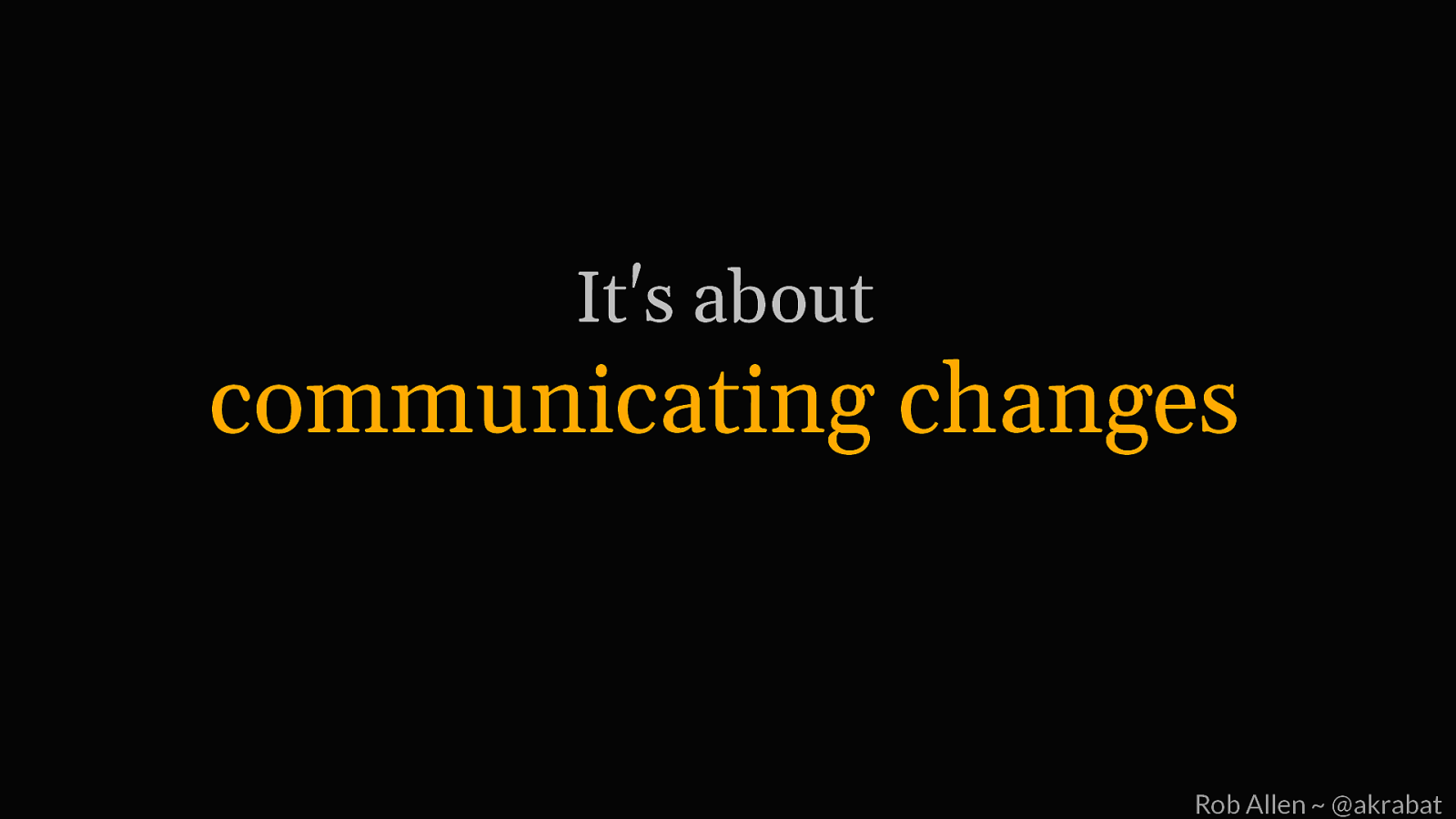
It’s about communicating changes Rob Allen ~ @akrabat
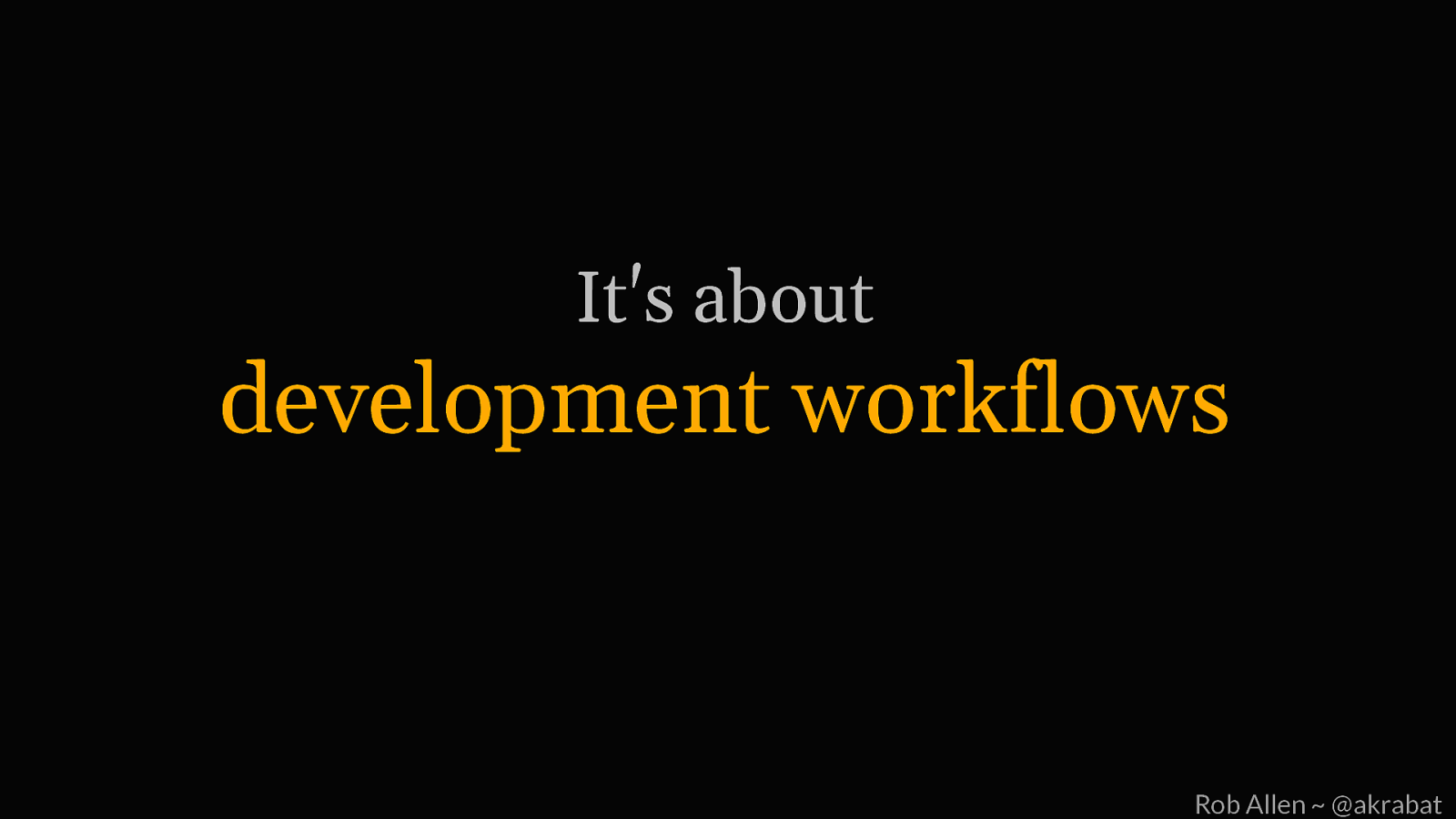
It’s about development workflows Rob Allen ~ @akrabat
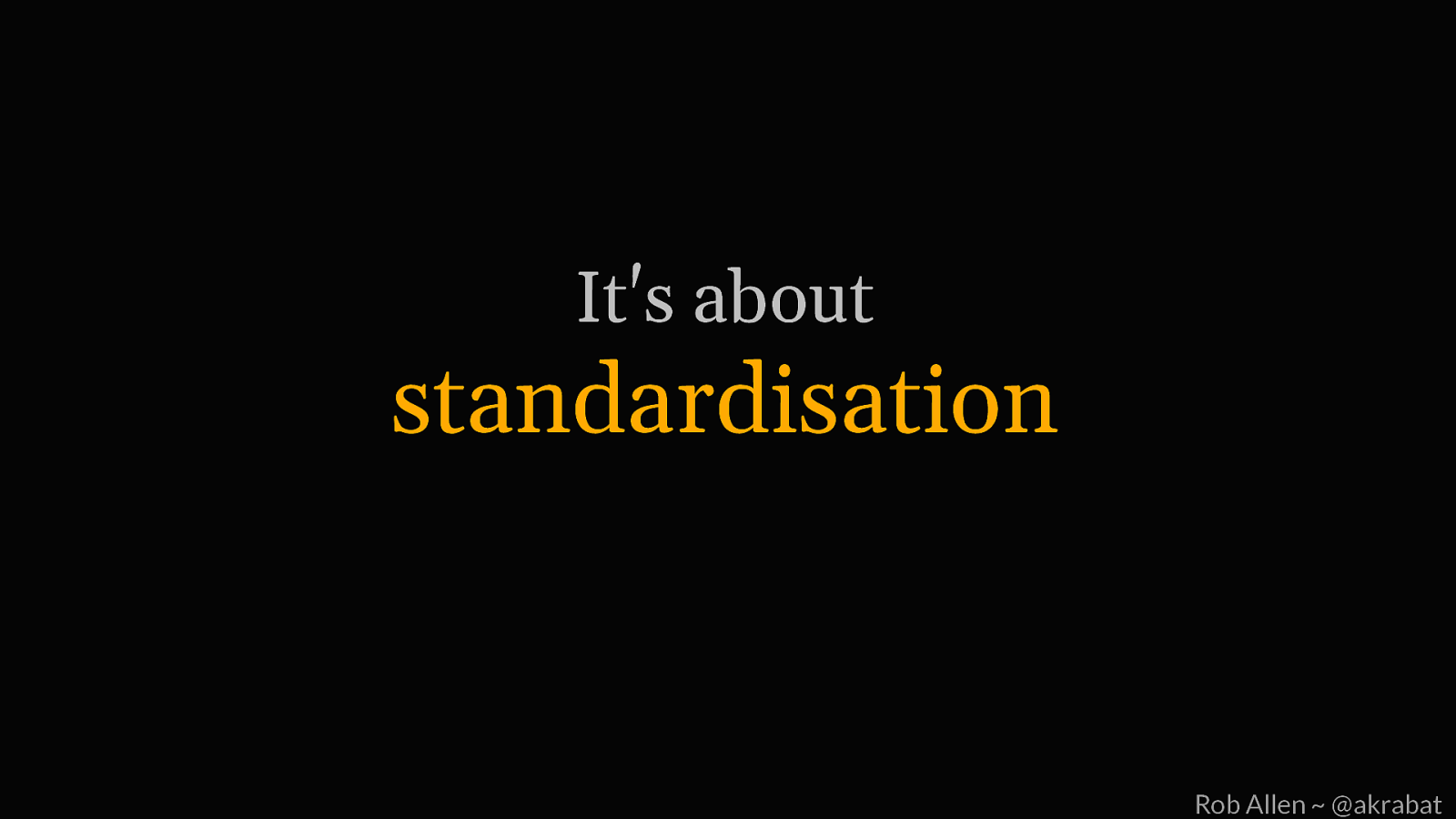
It’s about standardisation Rob Allen ~ @akrabat

It’s about a contract Rob Allen ~ @akrabat

“Using a consistent API description will help increase adoption of APIs across government by reducing time spent in understanding different APIs. gov.uk Rob Allen ~ @akrabat

Anatomy of the specification Rob Allen ~ @akrabat
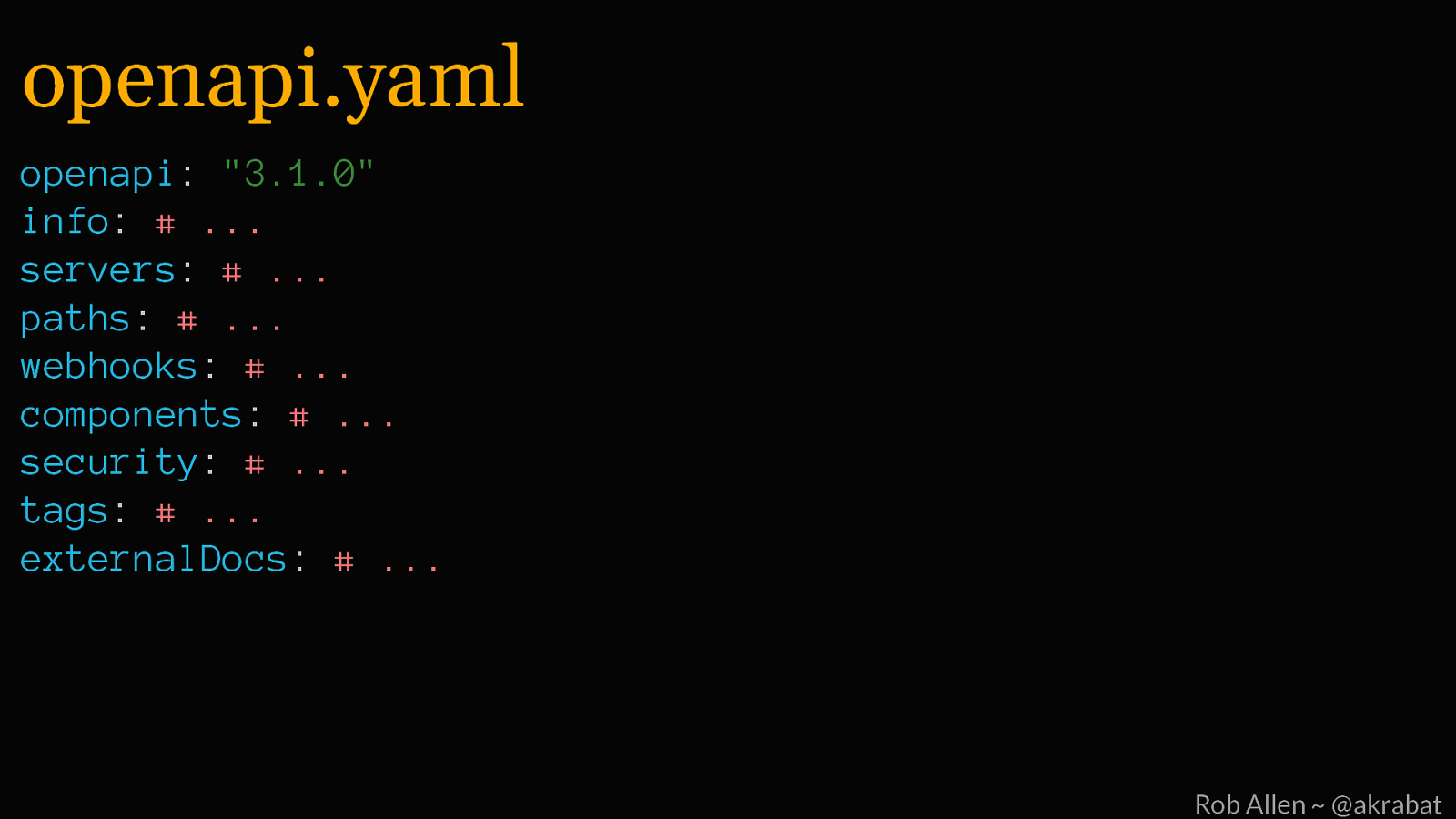
openapi.yaml openapi: “3.1.0” info: # … servers: # … paths: # … webhooks: # … components: # … security: # … tags: # … externalDocs: # … Rob Allen ~ @akrabat
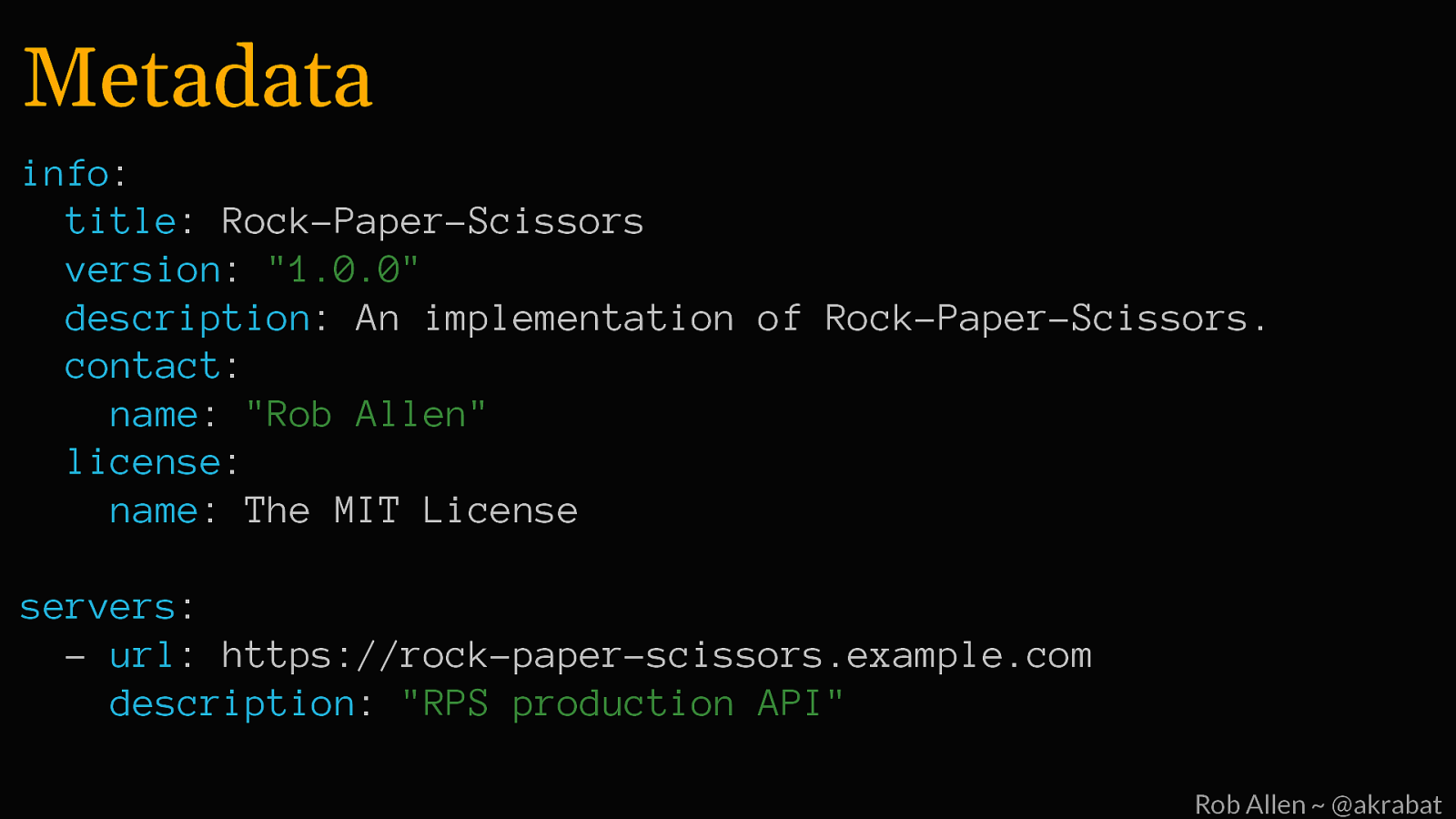
Metadata info: title: Rock-Paper-Scissors version: “1.0.0” description: An implementation of Rock-Paper-Scissors. contact: name: “Rob Allen” license: name: The MIT License servers: - url: https://rock-paper-scissors.example.com description: “RPS production API” Rob Allen ~ @akrabat

Endpoints paths: ‘/games’: get: # … post: # … ‘/games/{game_id}/moves’: post: # … ‘/games/{game_id}/judgement’: get: # … Rob Allen ~ @akrabat
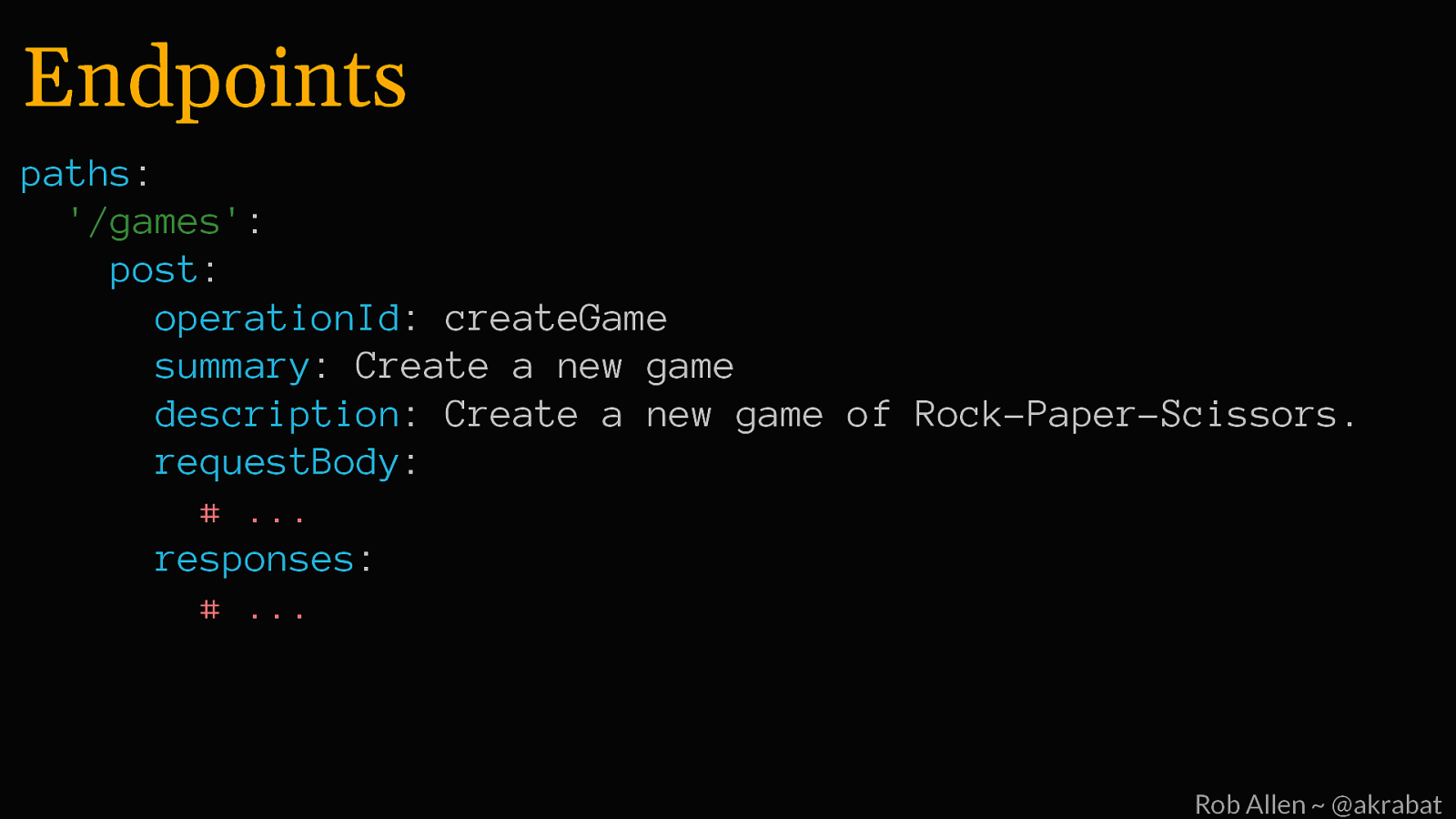
Endpoints paths: ‘/games’: post: operationId: createGame summary: Create a new game description: Create a new game of Rock-Paper-Scissors. requestBody: # … responses: # … Rob Allen ~ @akrabat
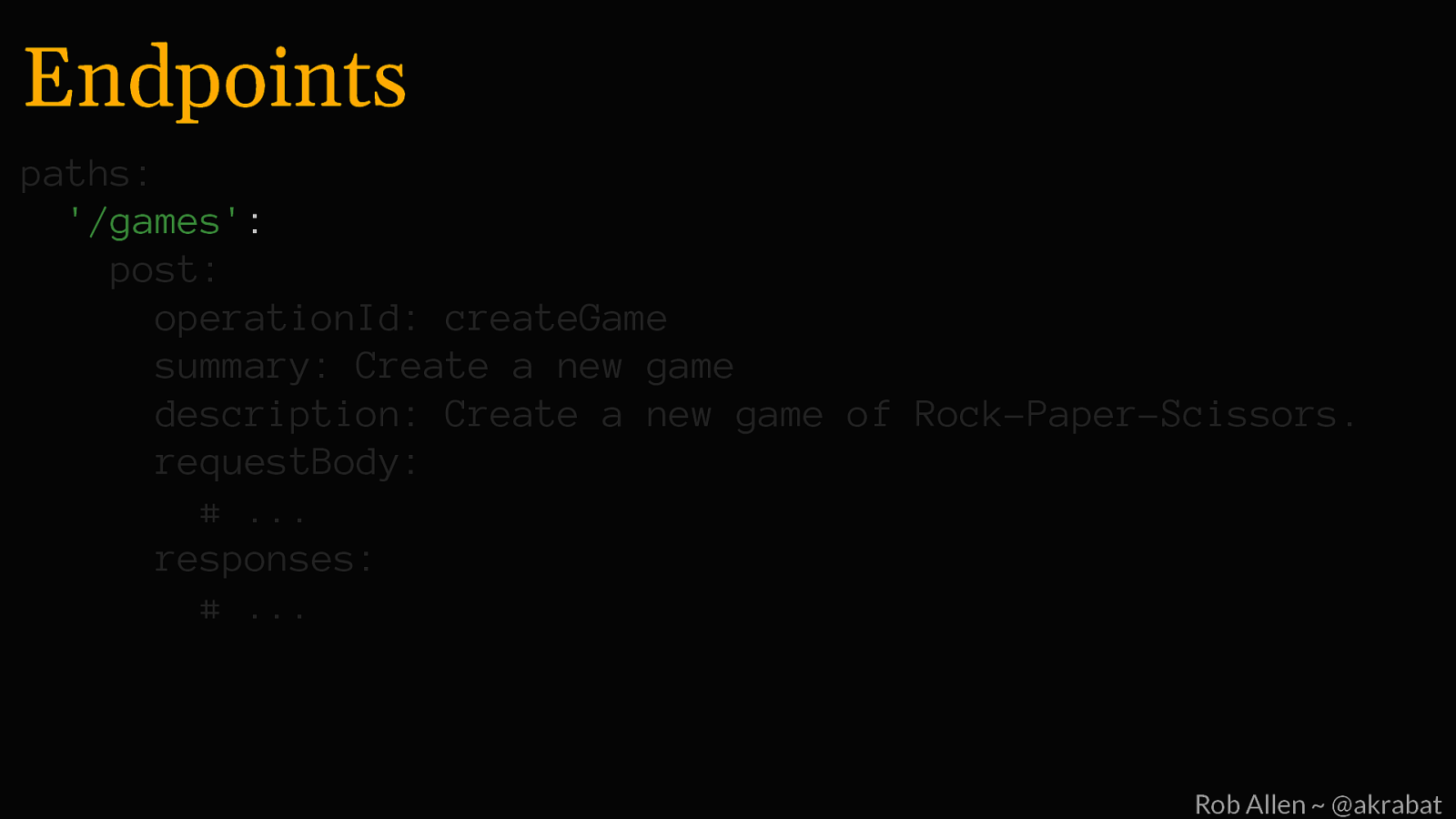
Endpoints paths: ‘/games’: post: operationId: createGame summary: Create a new game description: Create a new game of Rock-Paper-Scissors. requestBody: # … responses: # … Rob Allen ~ @akrabat
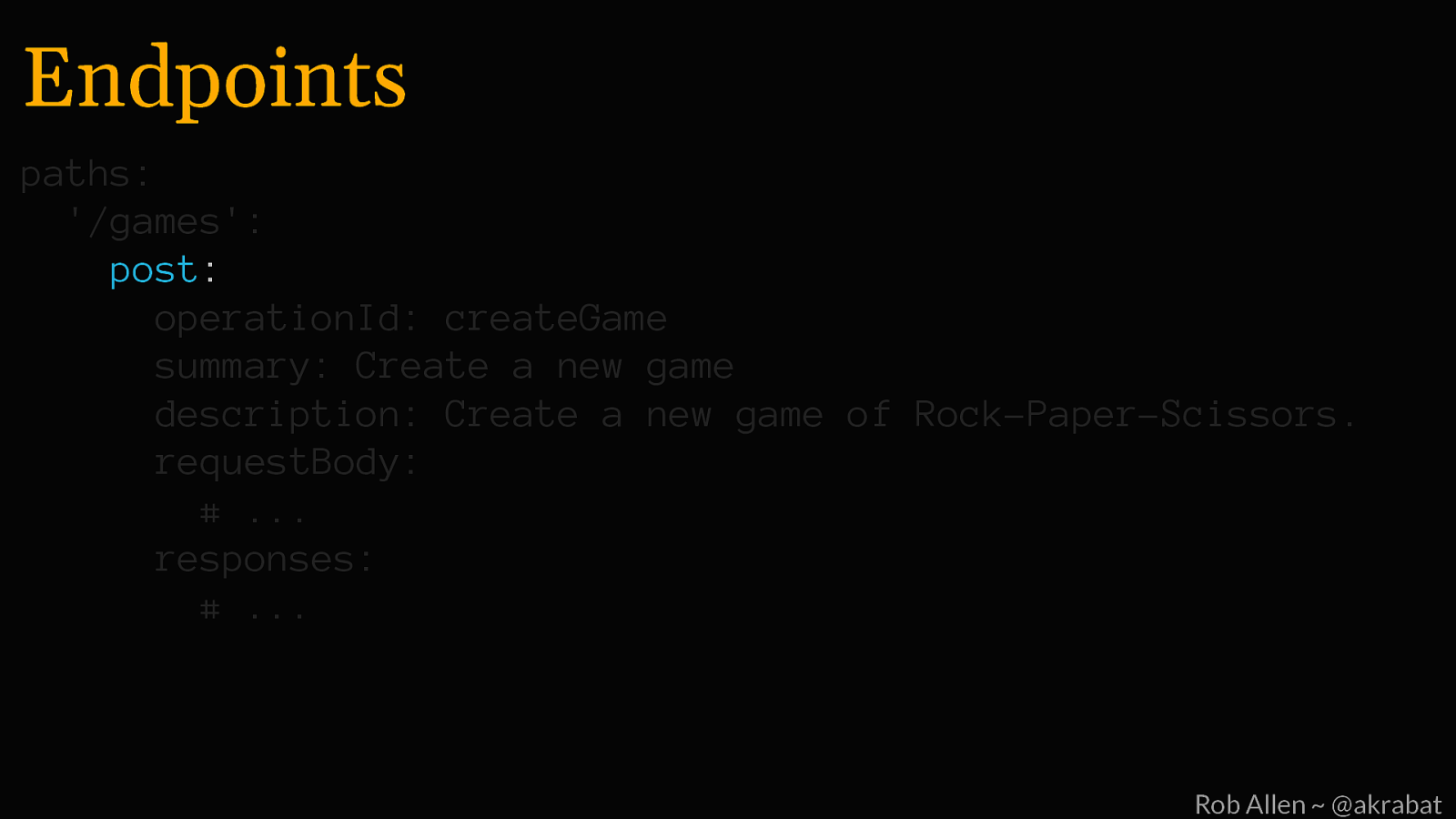
Endpoints paths: ‘/games’: post: operationId: createGame summary: Create a new game description: Create a new game of Rock-Paper-Scissors. requestBody: # … responses: # … Rob Allen ~ @akrabat
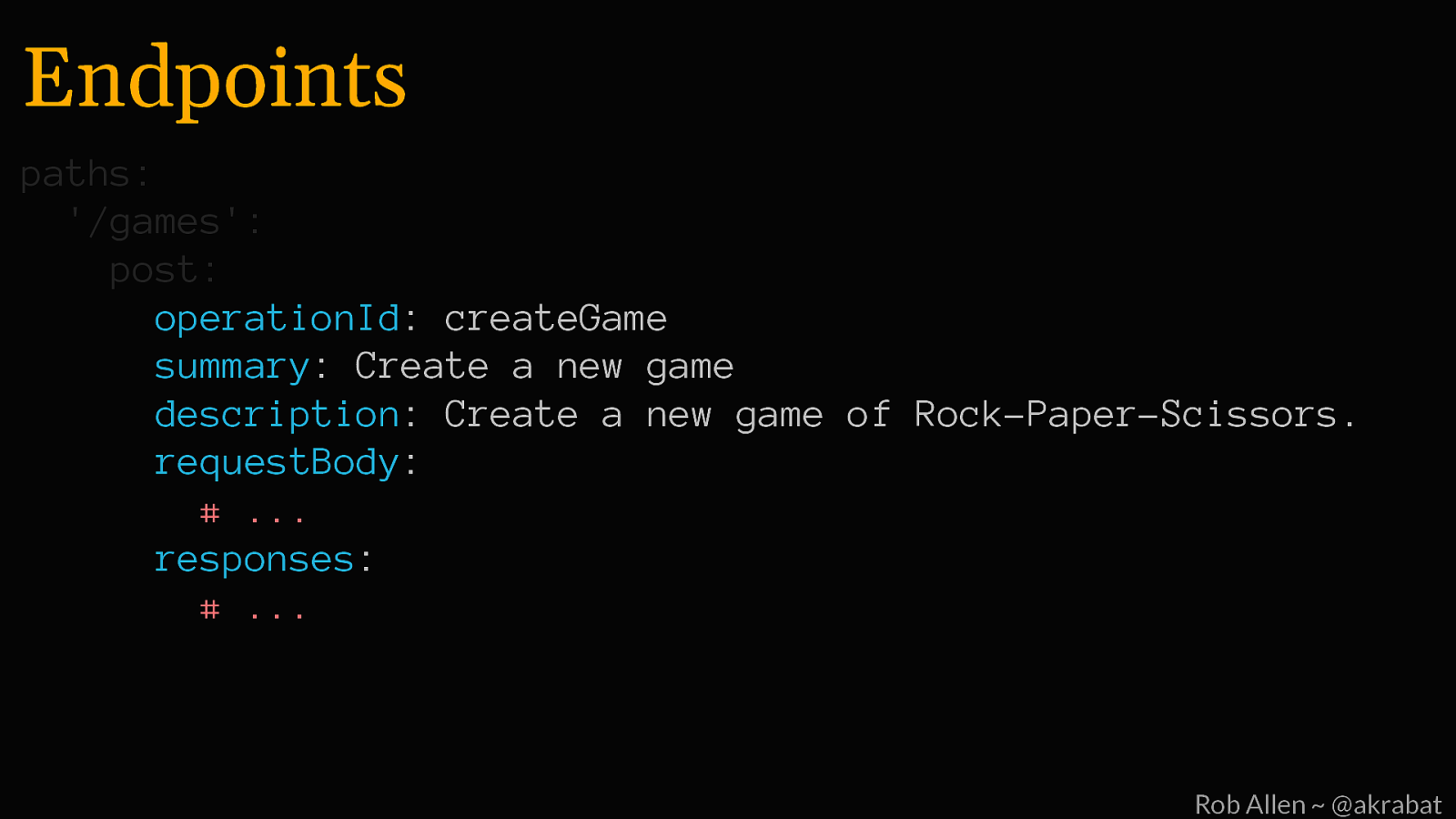
Endpoints paths: ‘/games’: post: operationId: createGame summary: Create a new game description: Create a new game of Rock-Paper-Scissors. requestBody: # … responses: # … Rob Allen ~ @akrabat
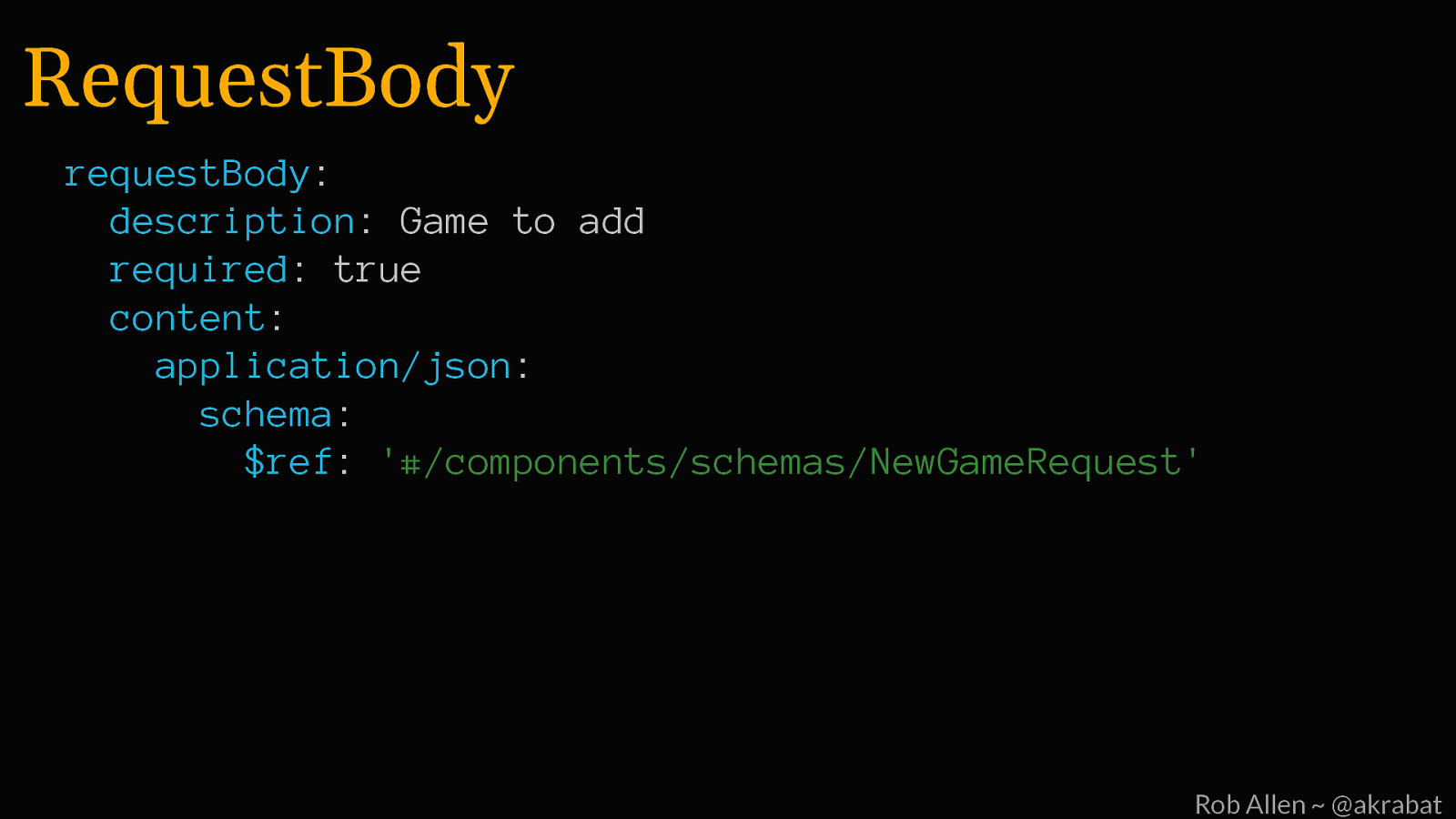
RequestBody requestBody: description: Game to add required: true content: application/json: schema: $ref: ‘#/components/schemas/NewGameRequest’ Rob Allen ~ @akrabat
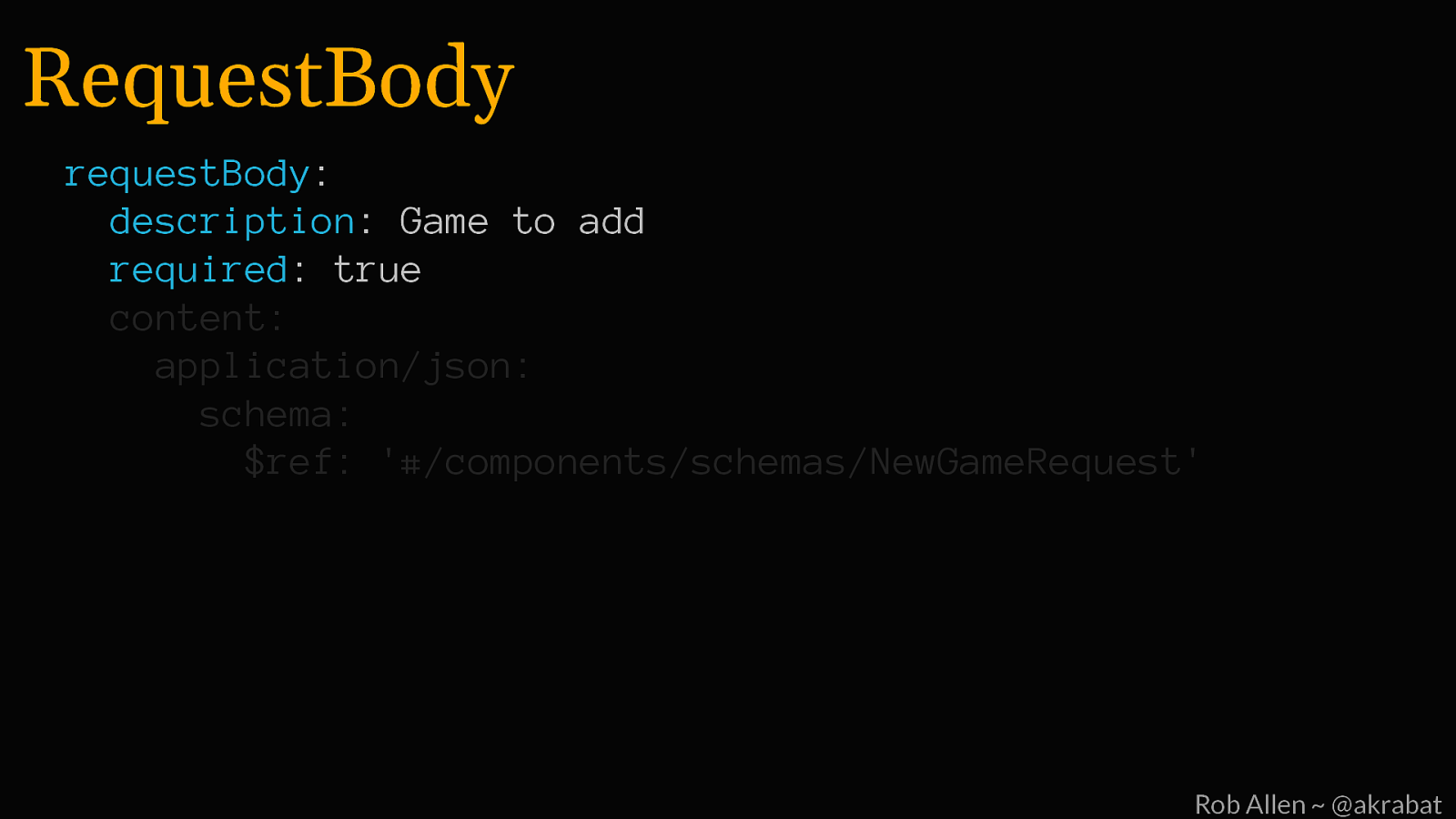
RequestBody requestBody: description: Game to add required: true content: application/json: schema: $ref: ‘#/components/schemas/NewGameRequest’ Rob Allen ~ @akrabat
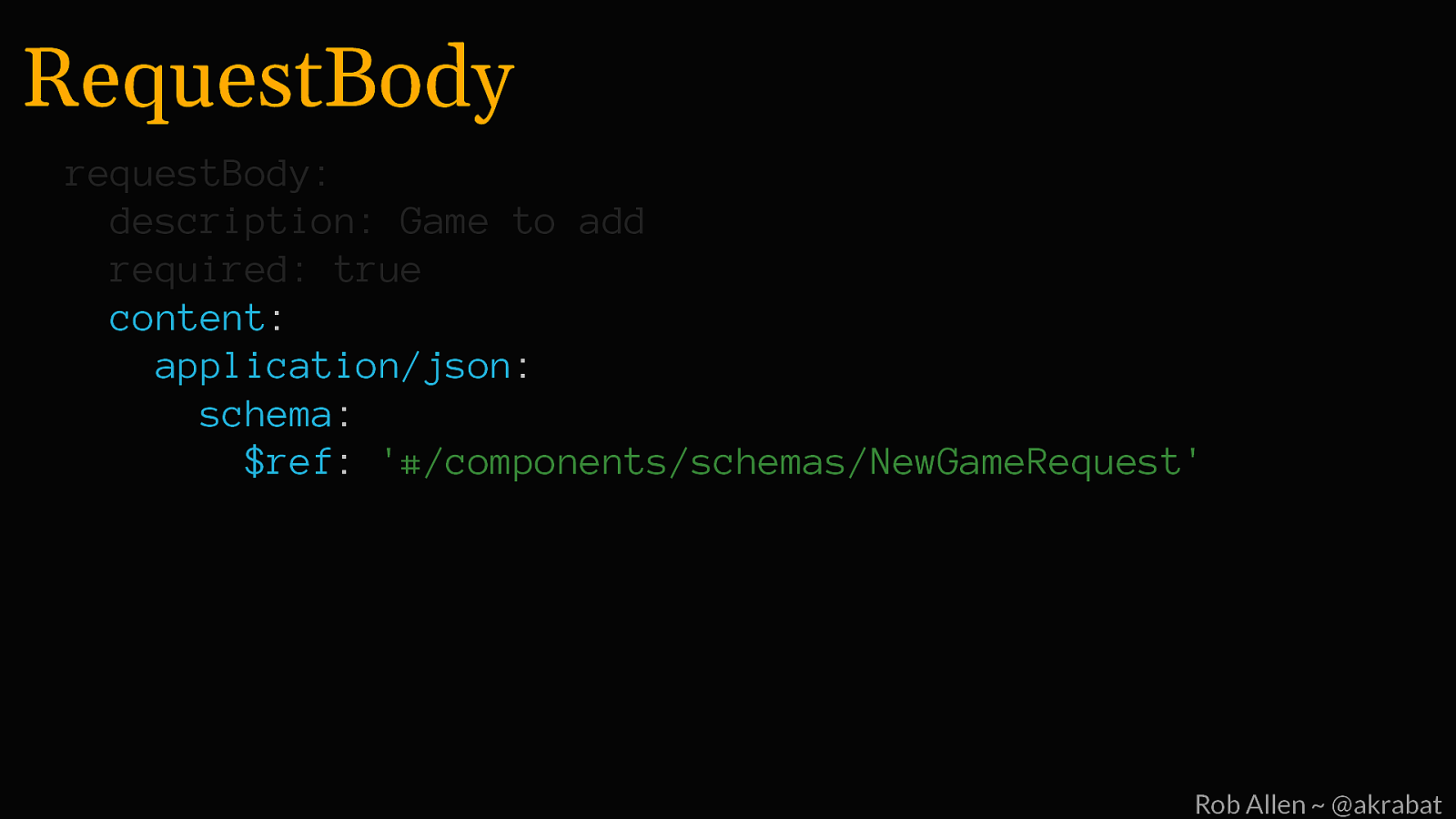
RequestBody requestBody: description: Game to add required: true content: application/json: schema: $ref: ‘#/components/schemas/NewGameRequest’ Rob Allen ~ @akrabat
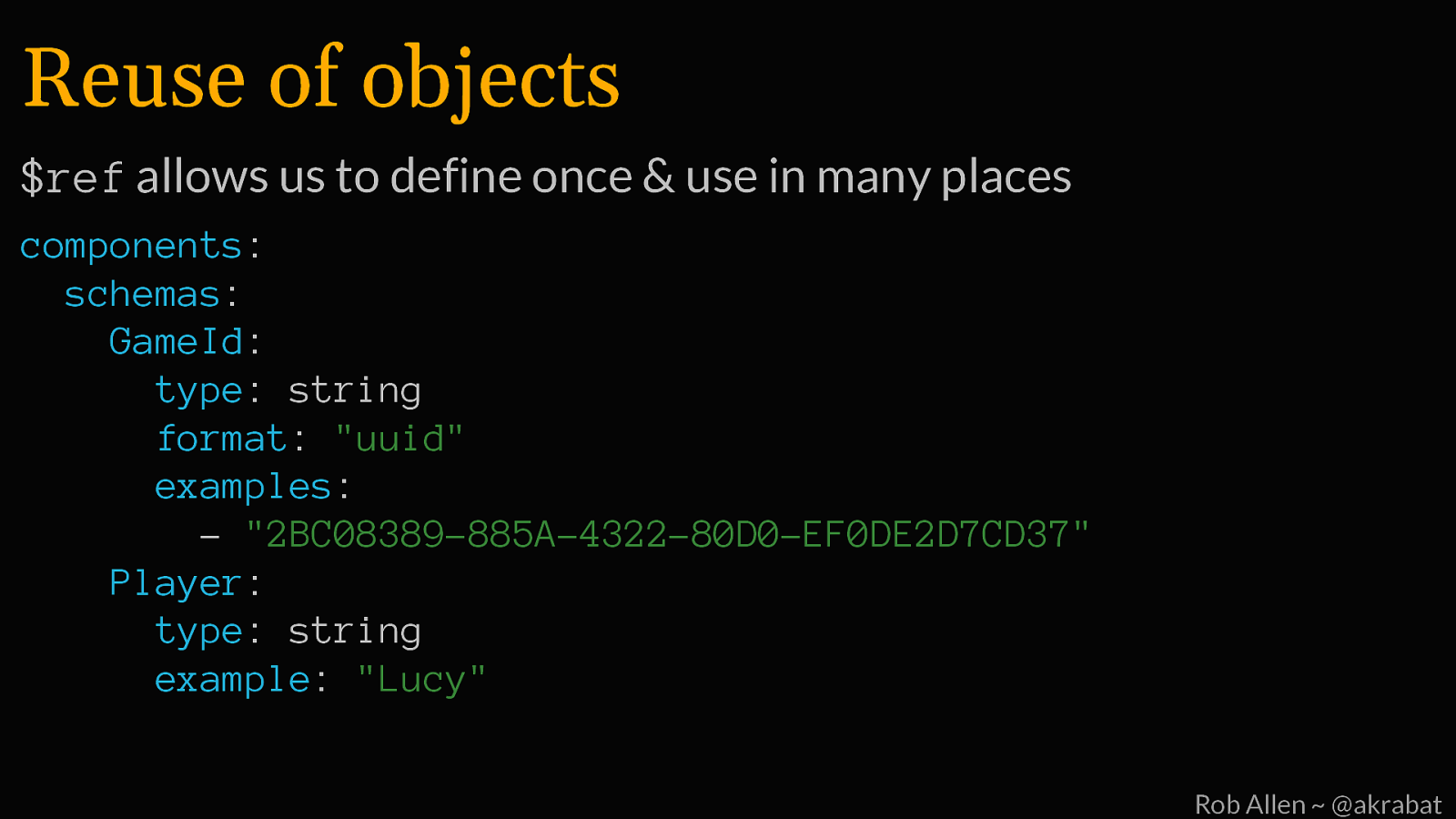
Reuse of objects $ref allows us to define once & use in many places components: schemas: GameId: type: string format: “uuid” examples: - “2BC08389-885A-4322-80D0-EF0DE2D7CD37” Player: type: string example: “Lucy” Rob Allen ~ @akrabat
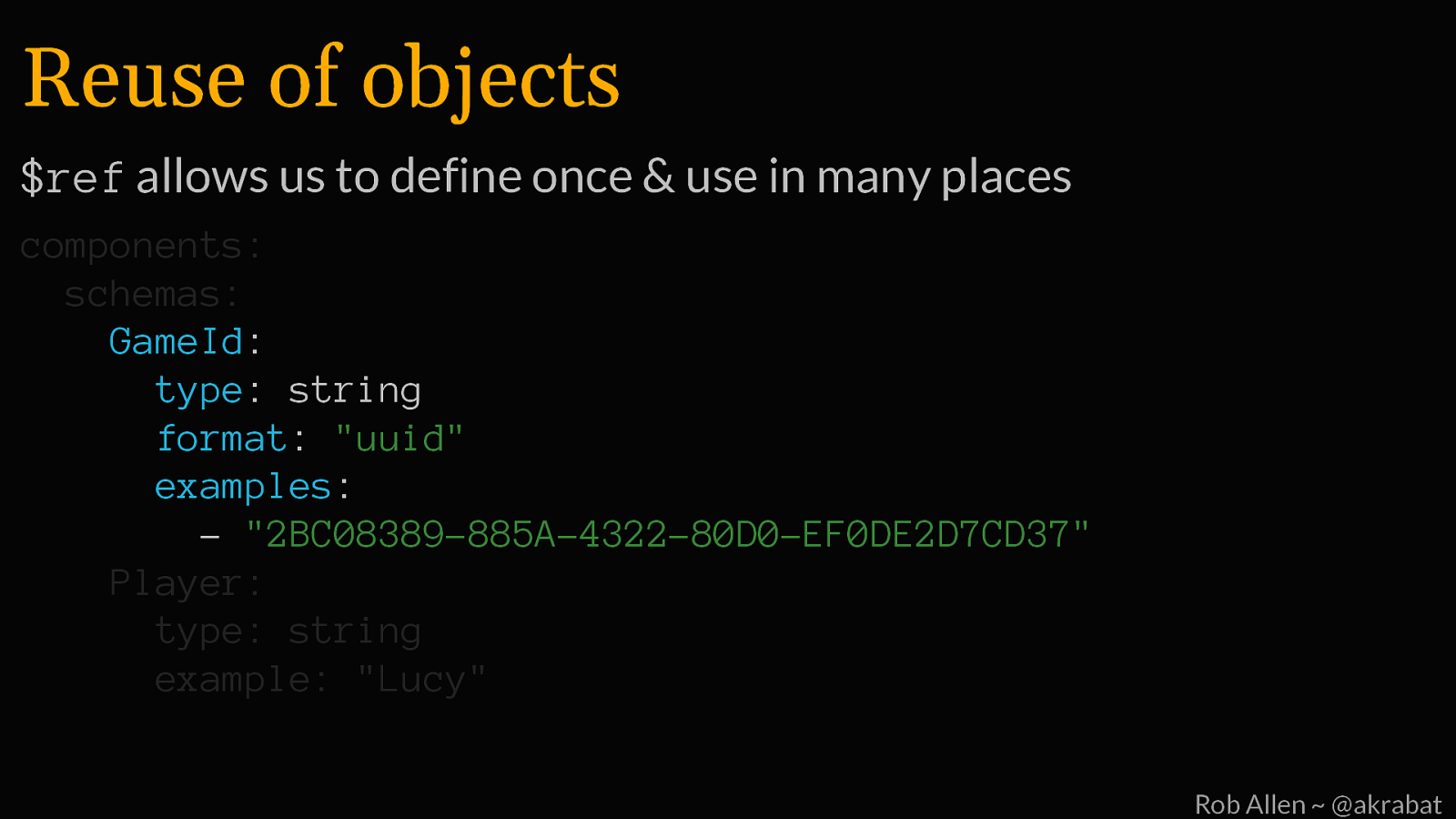
Reuse of objects $ref allows us to define once & use in many places components: schemas: GameId: type: string format: “uuid” examples: - “2BC08389-885A-4322-80D0-EF0DE2D7CD37” Player: type: string example: “Lucy” Rob Allen ~ @akrabat
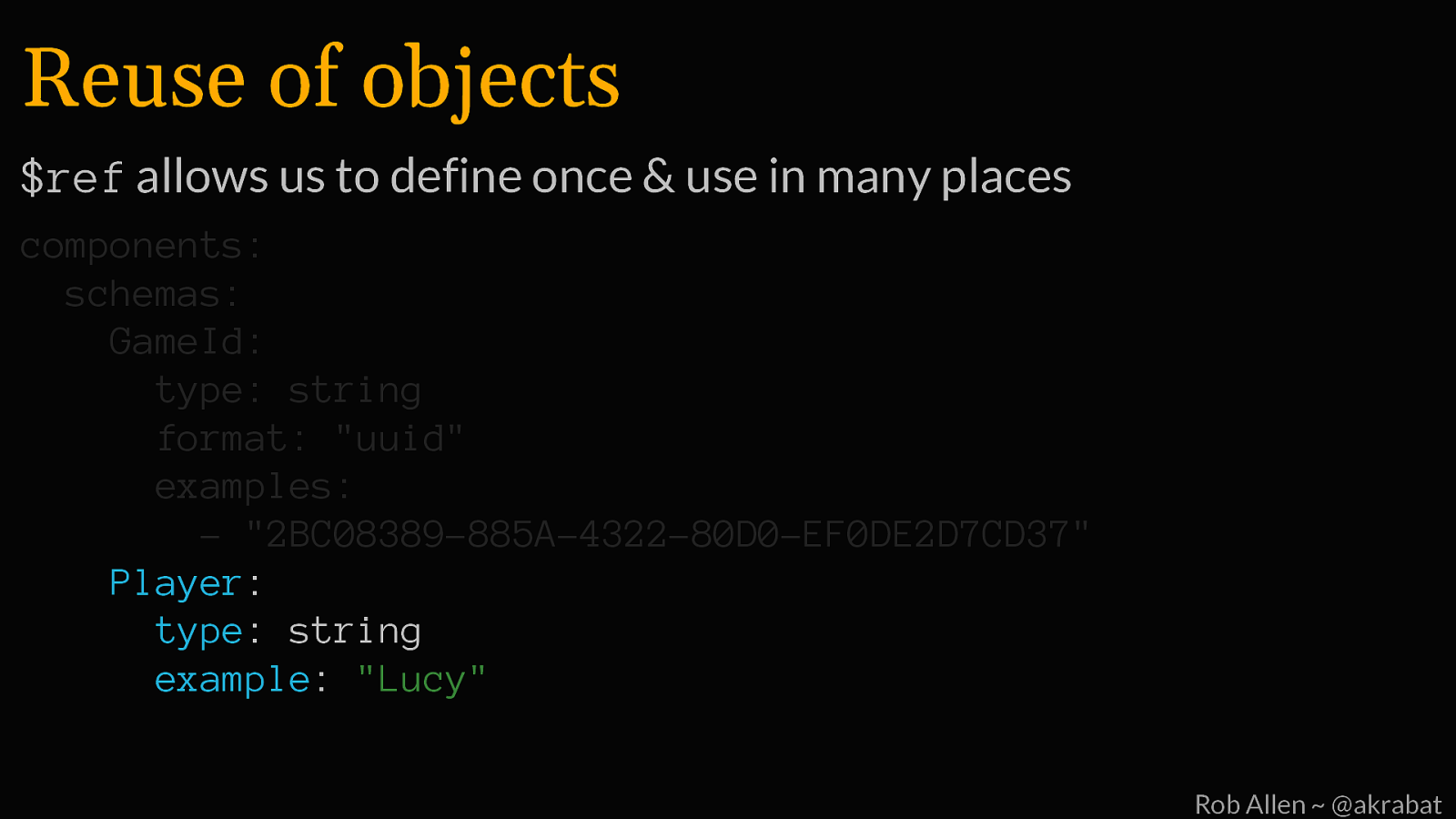
Reuse of objects $ref allows us to define once & use in many places components: schemas: GameId: type: string format: “uuid” examples: - “2BC08389-885A-4322-80D0-EF0DE2D7CD37” Player: type: string example: “Lucy” Rob Allen ~ @akrabat
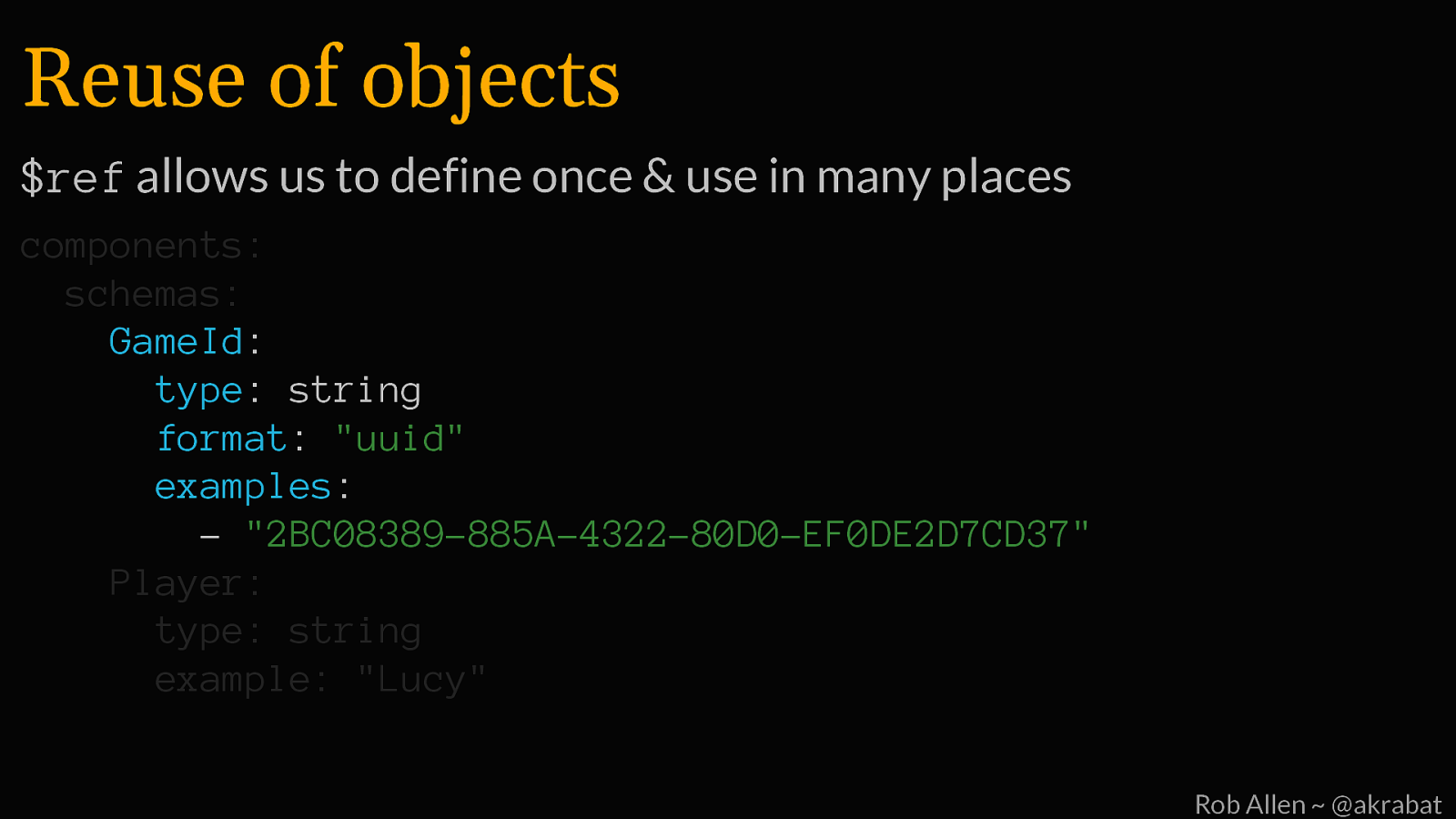
Reuse of objects $ref allows us to define once & use in many places components: schemas: GameId: type: string format: “uuid” examples: - “2BC08389-885A-4322-80D0-EF0DE2D7CD37” Player: type: string example: “Lucy” Rob Allen ~ @akrabat
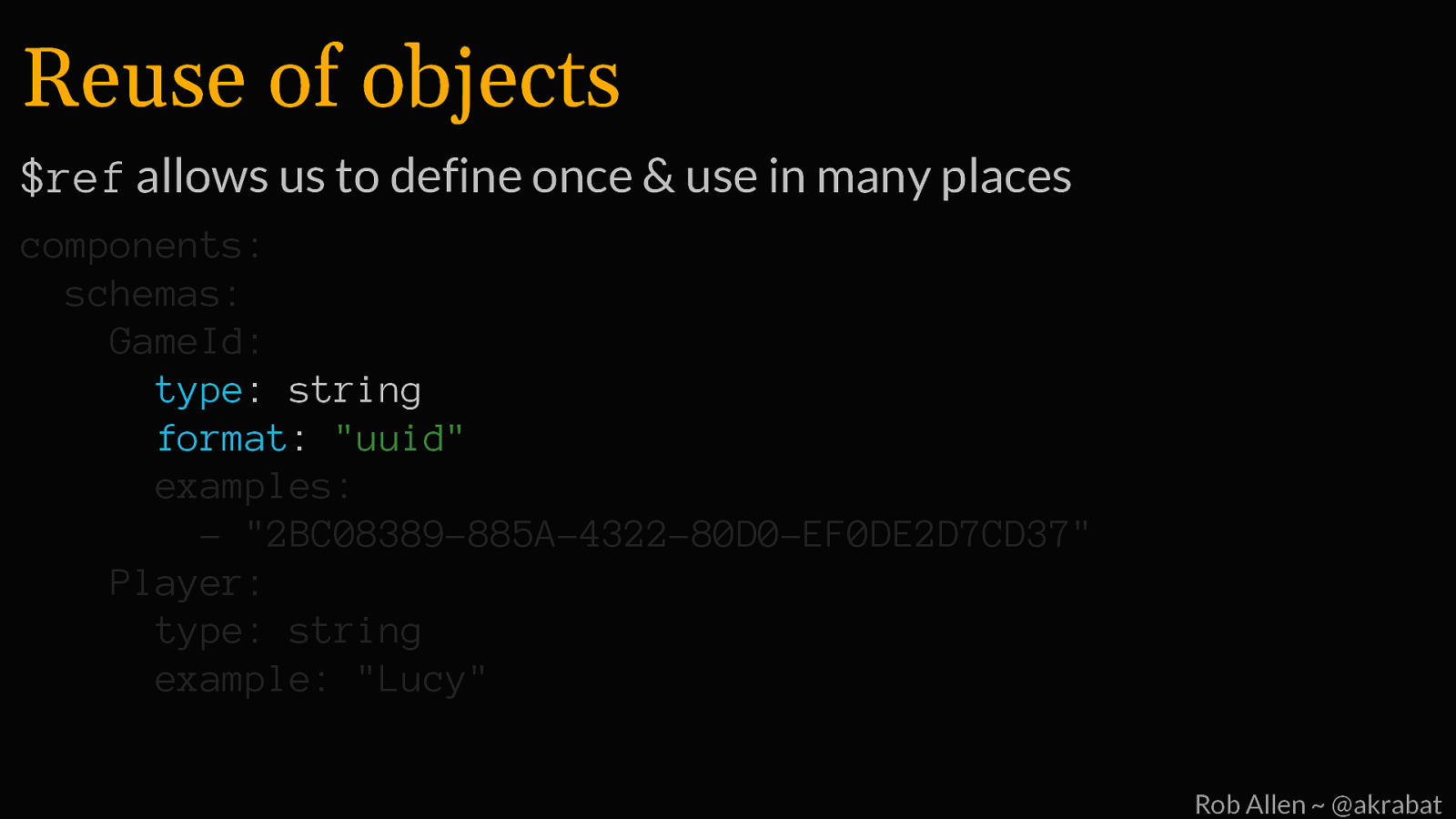
Reuse of objects $ref allows us to define once & use in many places components: schemas: GameId: type: string format: “uuid” examples: - “2BC08389-885A-4322-80D0-EF0DE2D7CD37” Player: type: string example: “Lucy” Rob Allen ~ @akrabat
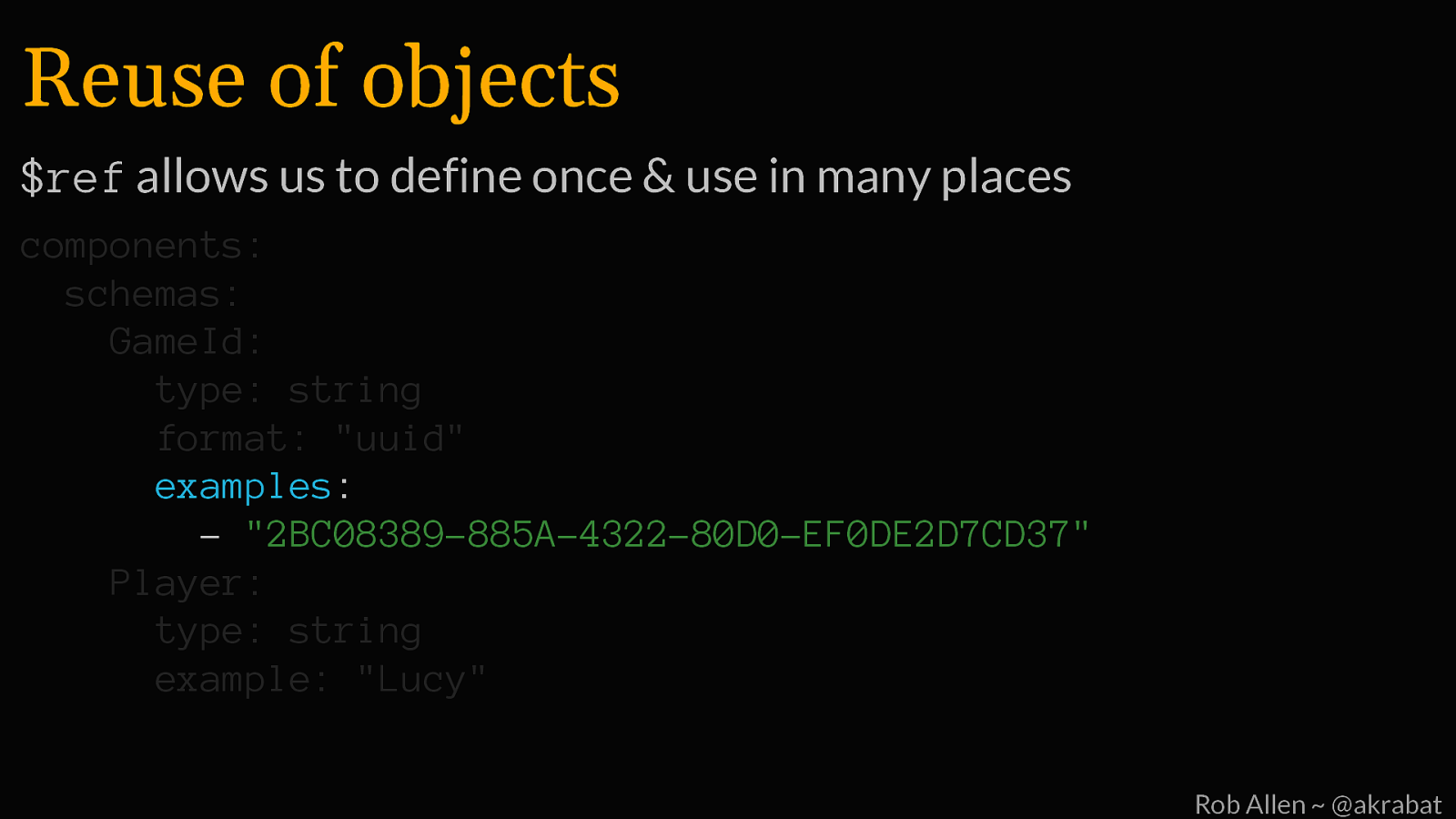
Reuse of objects $ref allows us to define once & use in many places components: schemas: GameId: type: string format: “uuid” examples: - “2BC08389-885A-4322-80D0-EF0DE2D7CD37” Player: type: string example: “Lucy” Rob Allen ~ @akrabat
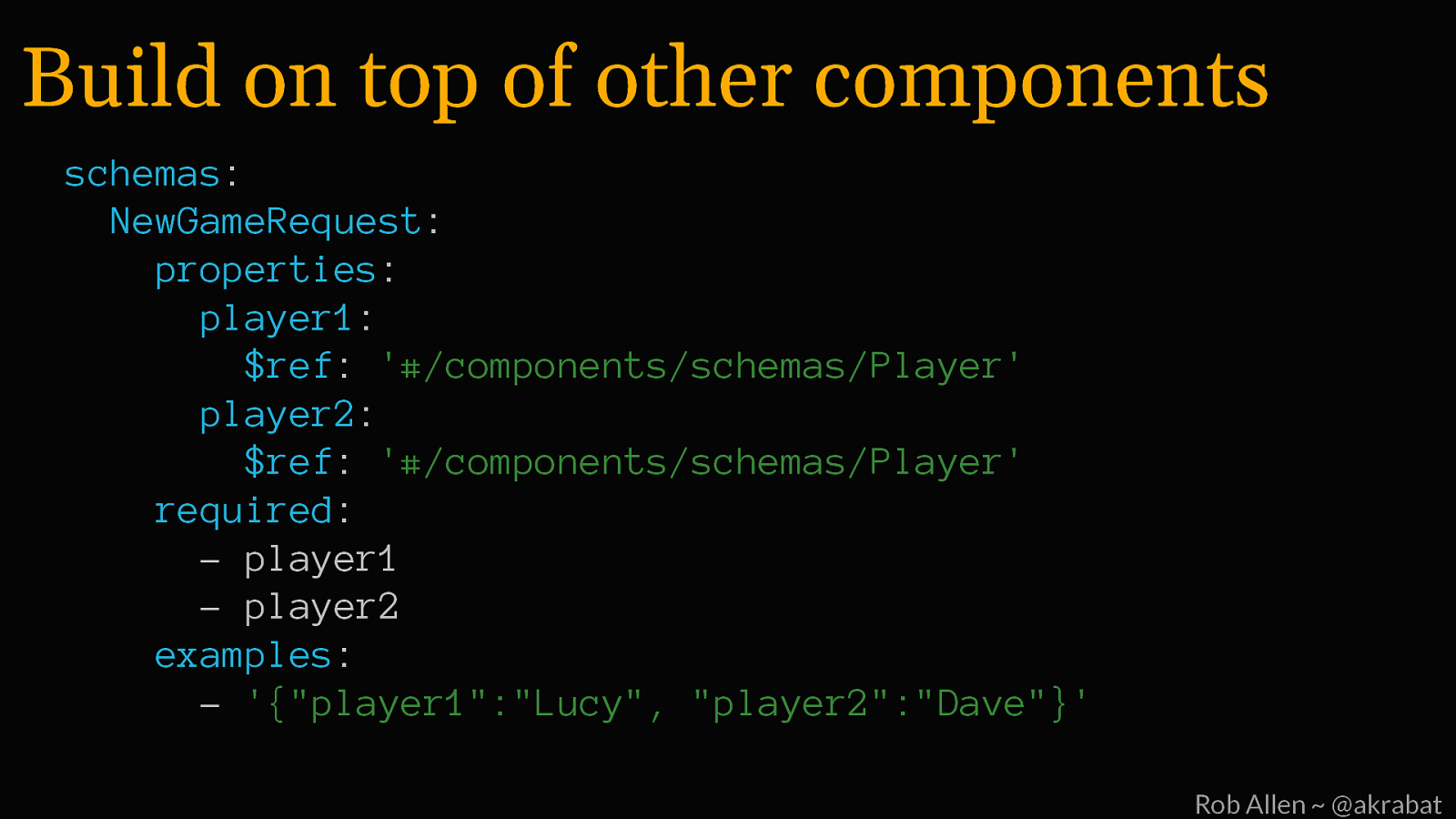
Build on top of other components schemas: NewGameRequest: properties: player1: $ref: ‘#/components/schemas/Player’ player2: $ref: ‘#/components/schemas/Player’ required: - player1 - player2 examples: - ‘{“player1”:”Lucy”, “player2”:”Dave”}’ Rob Allen ~ @akrabat
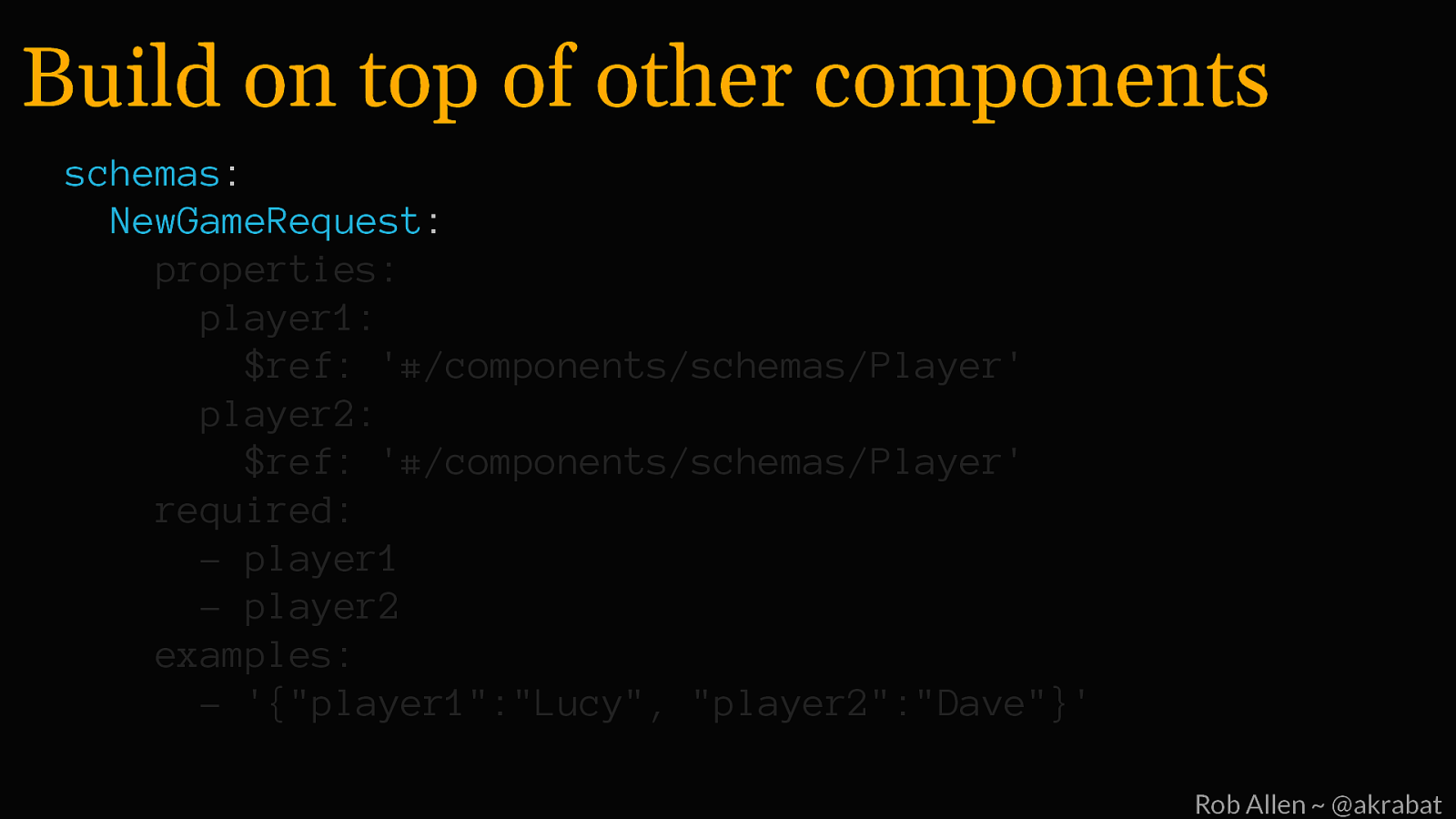
Build on top of other components schemas: NewGameRequest: properties: player1: $ref: ‘#/components/schemas/Player’ player2: $ref: ‘#/components/schemas/Player’ required: - player1 - player2 examples: - ‘{“player1”:”Lucy”, “player2”:”Dave”}’ Rob Allen ~ @akrabat
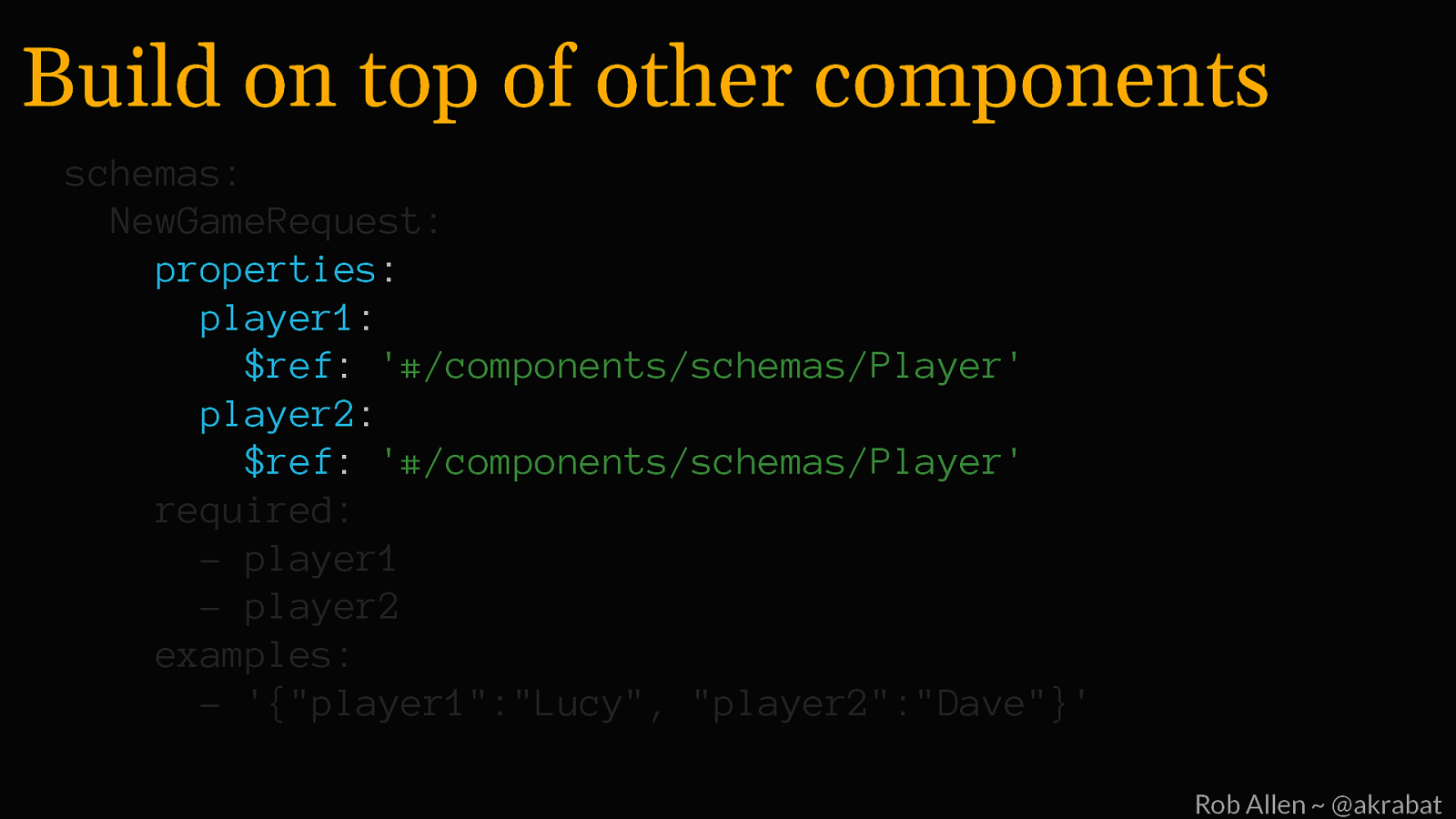
Build on top of other components schemas: NewGameRequest: properties: player1: $ref: ‘#/components/schemas/Player’ player2: $ref: ‘#/components/schemas/Player’ required: - player1 - player2 examples: - ‘{“player1”:”Lucy”, “player2”:”Dave”}’ Rob Allen ~ @akrabat
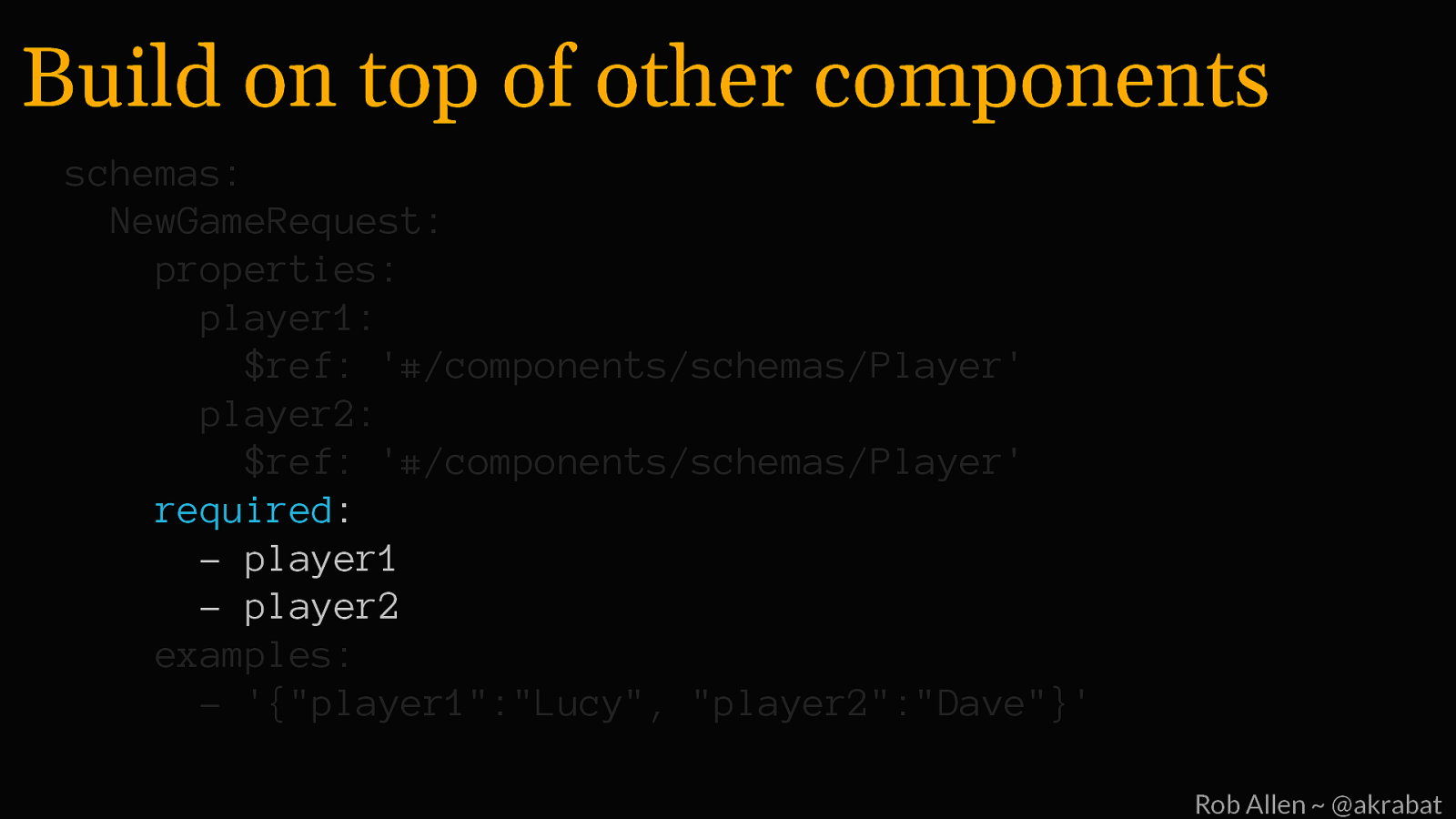
Build on top of other components schemas: NewGameRequest: properties: player1: $ref: ‘#/components/schemas/Player’ player2: $ref: ‘#/components/schemas/Player’ required: - player1 - player2 examples: - ‘{“player1”:”Lucy”, “player2”:”Dave”}’ Rob Allen ~ @akrabat
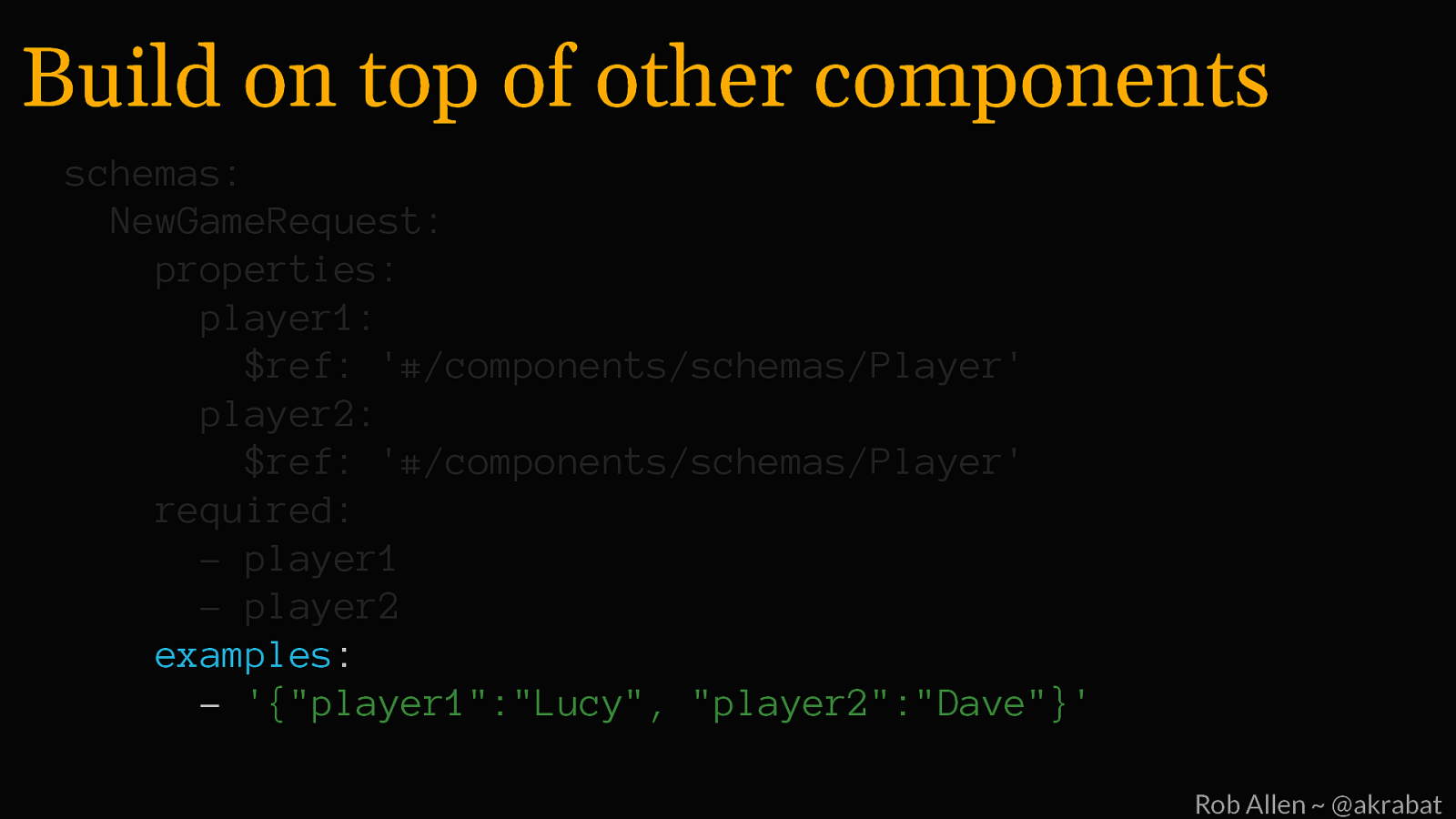
Build on top of other components schemas: NewGameRequest: properties: player1: $ref: ‘#/components/schemas/Player’ player2: $ref: ‘#/components/schemas/Player’ required: - player1 - player2 examples: - ‘{“player1”:”Lucy”, “player2”:”Dave”}’ Rob Allen ~ @akrabat
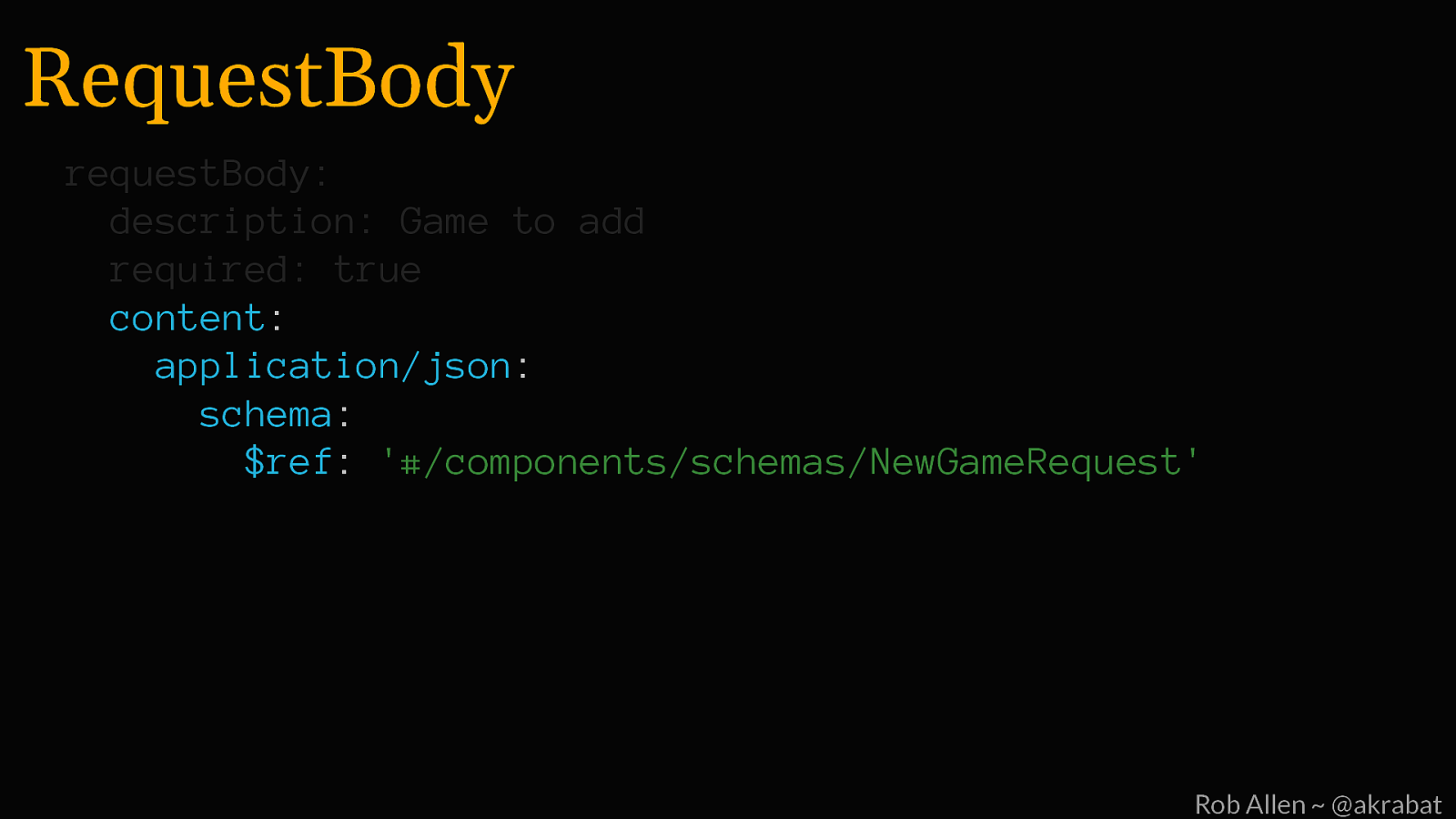
RequestBody requestBody: description: Game to add required: true content: application/json: schema: $ref: ‘#/components/schemas/NewGameRequest’ Rob Allen ~ @akrabat
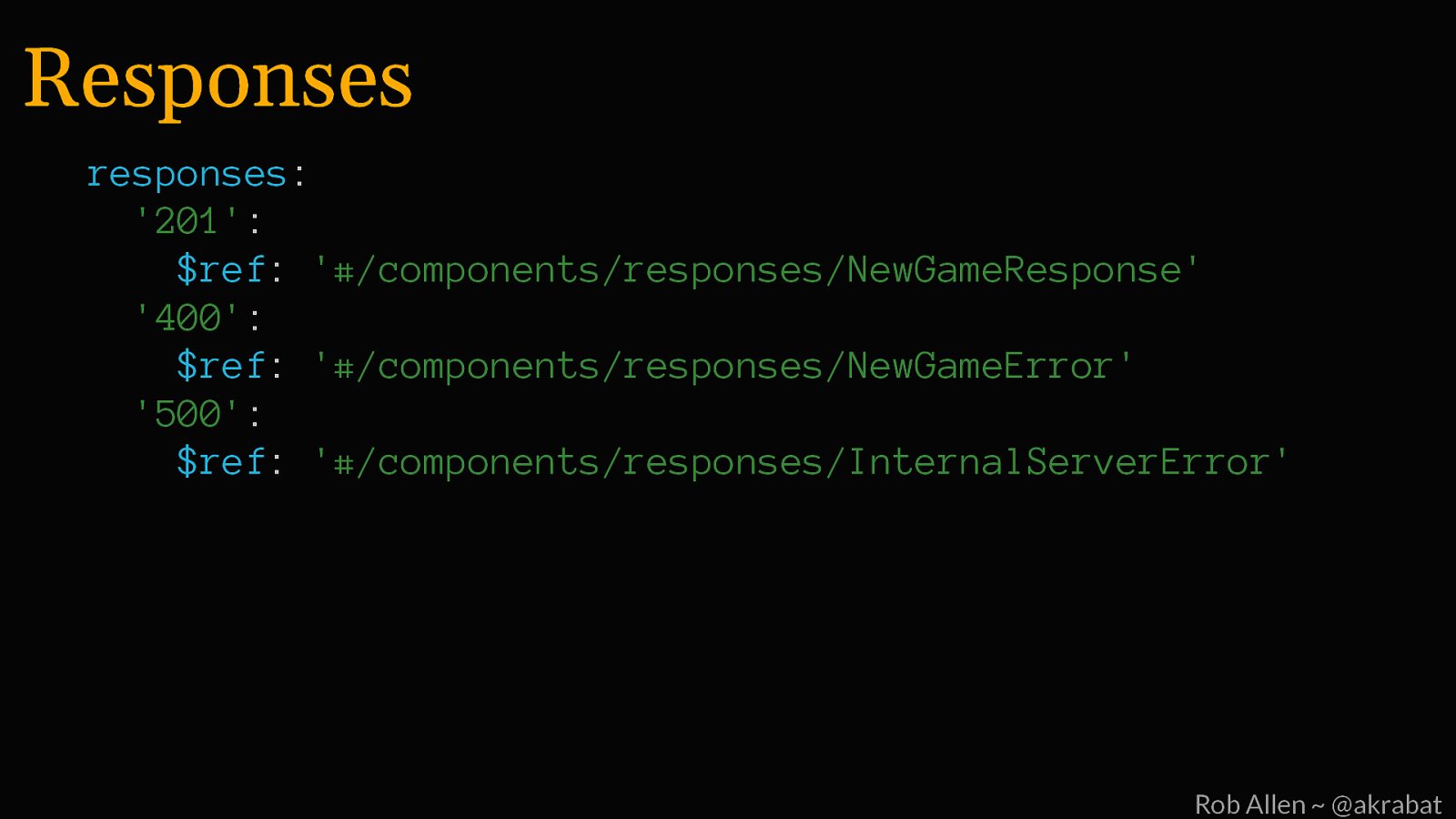
Responses responses: ‘201’: $ref: ‘#/components/responses/NewGameResponse’ ‘400’: $ref: ‘#/components/responses/NewGameError’ ‘500’: $ref: ‘#/components/responses/InternalServerError’ Rob Allen ~ @akrabat
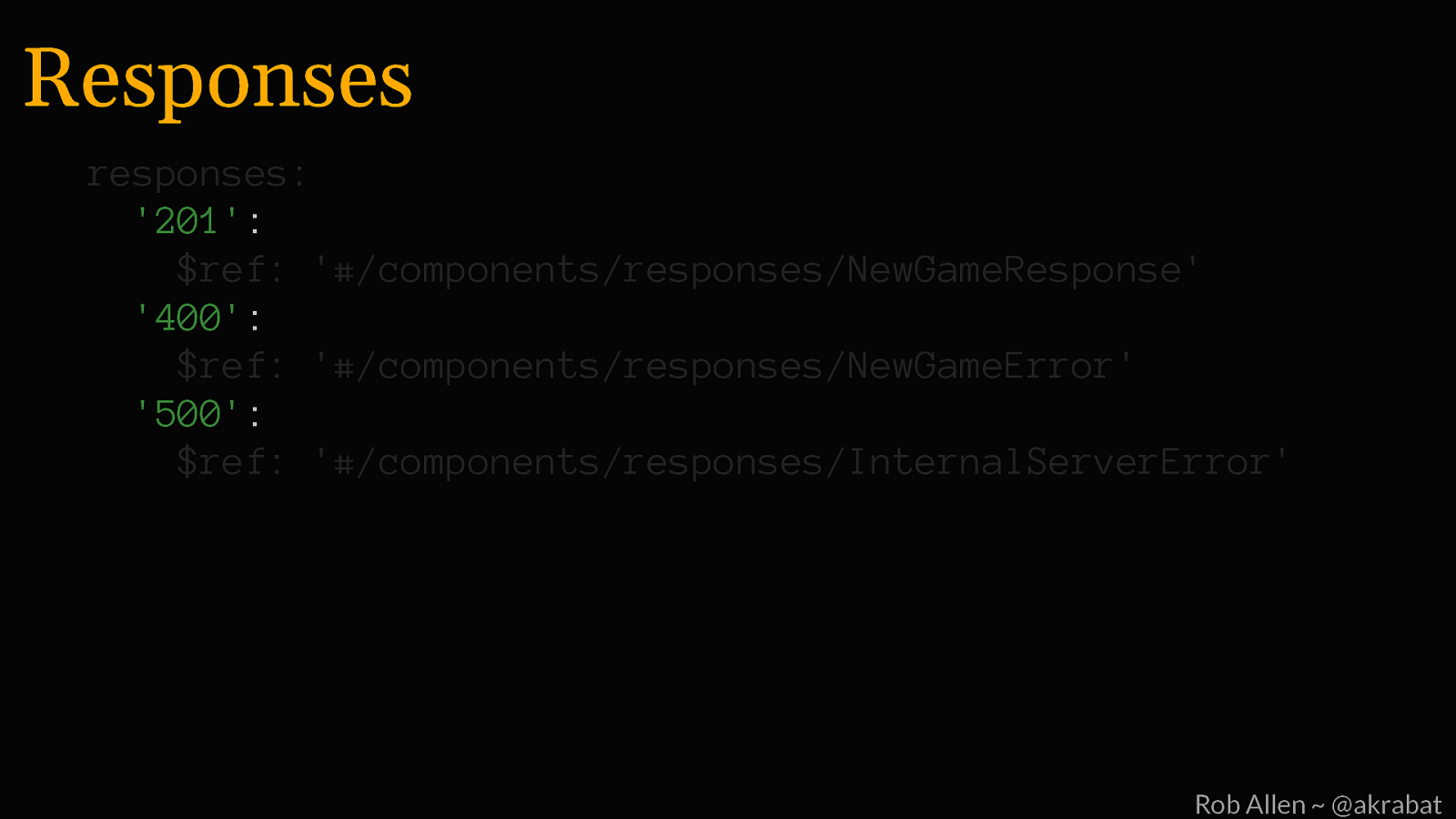
Responses responses: ‘201’: $ref: ‘#/components/responses/NewGameResponse’ ‘400’: $ref: ‘#/components/responses/NewGameError’ ‘500’: $ref: ‘#/components/responses/InternalServerError’ Rob Allen ~ @akrabat
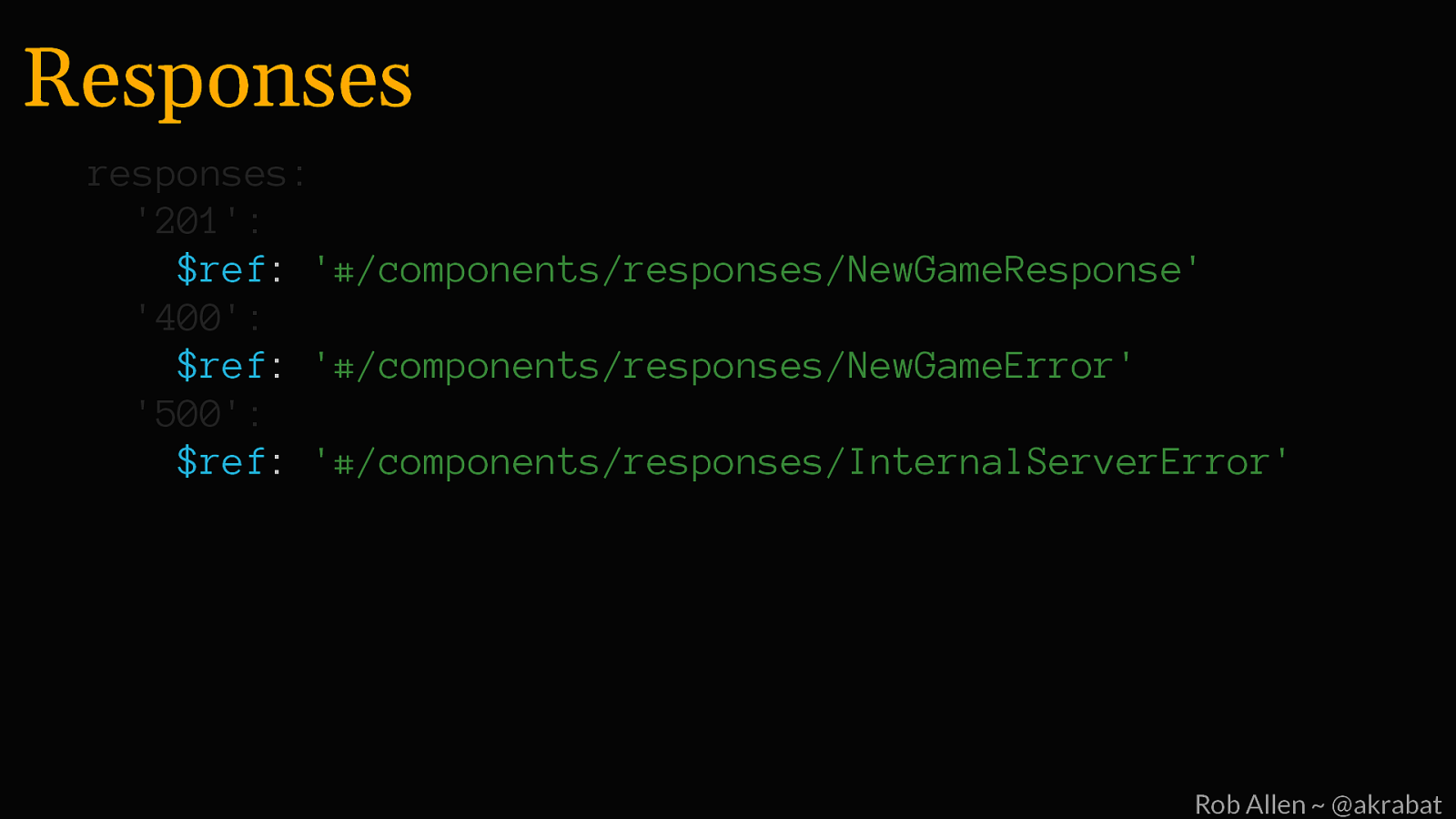
Responses responses: ‘201’: $ref: ‘#/components/responses/NewGameResponse’ ‘400’: $ref: ‘#/components/responses/NewGameError’ ‘500’: $ref: ‘#/components/responses/InternalServerError’ Rob Allen ~ @akrabat

Writing your spec Rob Allen ~ @akrabat
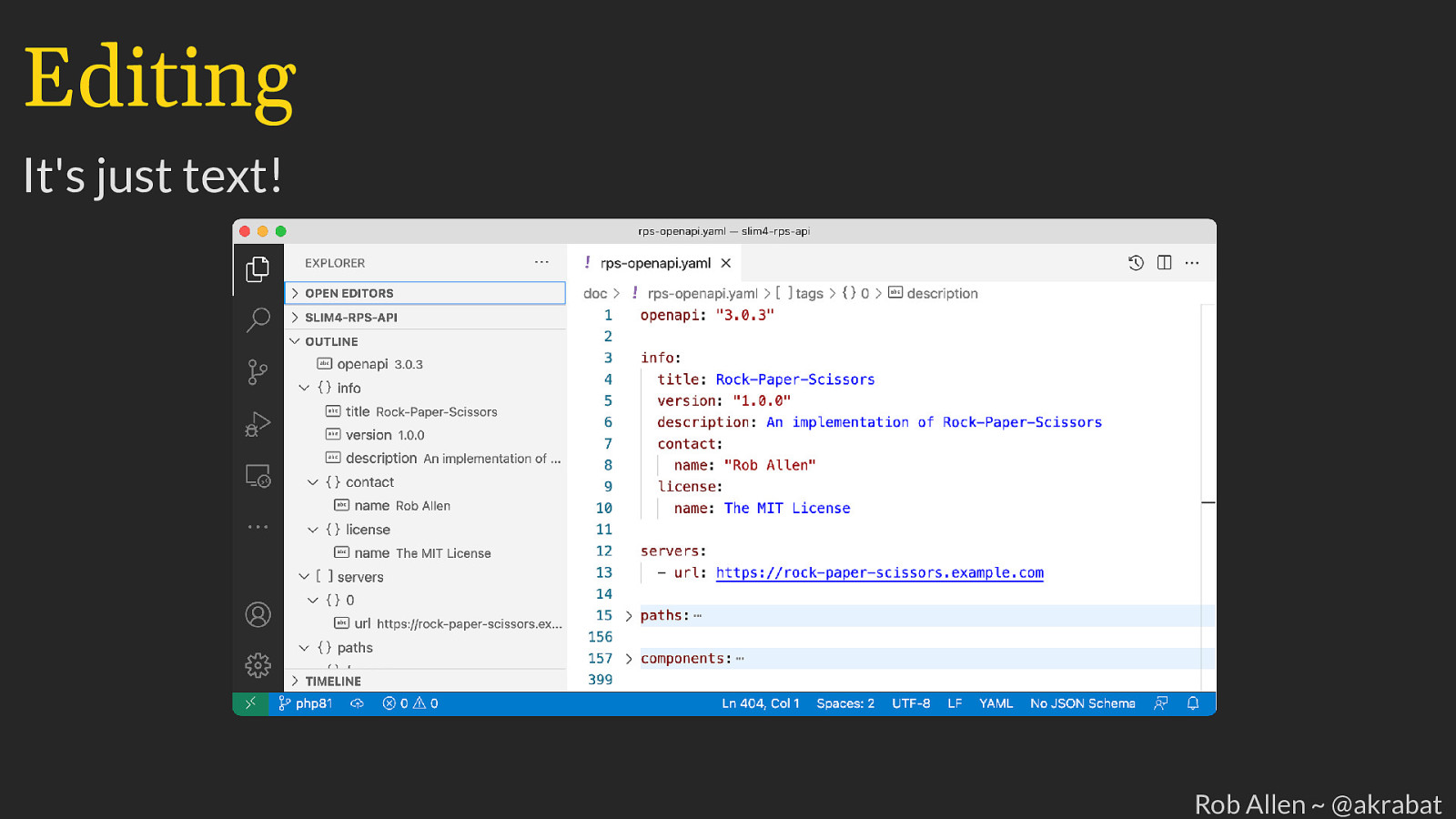
Editing It’s just text! Rob Allen ~ @akrabat
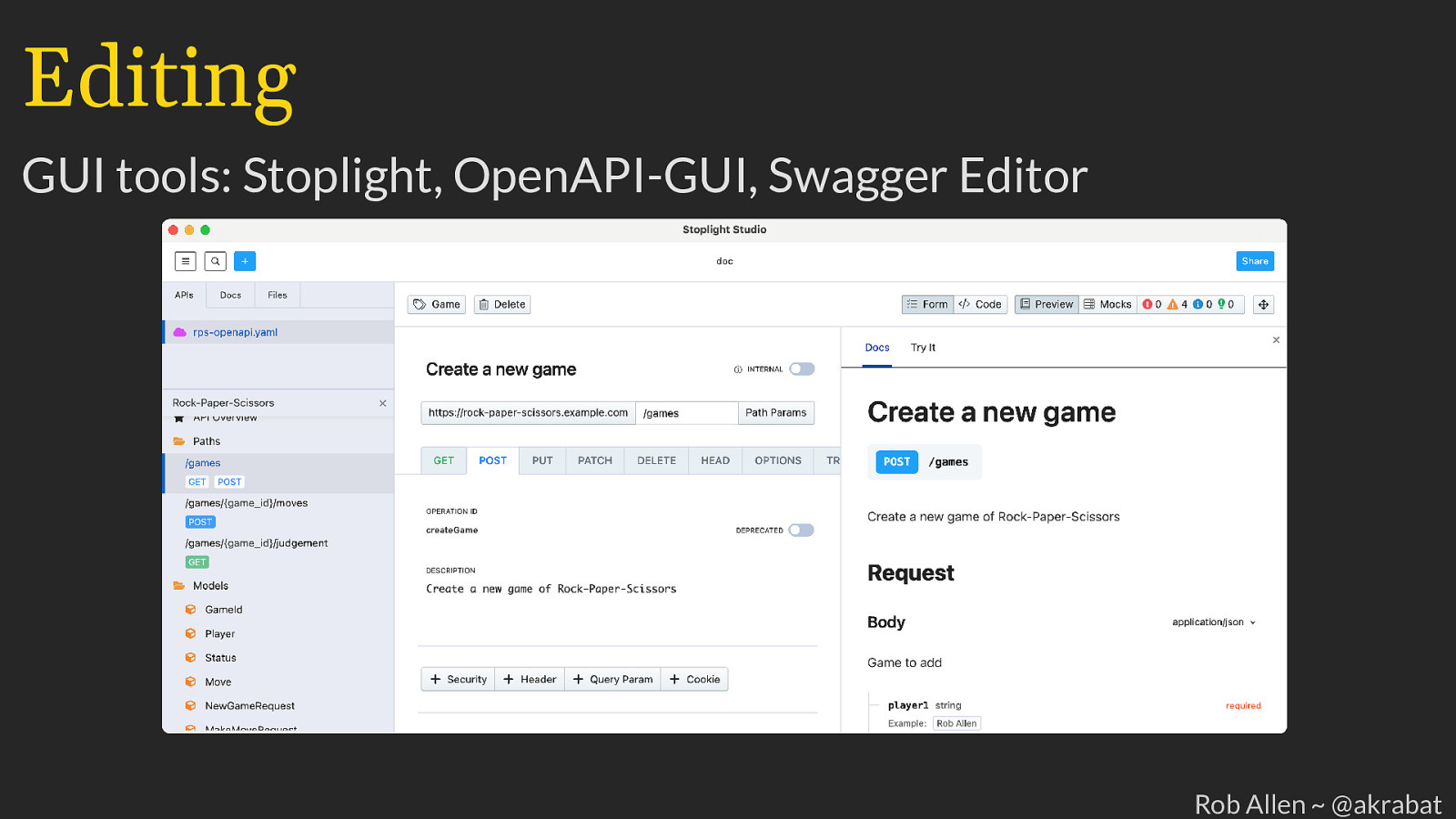
Editing GUI tools: Stoplight, OpenAPI-GUI, Swagger Editor Rob Allen ~ @akrabat
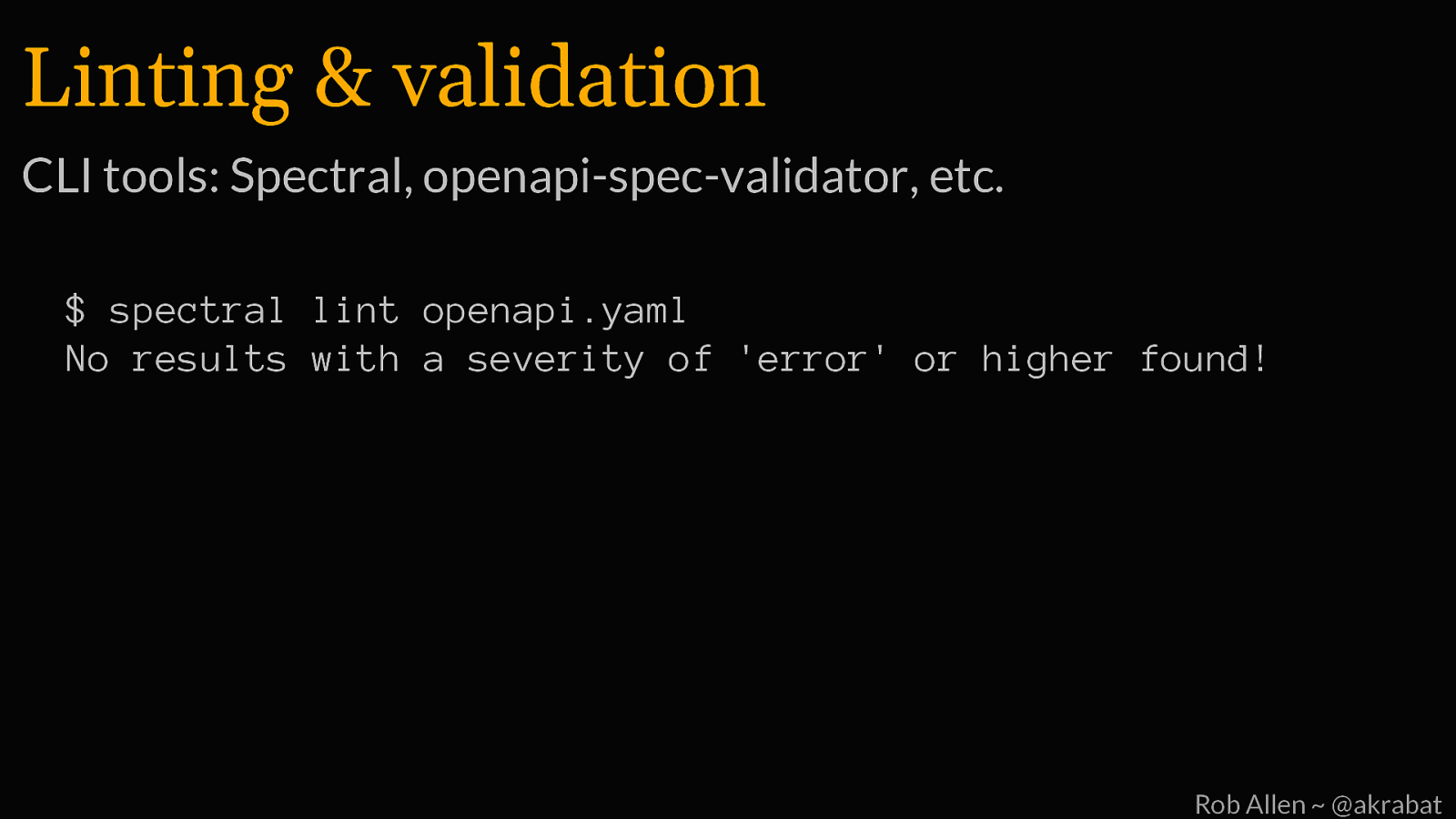
Linting & validation CLI tools: Spectral, openapi-spec-validator, etc. $ spectral lint openapi.yaml No results with a severity of ‘error’ or higher found! Rob Allen ~ @akrabat
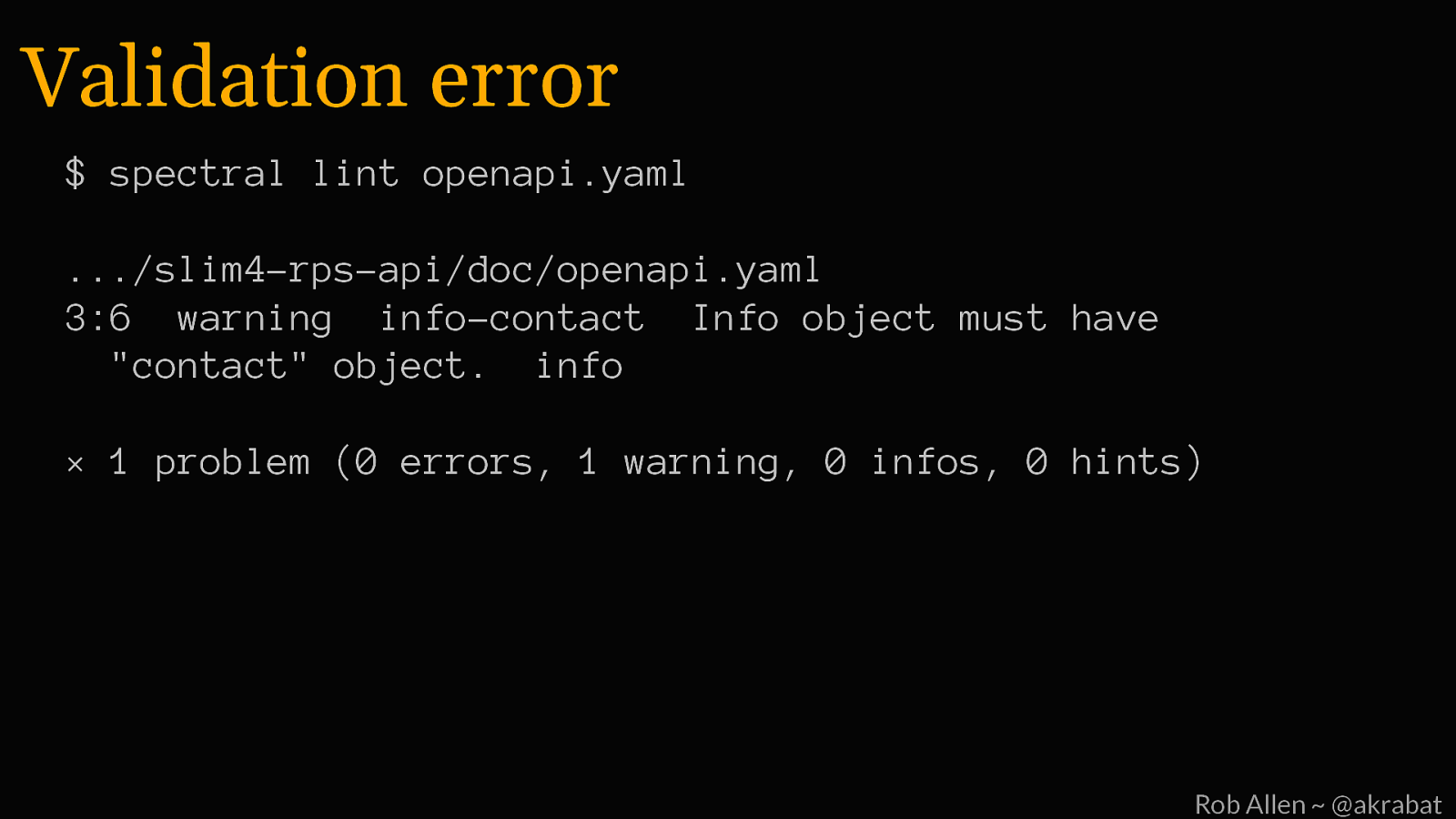
Validation error $ spectral lint openapi.yaml …/slim4-rps-api/doc/openapi.yaml 3:6 warning info-contact Info object must have “contact” object. info × 1 problem (0 errors, 1 warning, 0 infos, 0 hints) Rob Allen ~ @akrabat
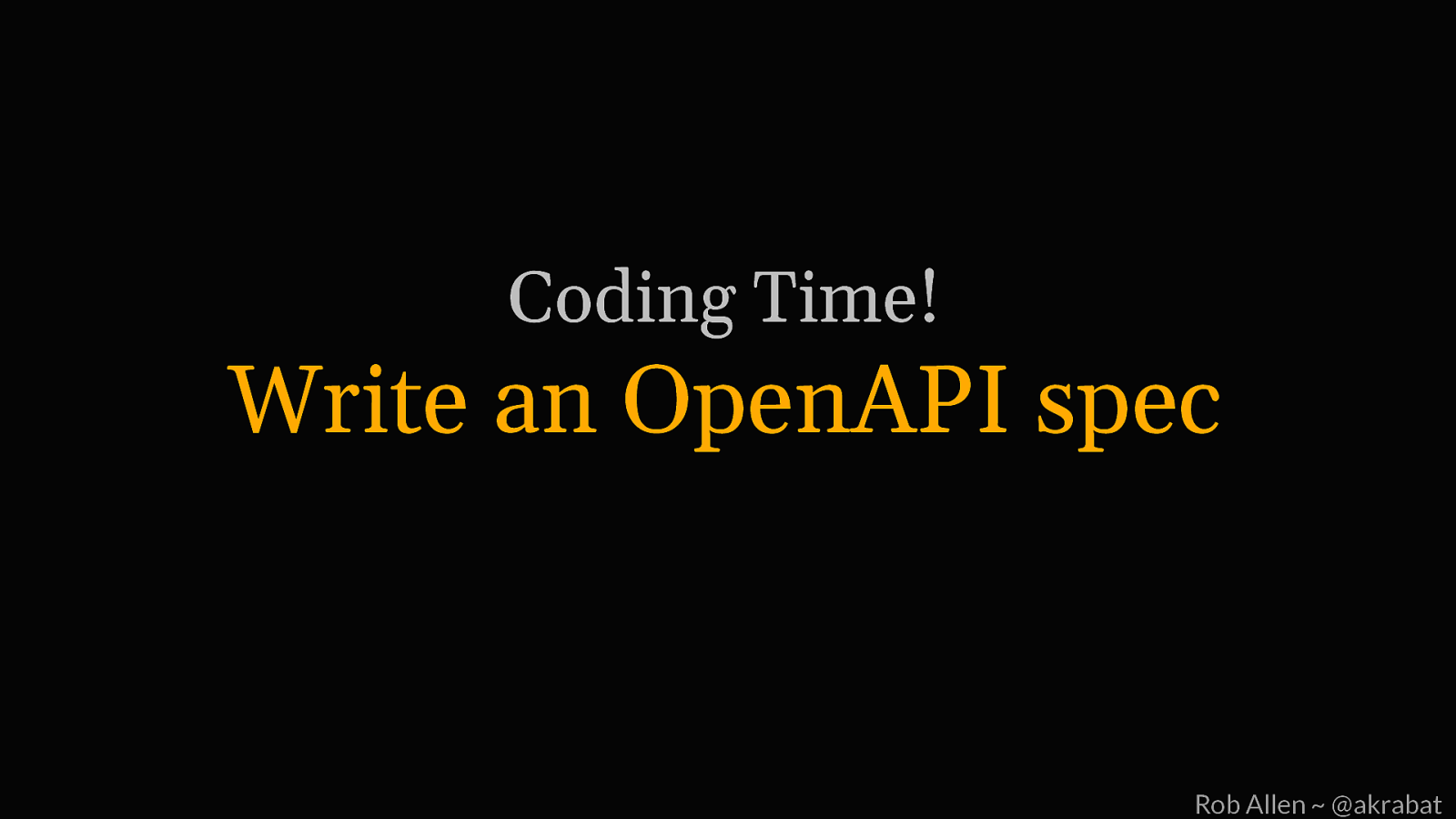
Coding Time! Write an OpenAPI spec Rob Allen ~ @akrabat

Docs Rob Allen ~ @akrabat
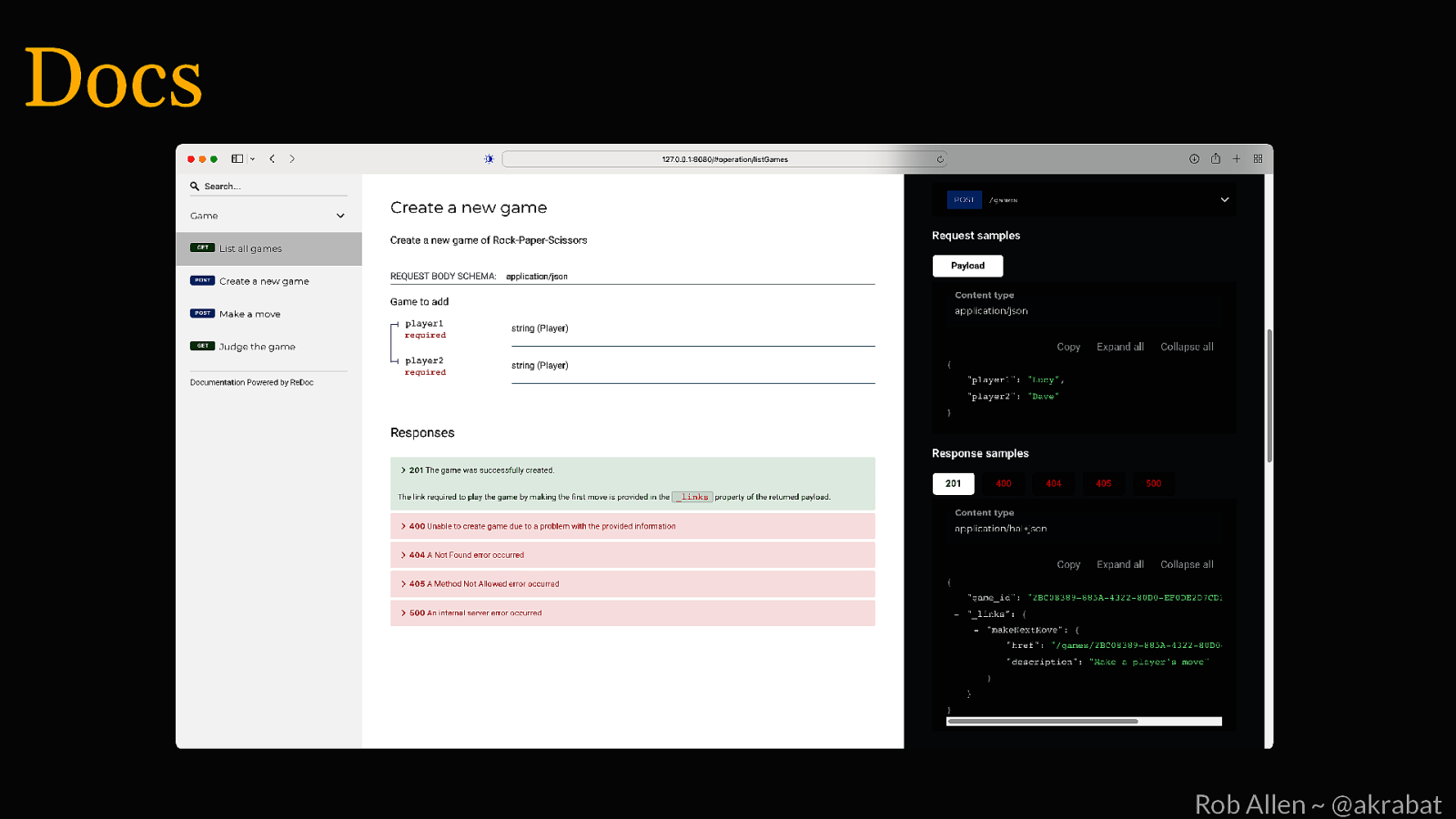
Docs Rob Allen ~ @akrabat
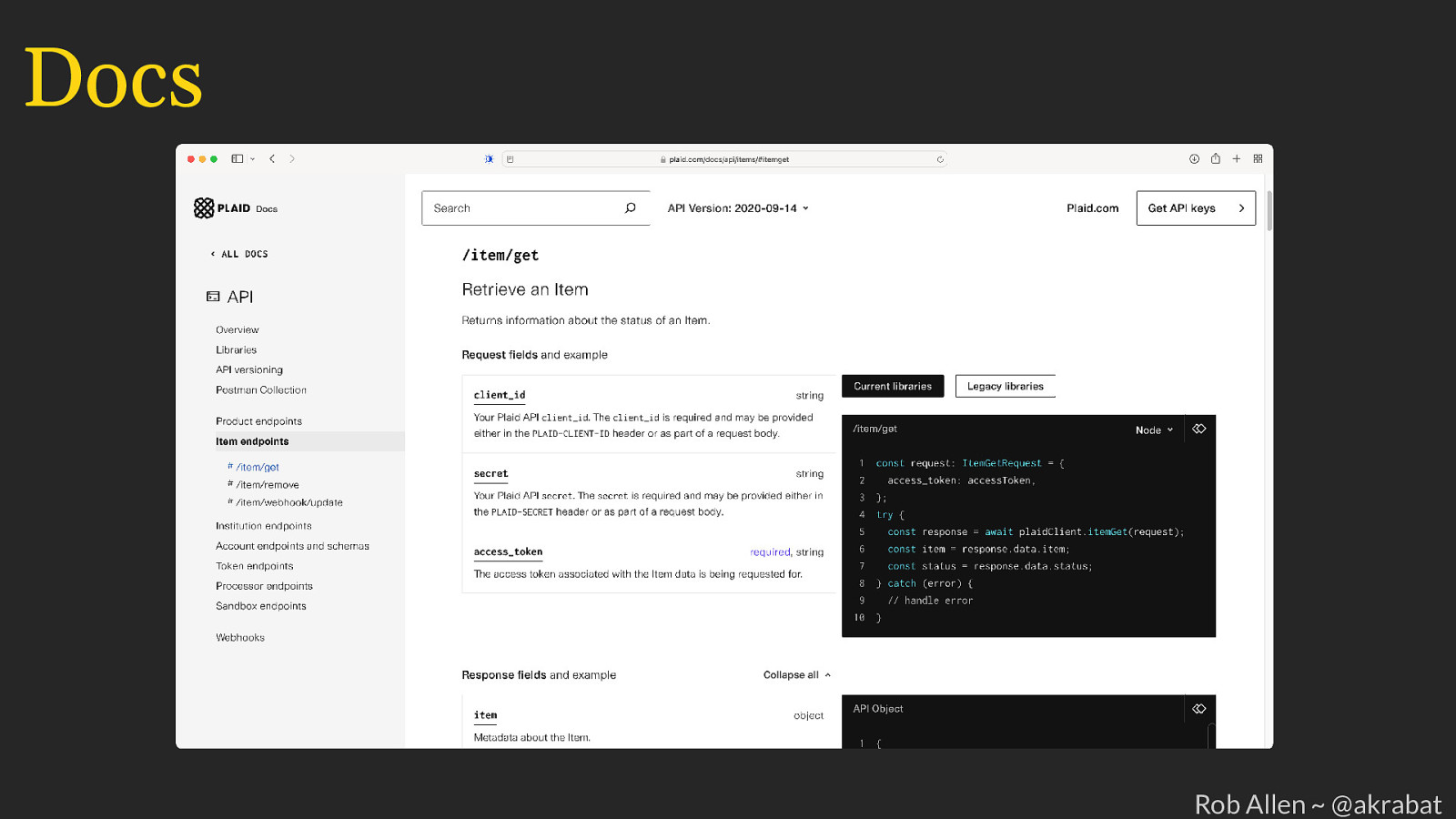
Docs Rob Allen ~ @akrabat
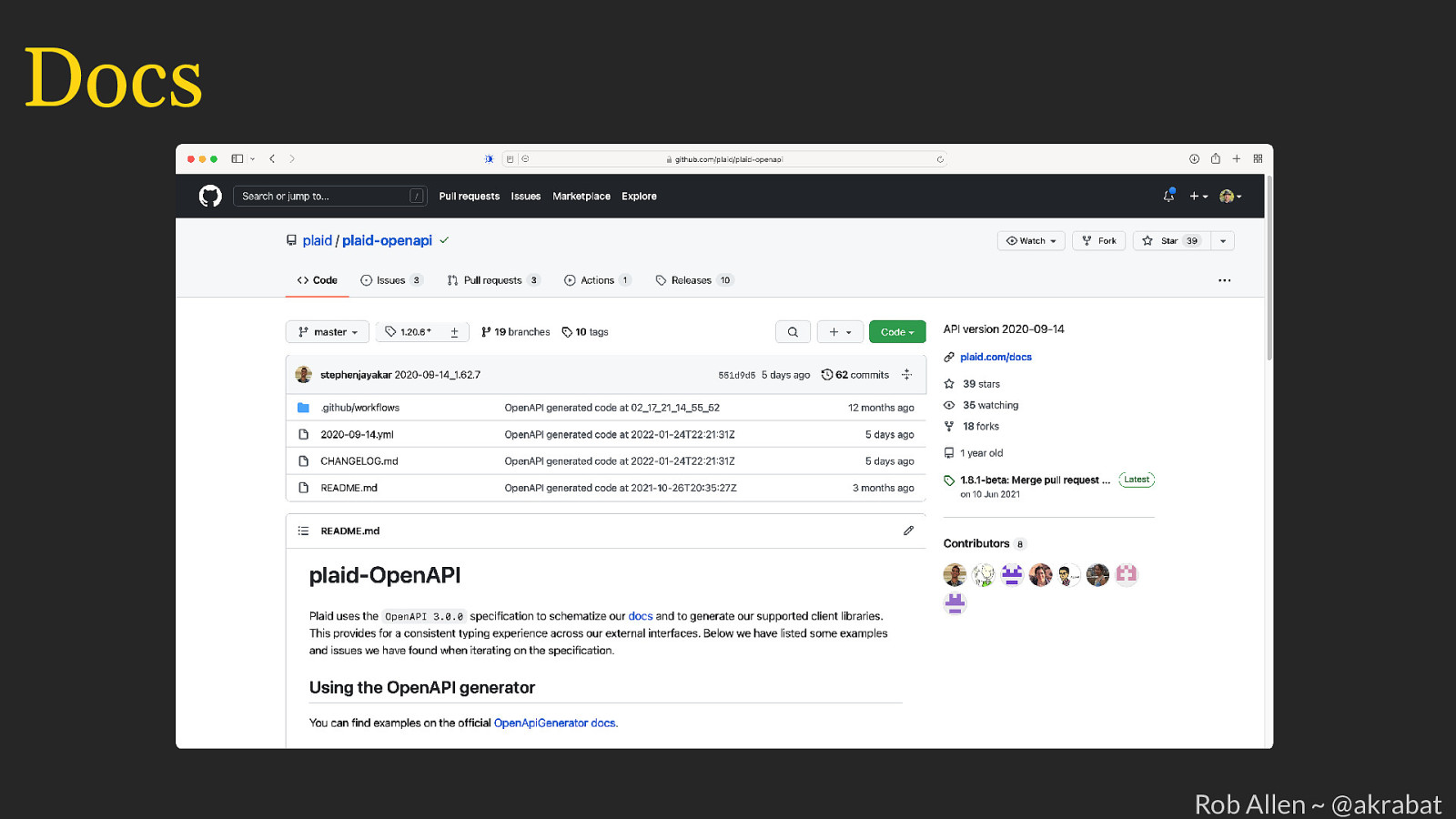
Docs Rob Allen ~ @akrabat
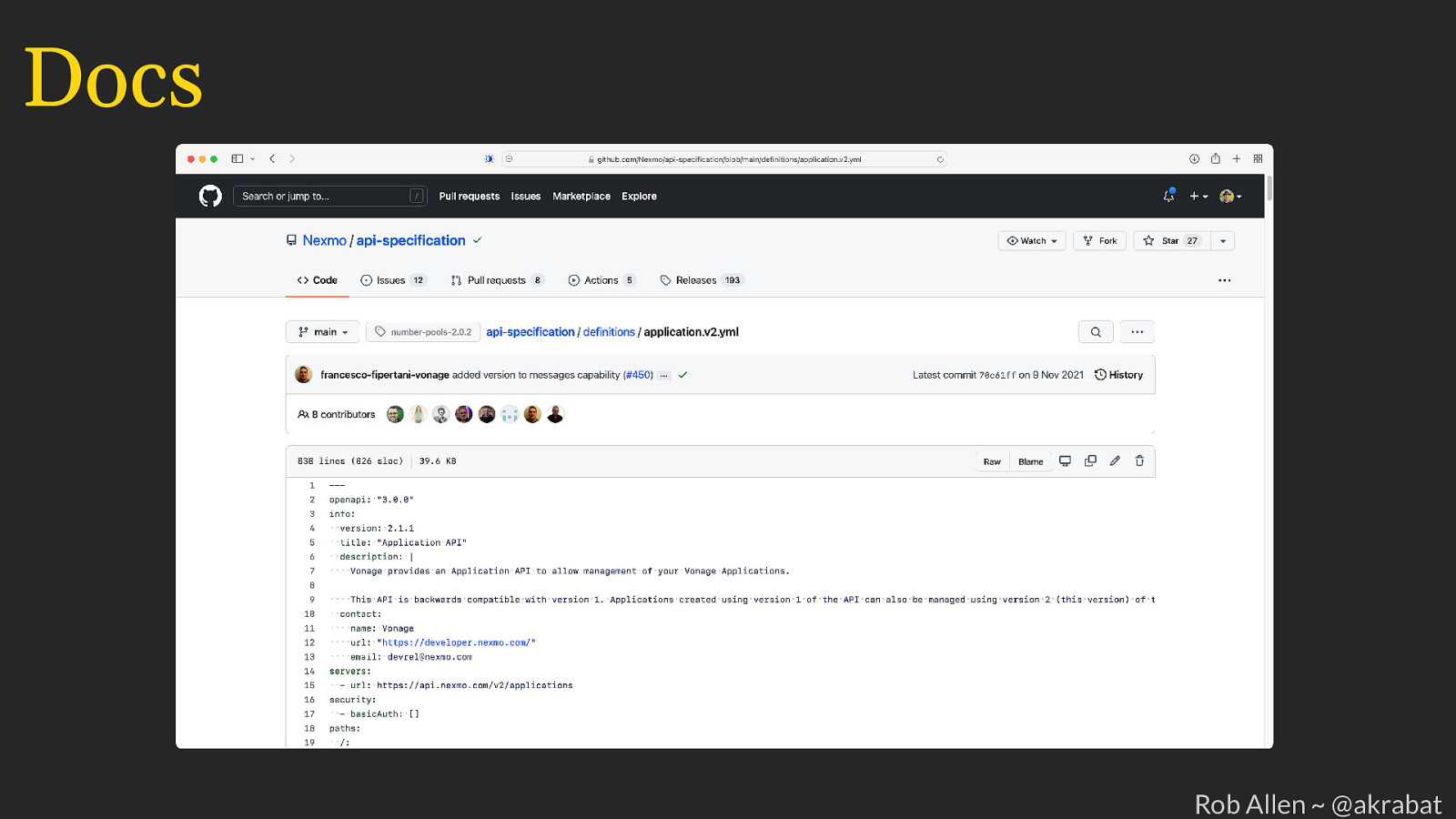
Docs Rob Allen ~ @akrabat
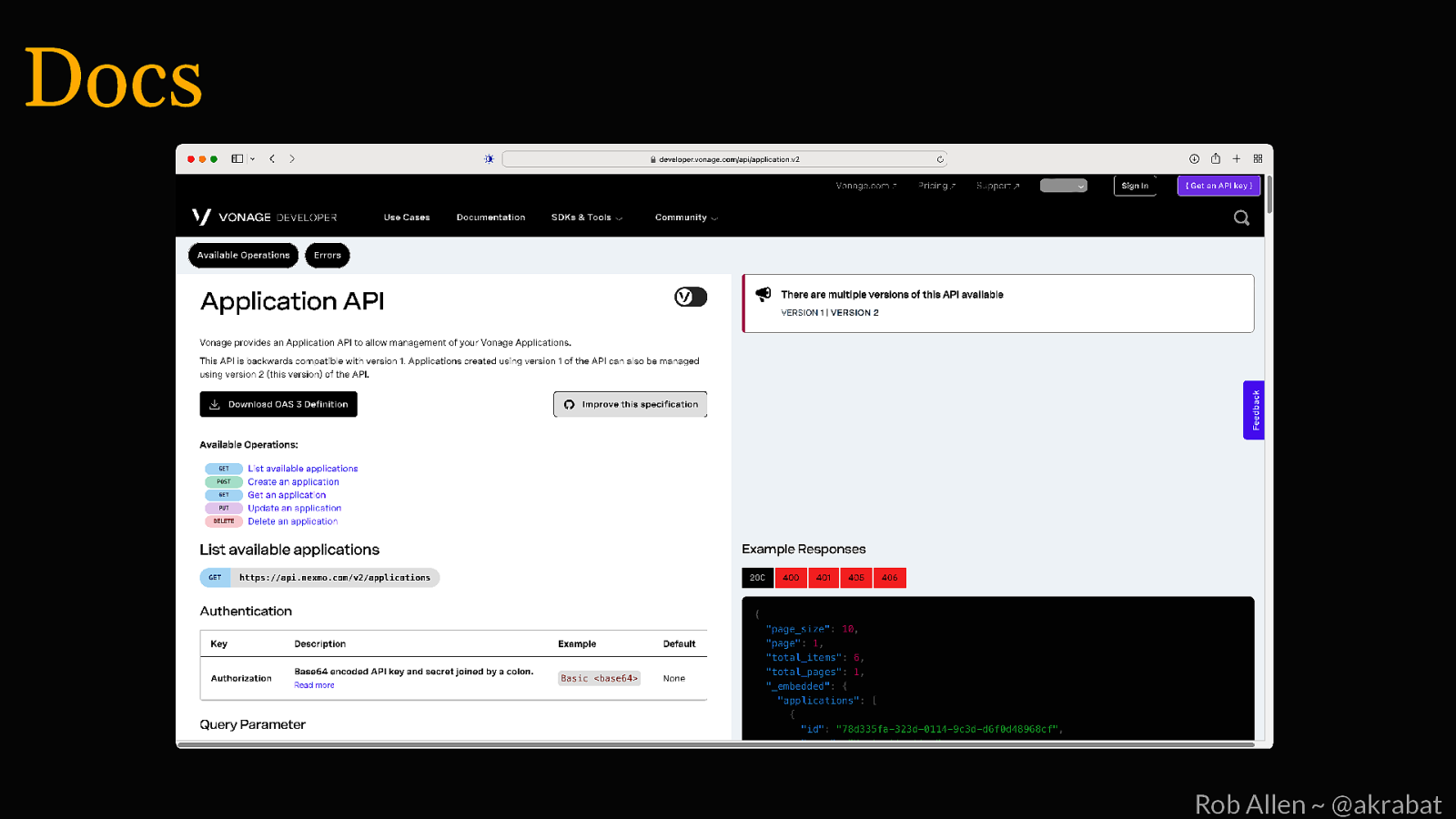
Docs Rob Allen ~ @akrabat
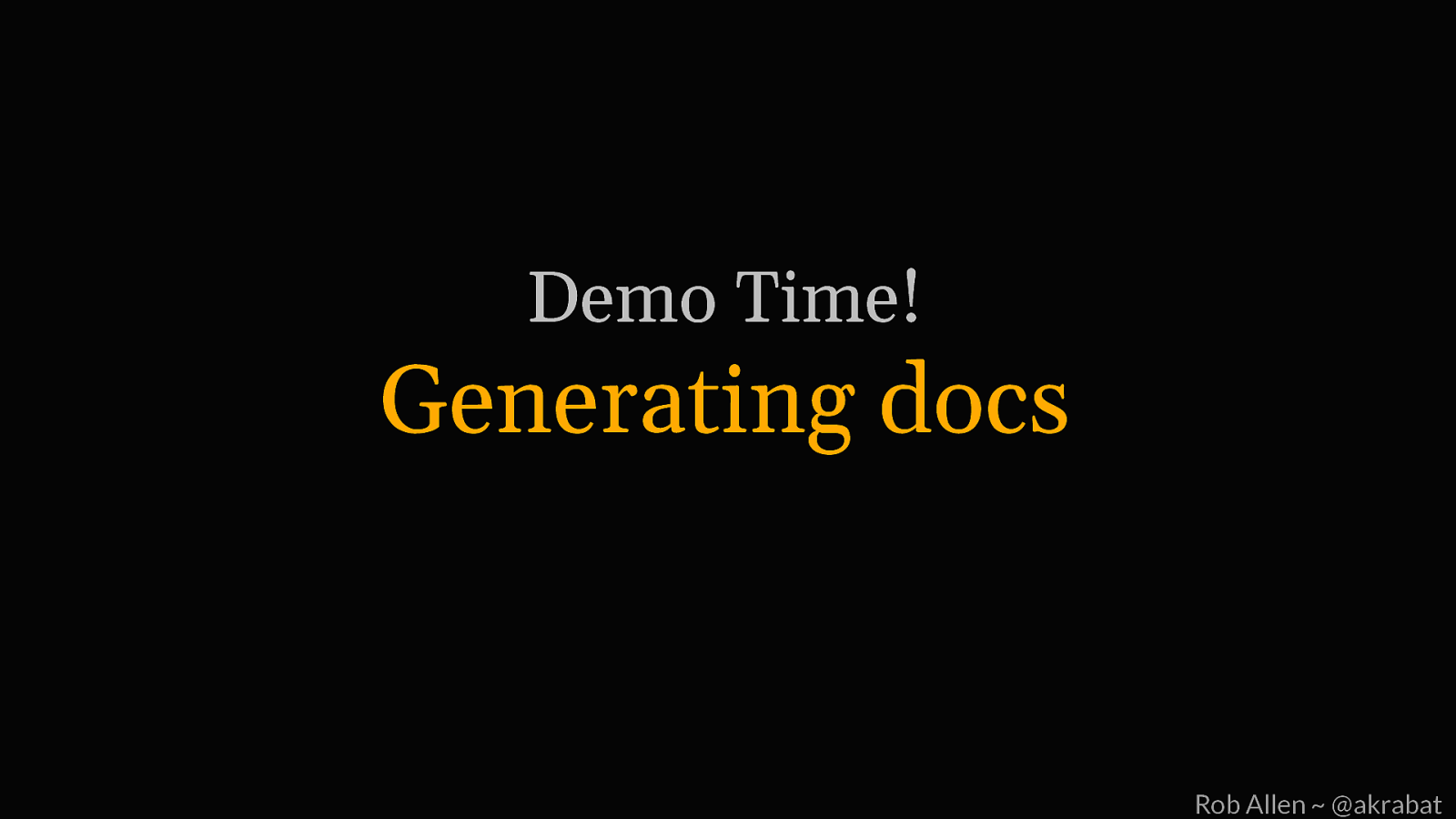
Demo Time! Generating docs Rob Allen ~ @akrabat

Developers Rob Allen ~ @akrabat
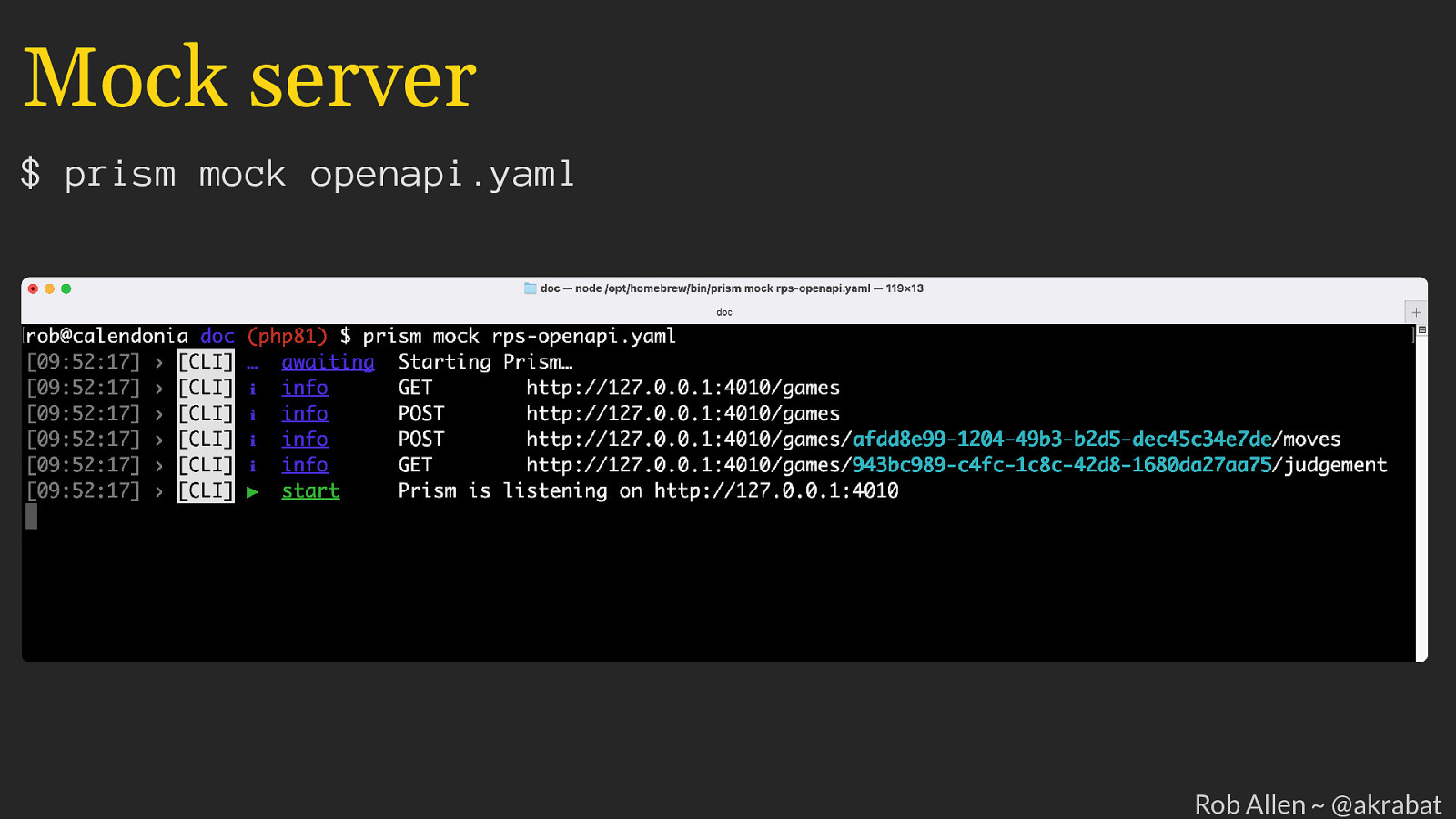
Mock server $ prism mock openapi.yaml Rob Allen ~ @akrabat
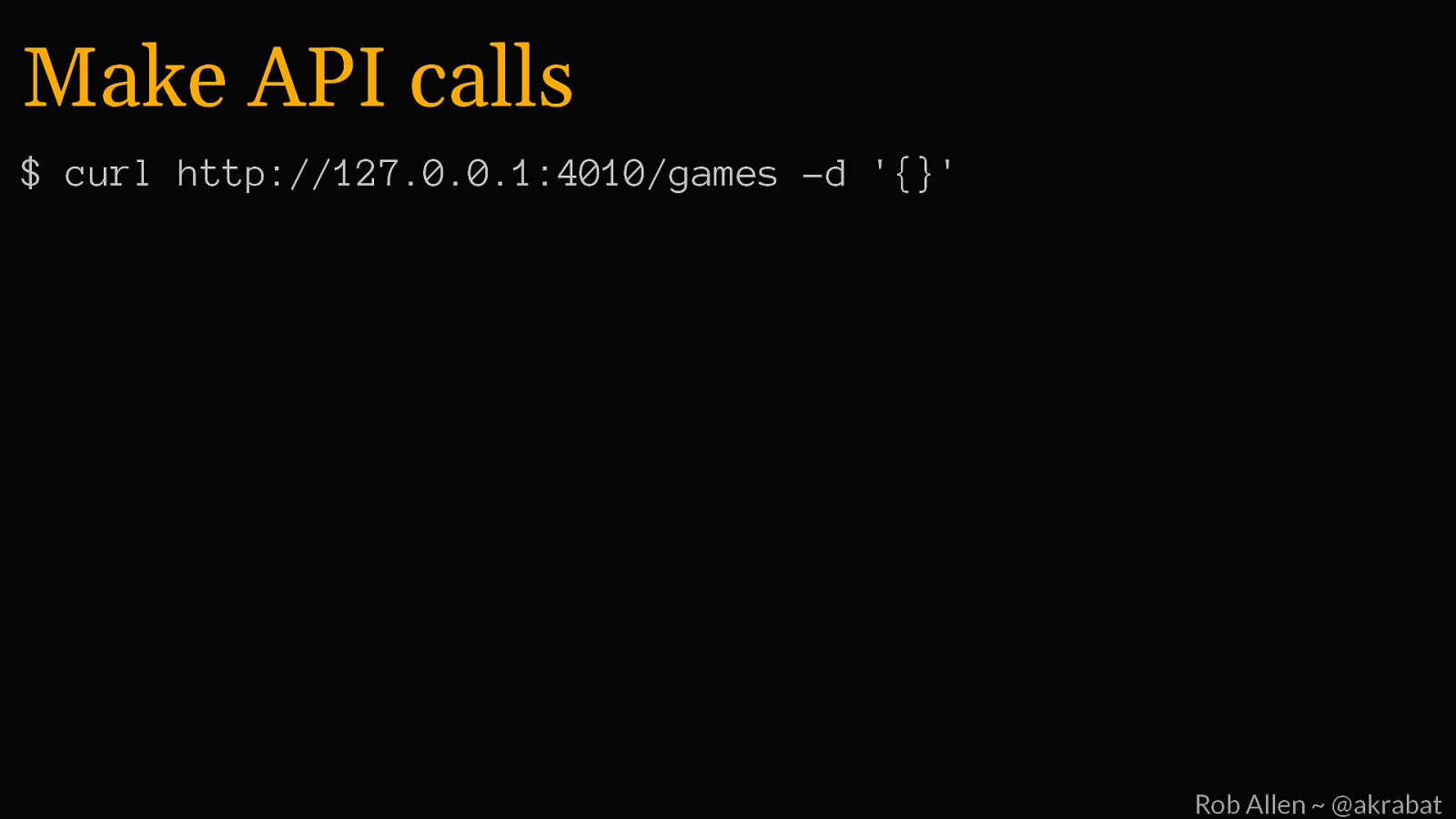
Make API calls $ curl http://127.0.0.1:4010/games -d ‘{}’ Rob Allen ~ @akrabat
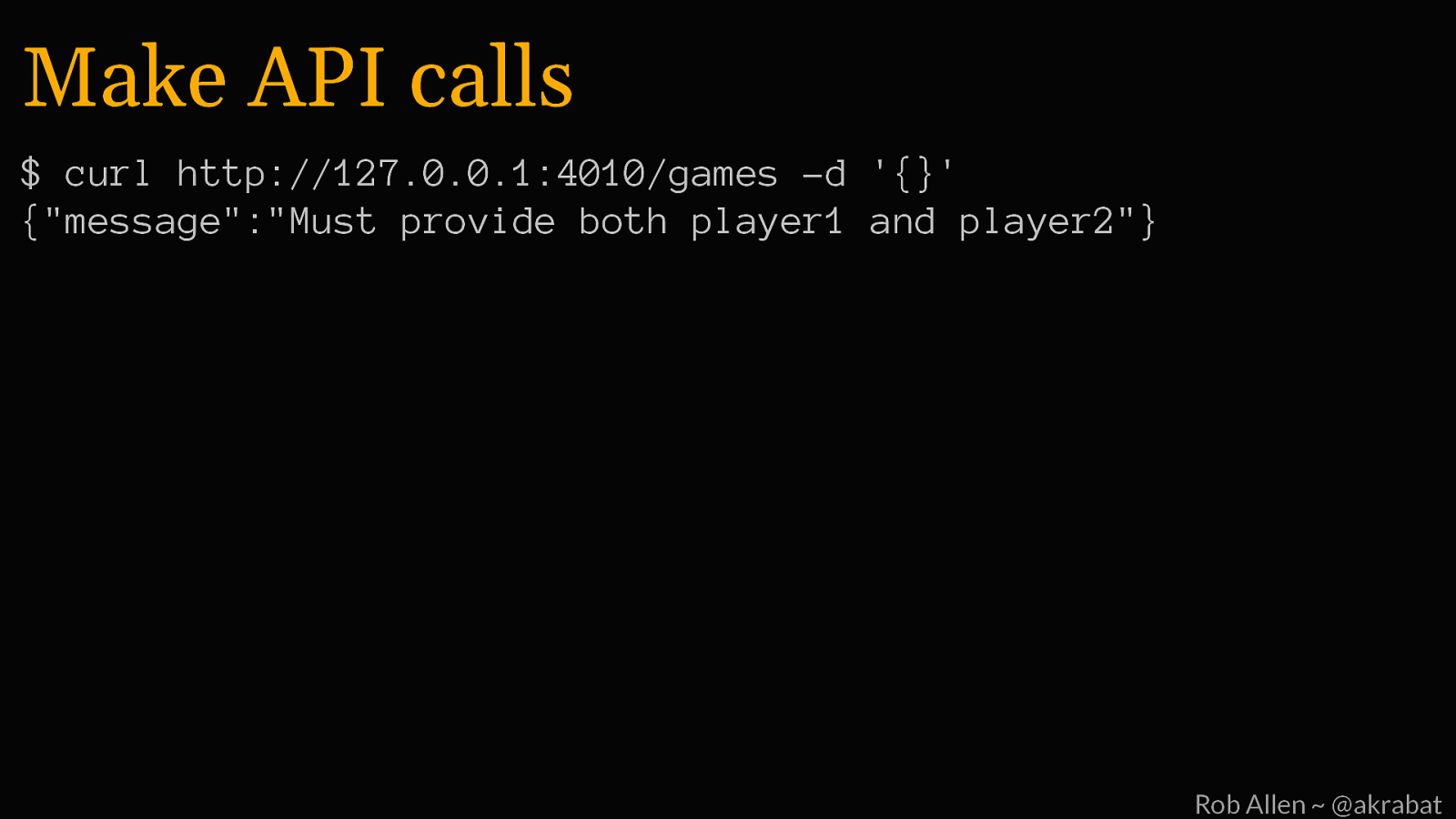
Make API calls $ curl http://127.0.0.1:4010/games -d ‘{}’ {“message”:”Must provide both player1 and player2”} Rob Allen ~ @akrabat
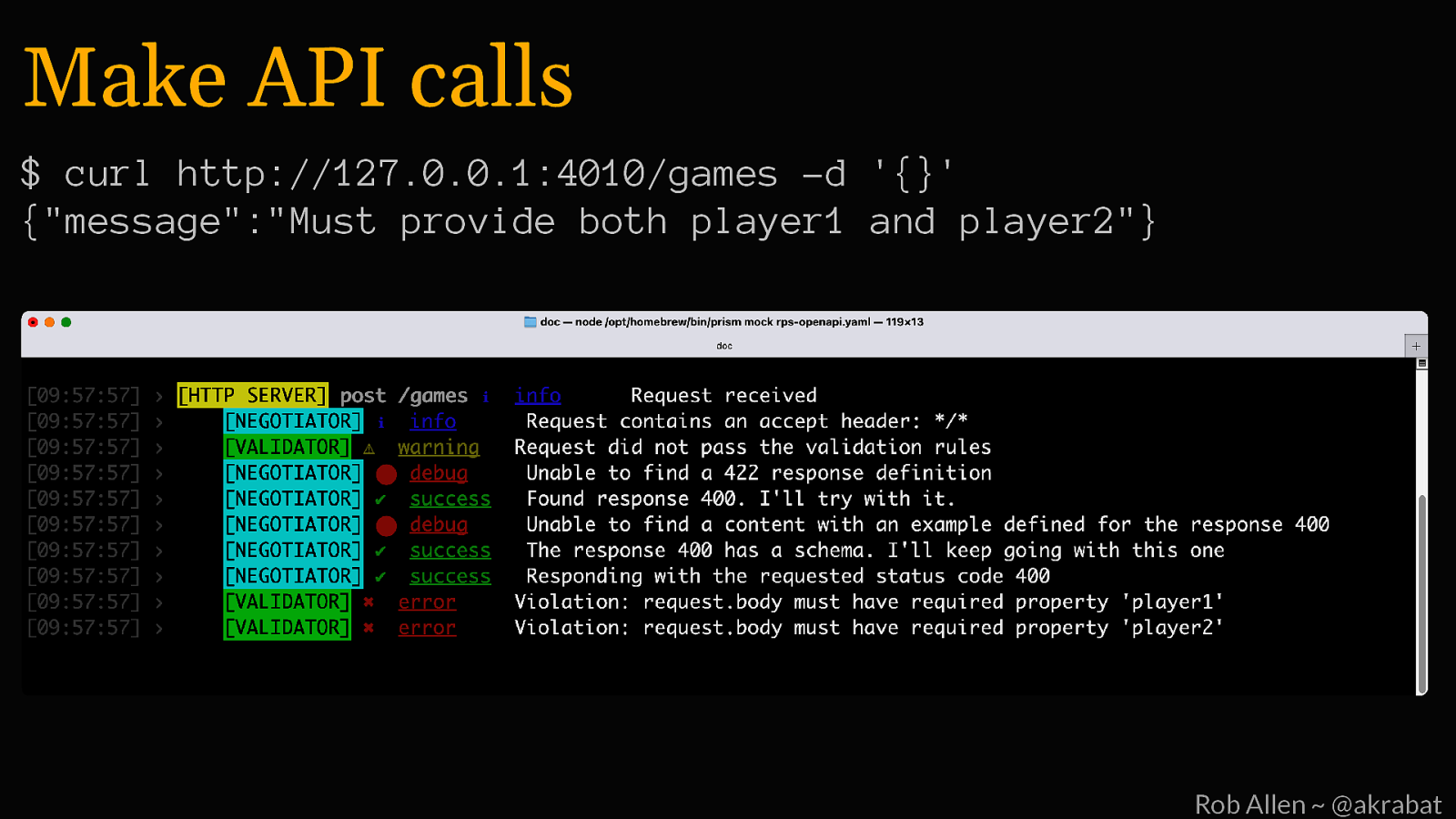
Make API calls $ curl http://127.0.0.1:4010/games -d ‘{}’ {“message”:”Must provide both player1 and player2”} Rob Allen ~ @akrabat
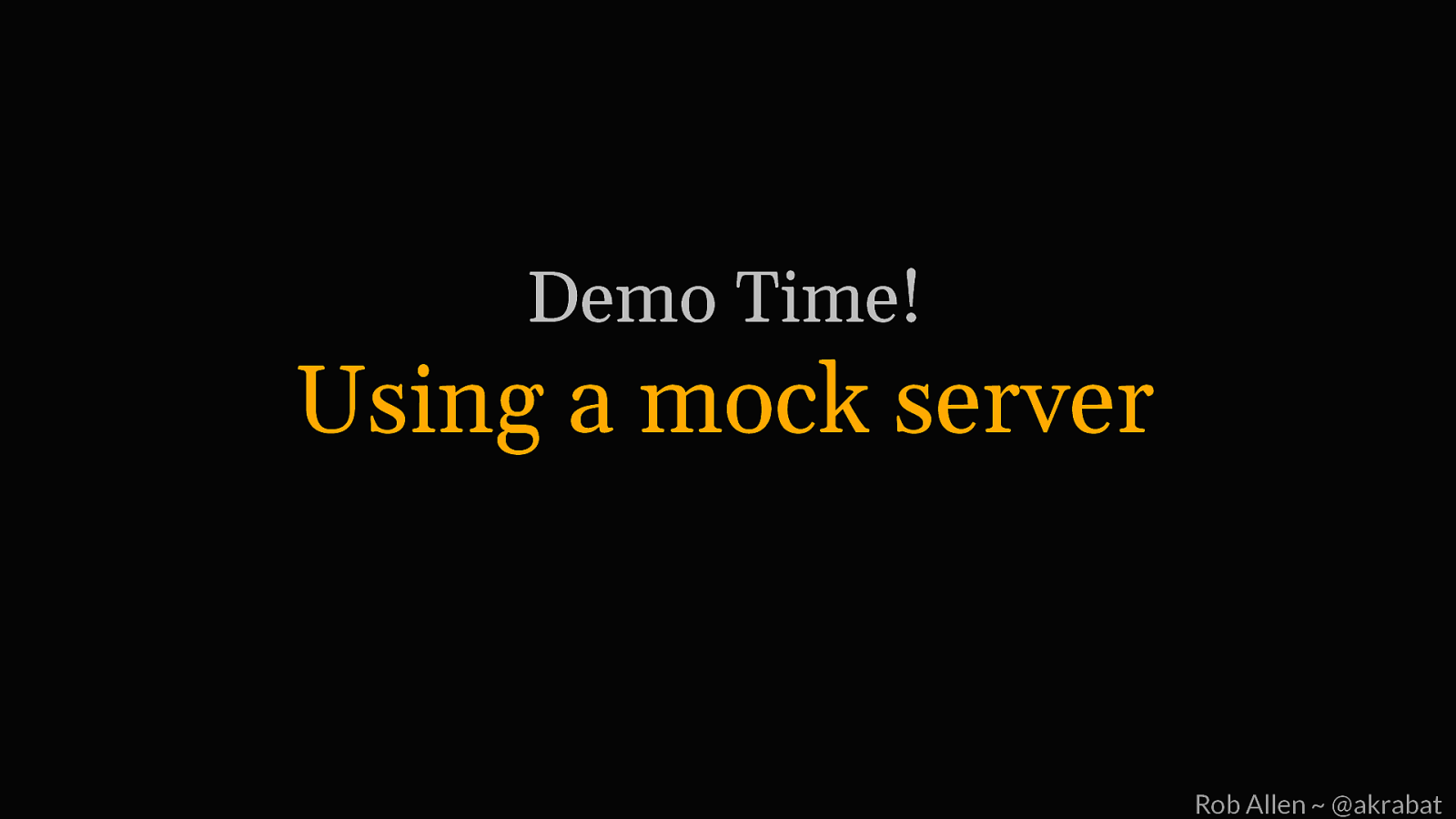
Demo Time! Using a mock server Rob Allen ~ @akrabat
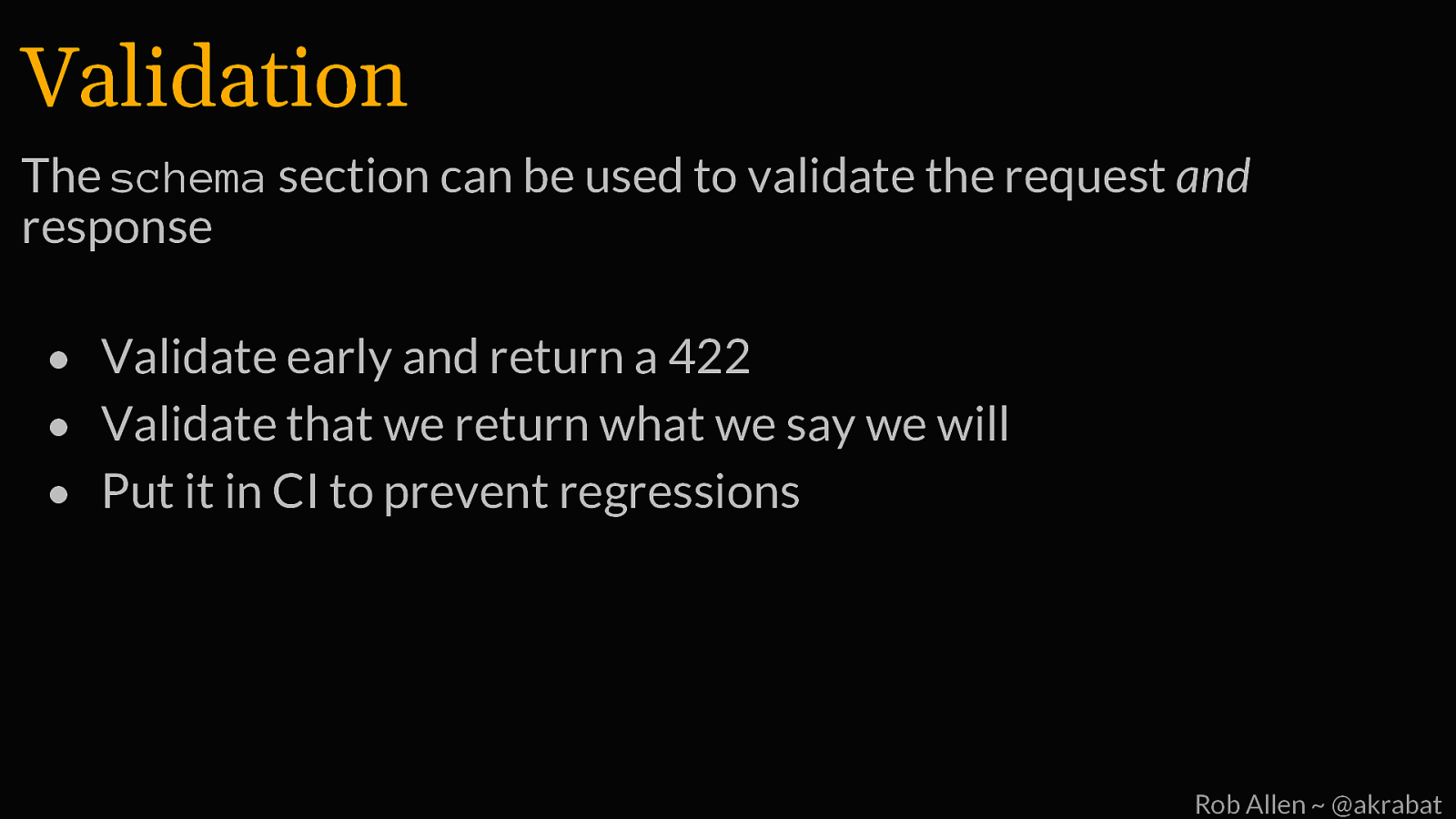
Validation The schema section can be used to validate the request and response • Validate early and return a 422 • Validate that we return what we say we will • Put it in CI to prevent regressions Rob Allen ~ @akrabat
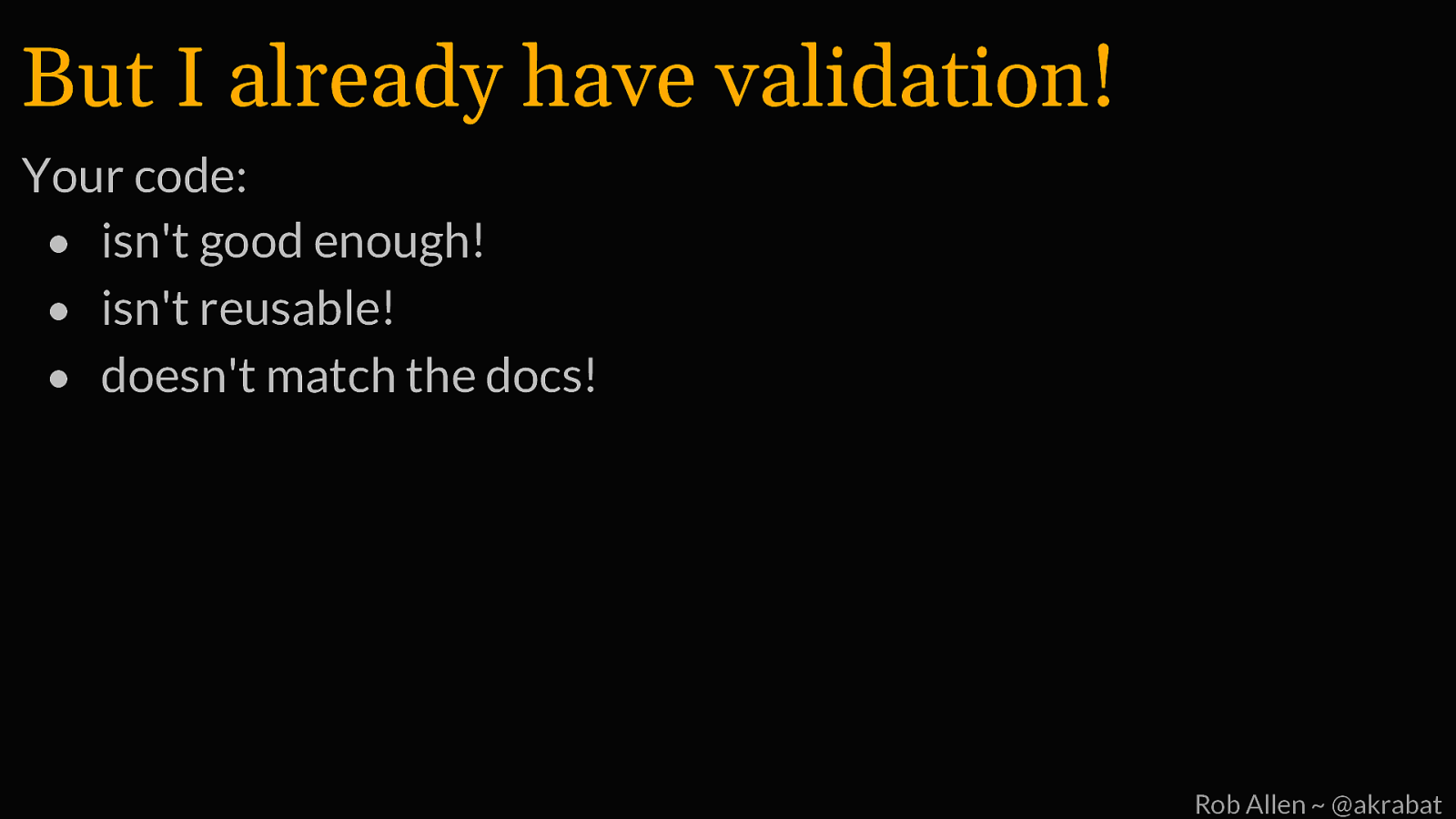
But I already have validation! Your code: • isn’t good enough! • isn’t reusable! • doesn’t match the docs! Rob Allen ~ @akrabat
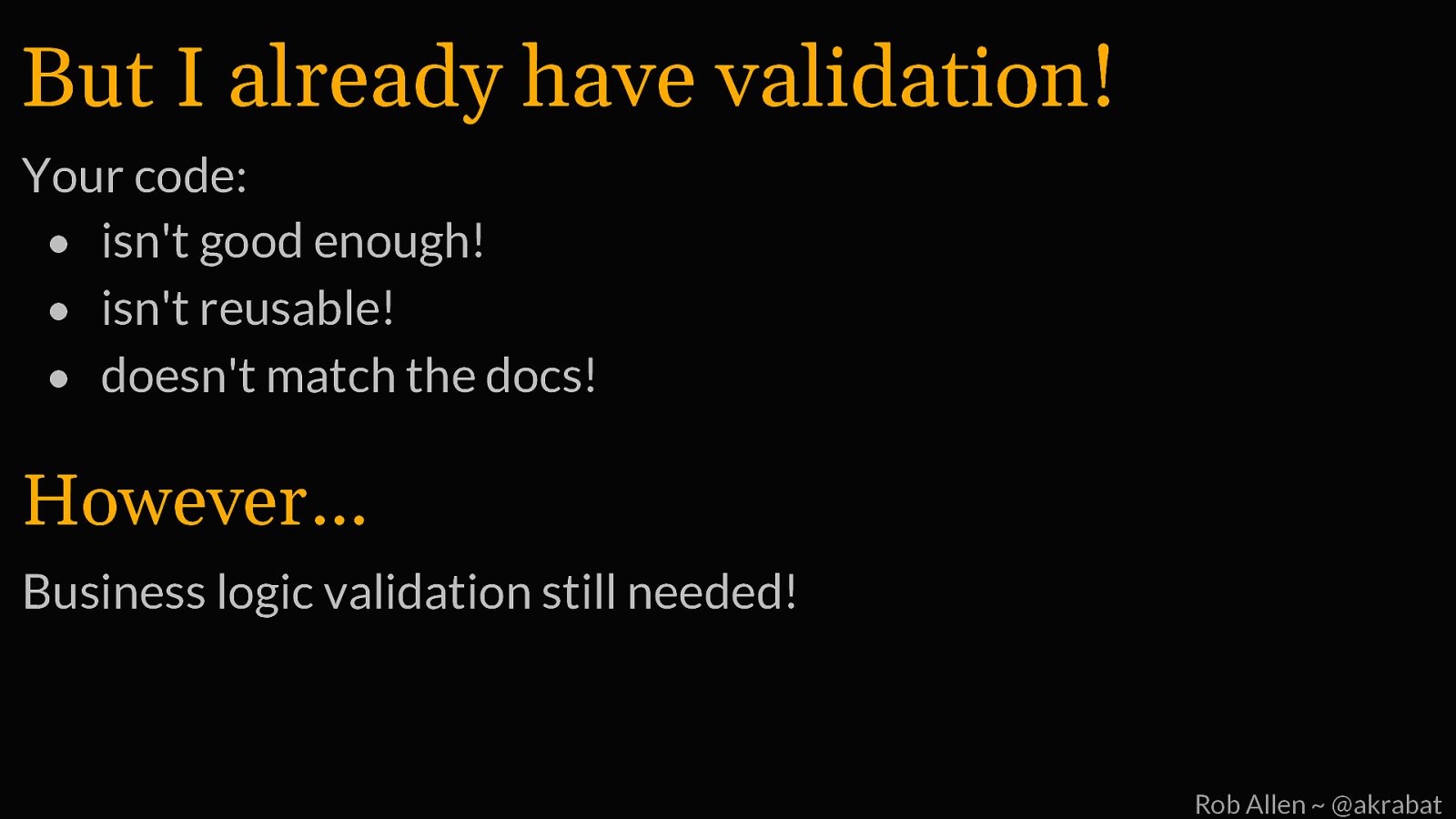
But I already have validation! Your code: • isn’t good enough! • isn’t reusable! • doesn’t match the docs! However… Business logic validation still needed! Rob Allen ~ @akrabat
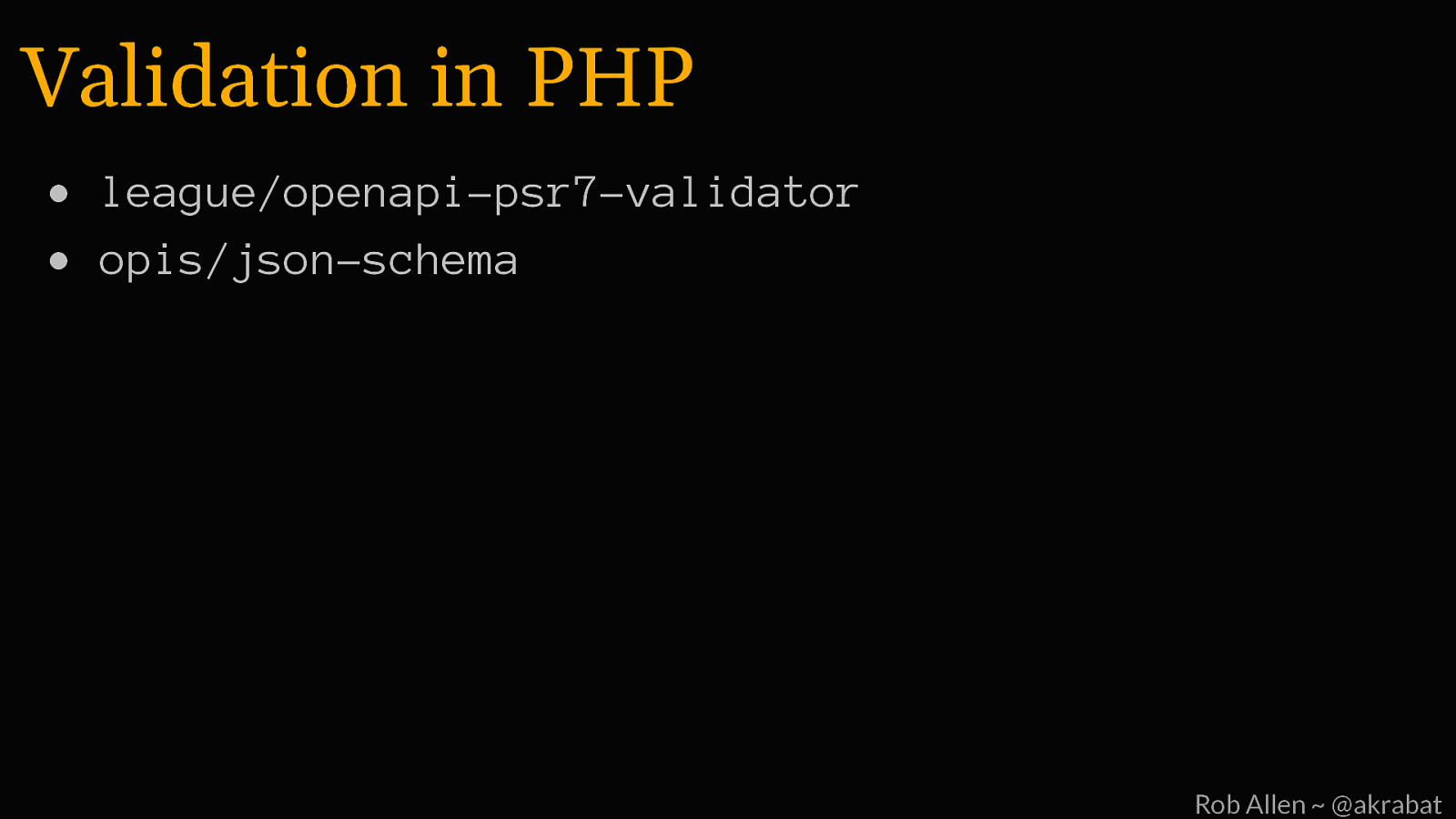
Validation in PHP • league/openapi-psr7-validator • opis/json-schema Rob Allen ~ @akrabat
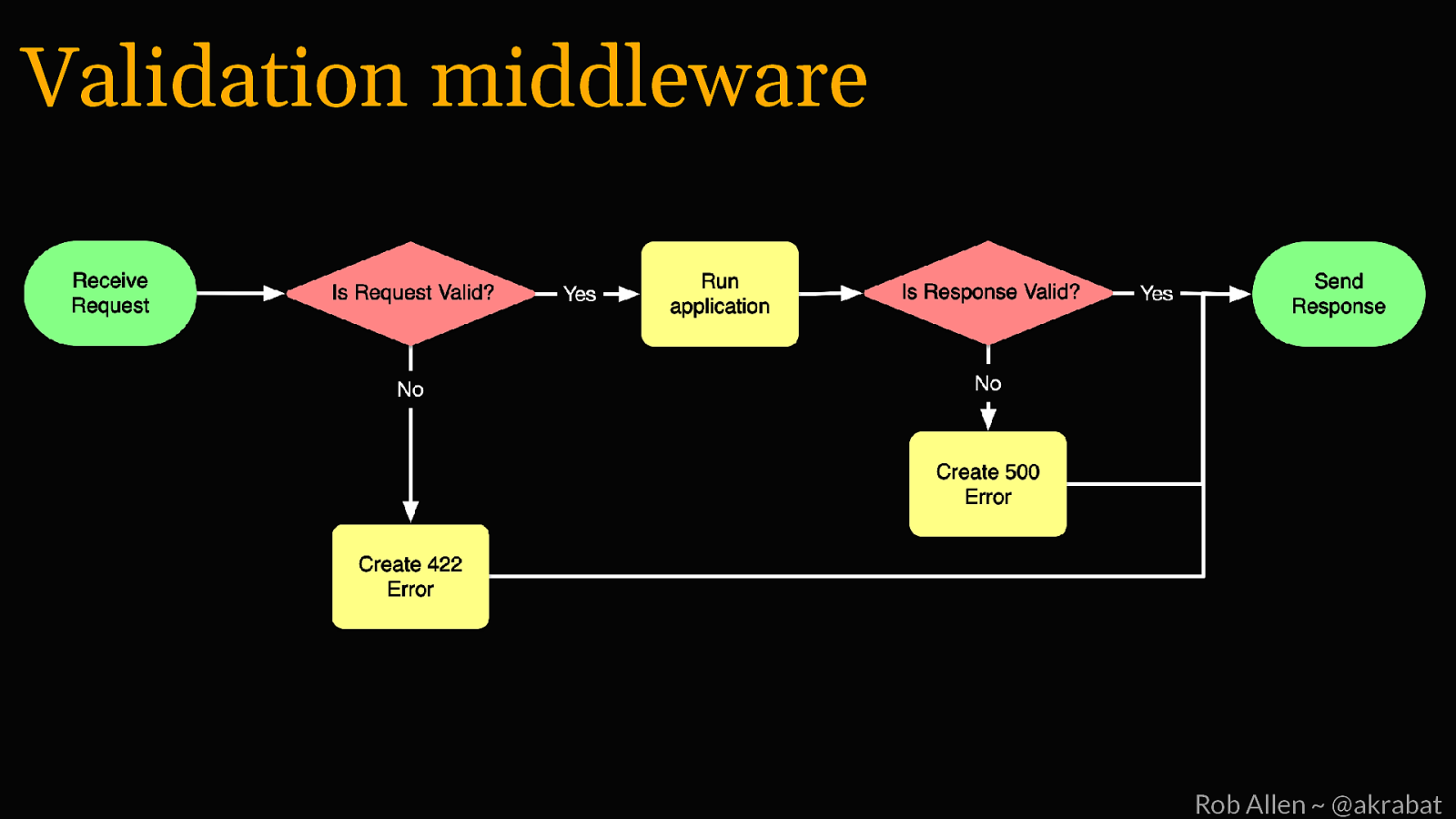
Validation middleware Rob Allen ~ @akrabat
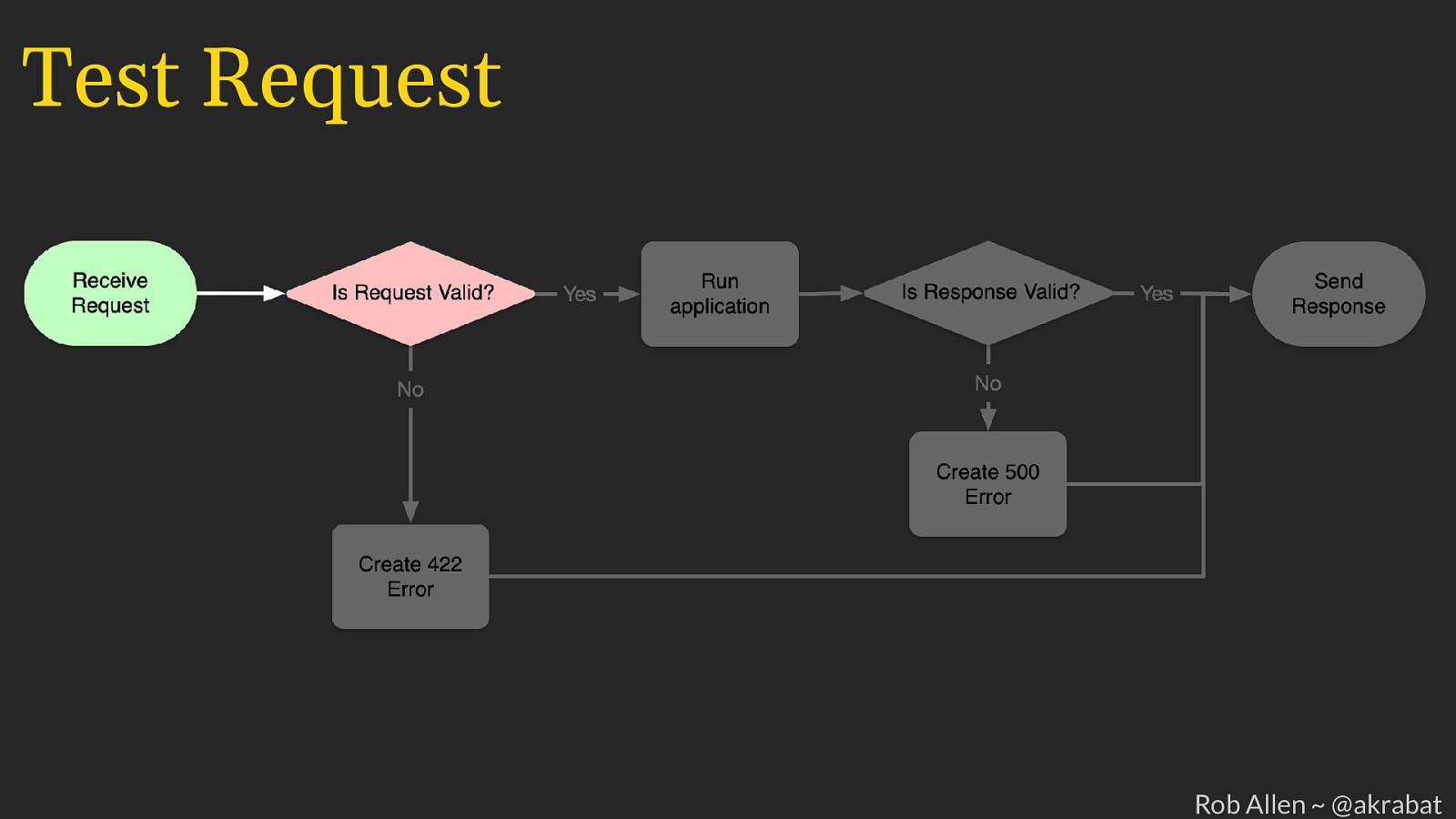
Test Request Rob Allen ~ @akrabat
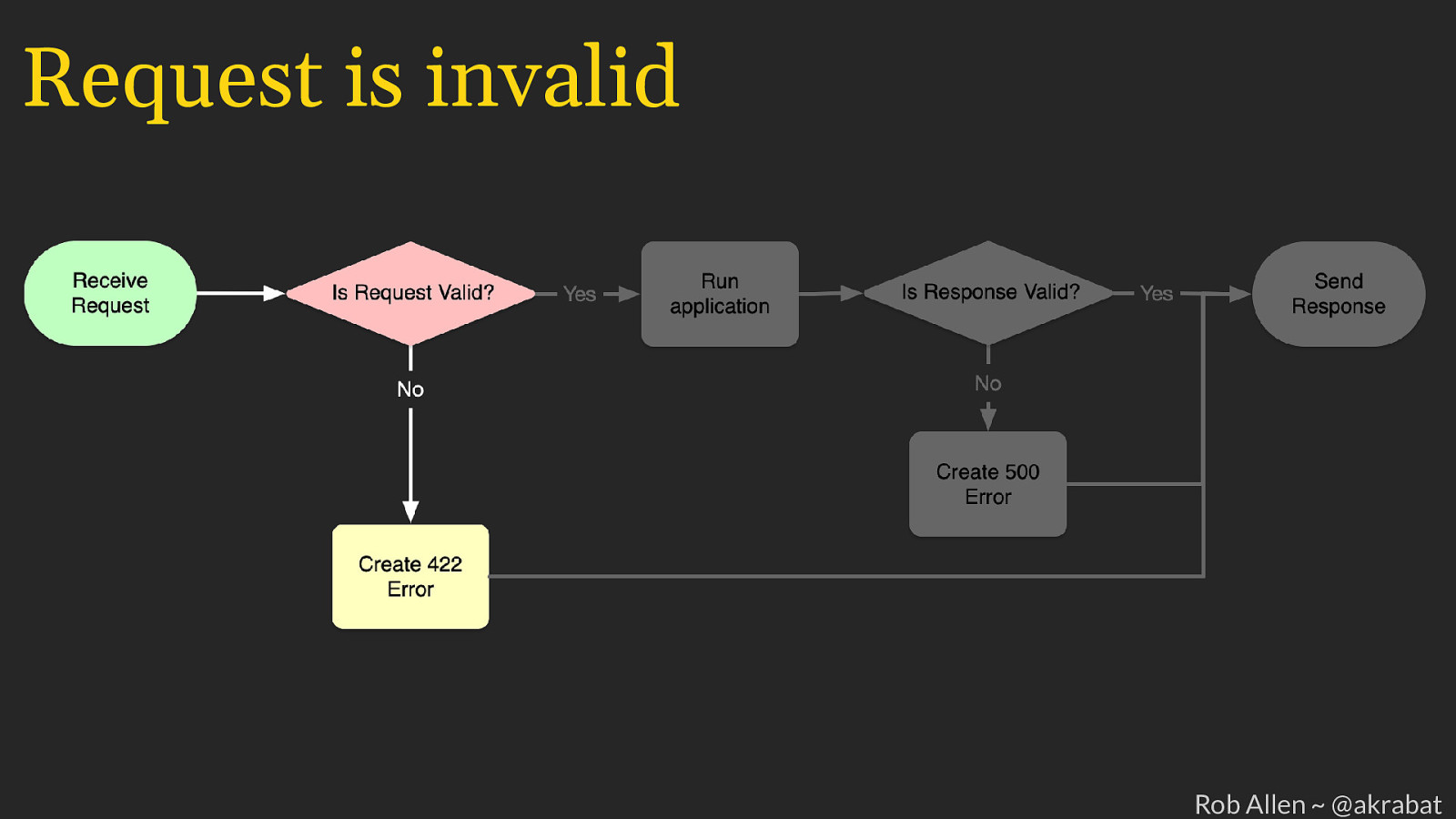
Request is invalid Rob Allen ~ @akrabat
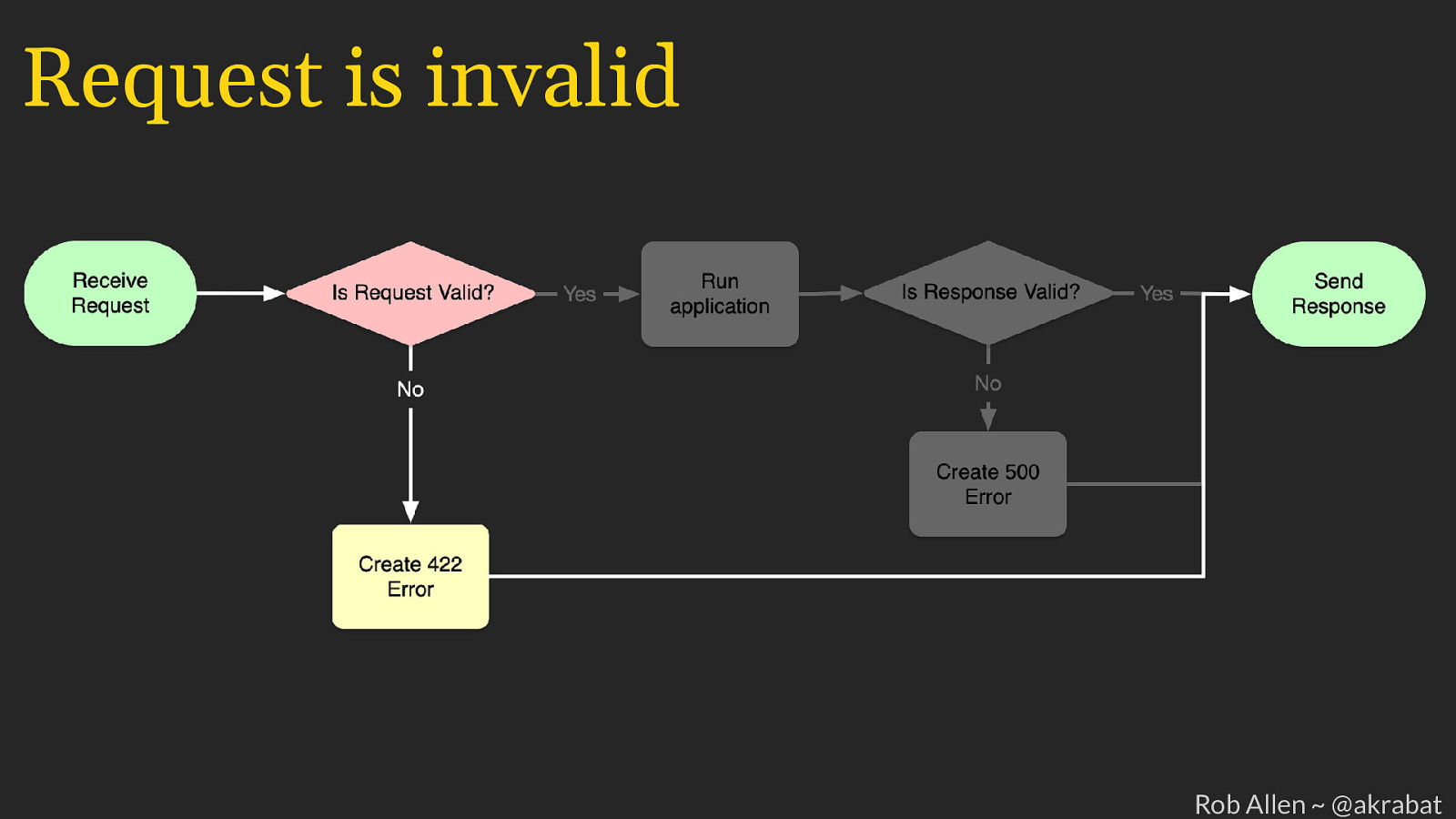
Request is invalid Rob Allen ~ @akrabat
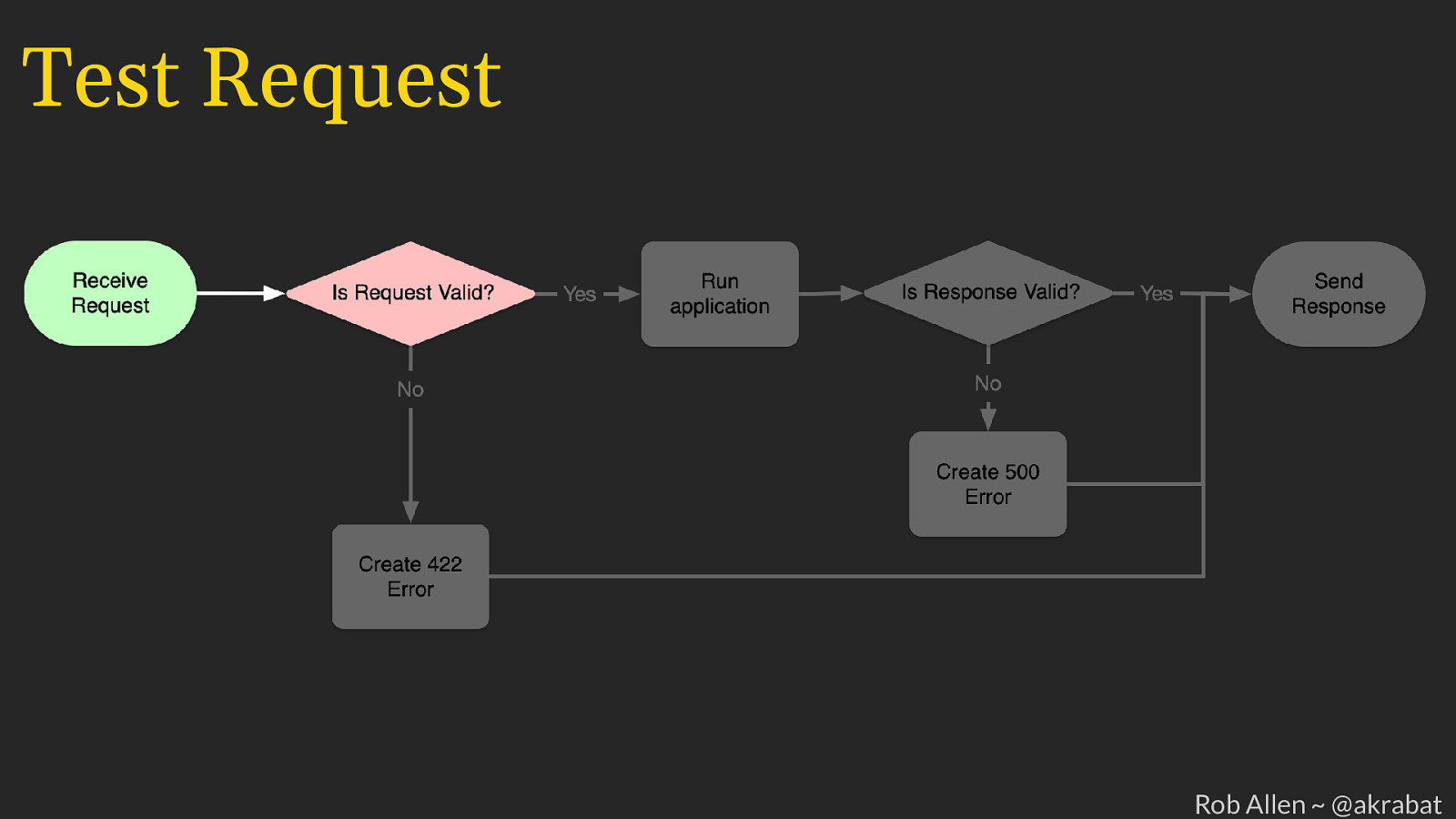
Test Request Rob Allen ~ @akrabat
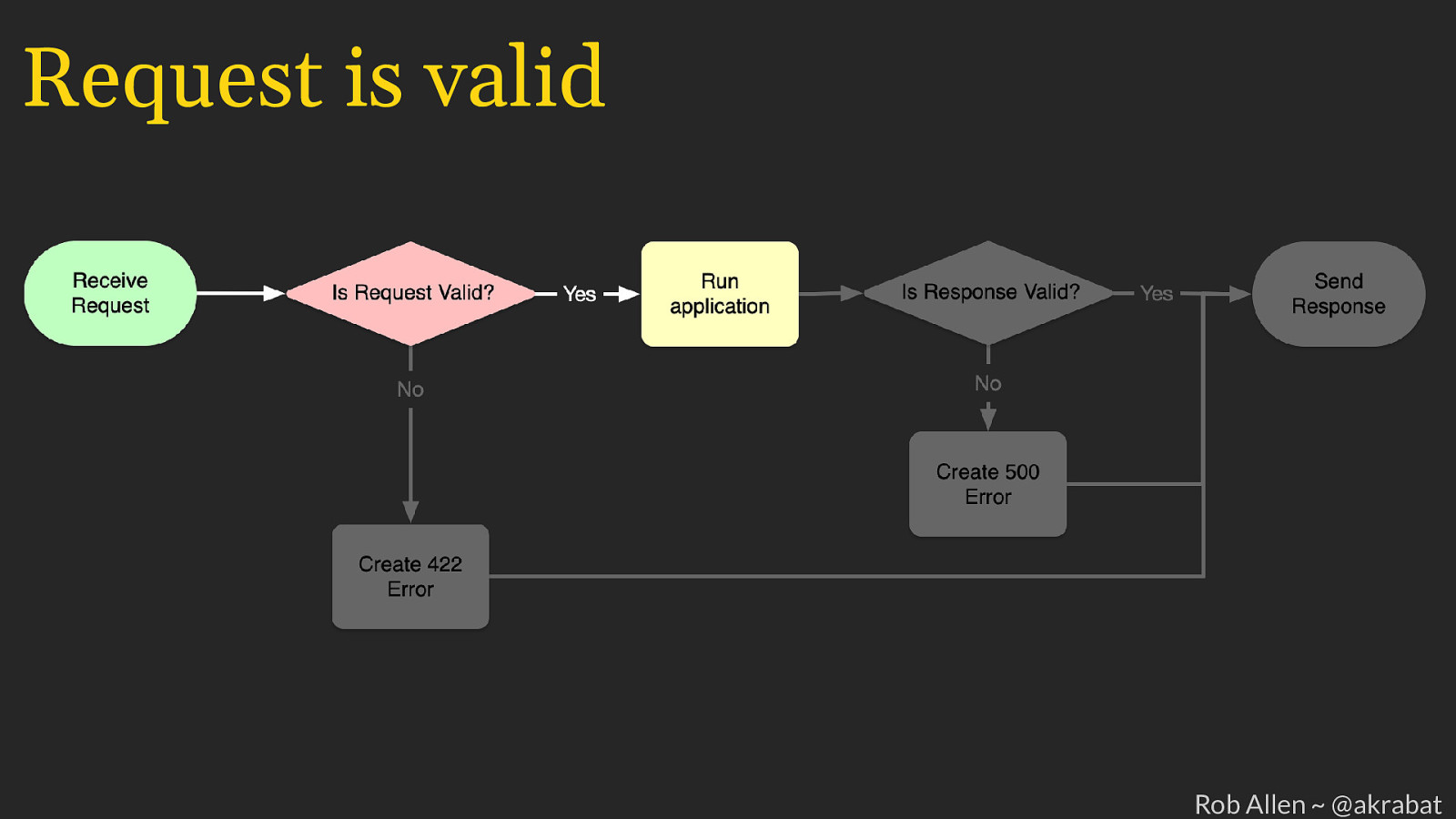
Request is valid Rob Allen ~ @akrabat
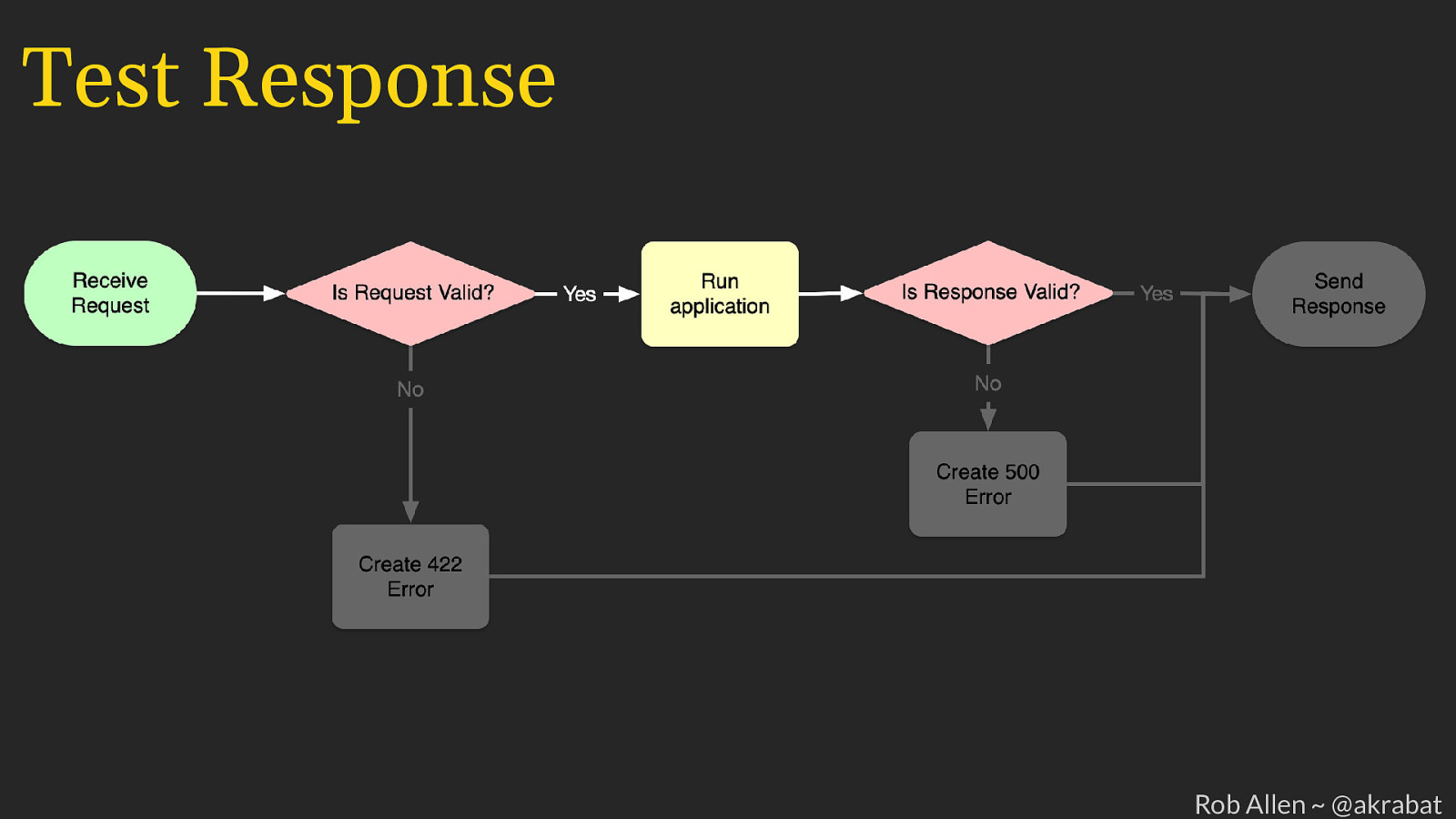
Test Response Rob Allen ~ @akrabat
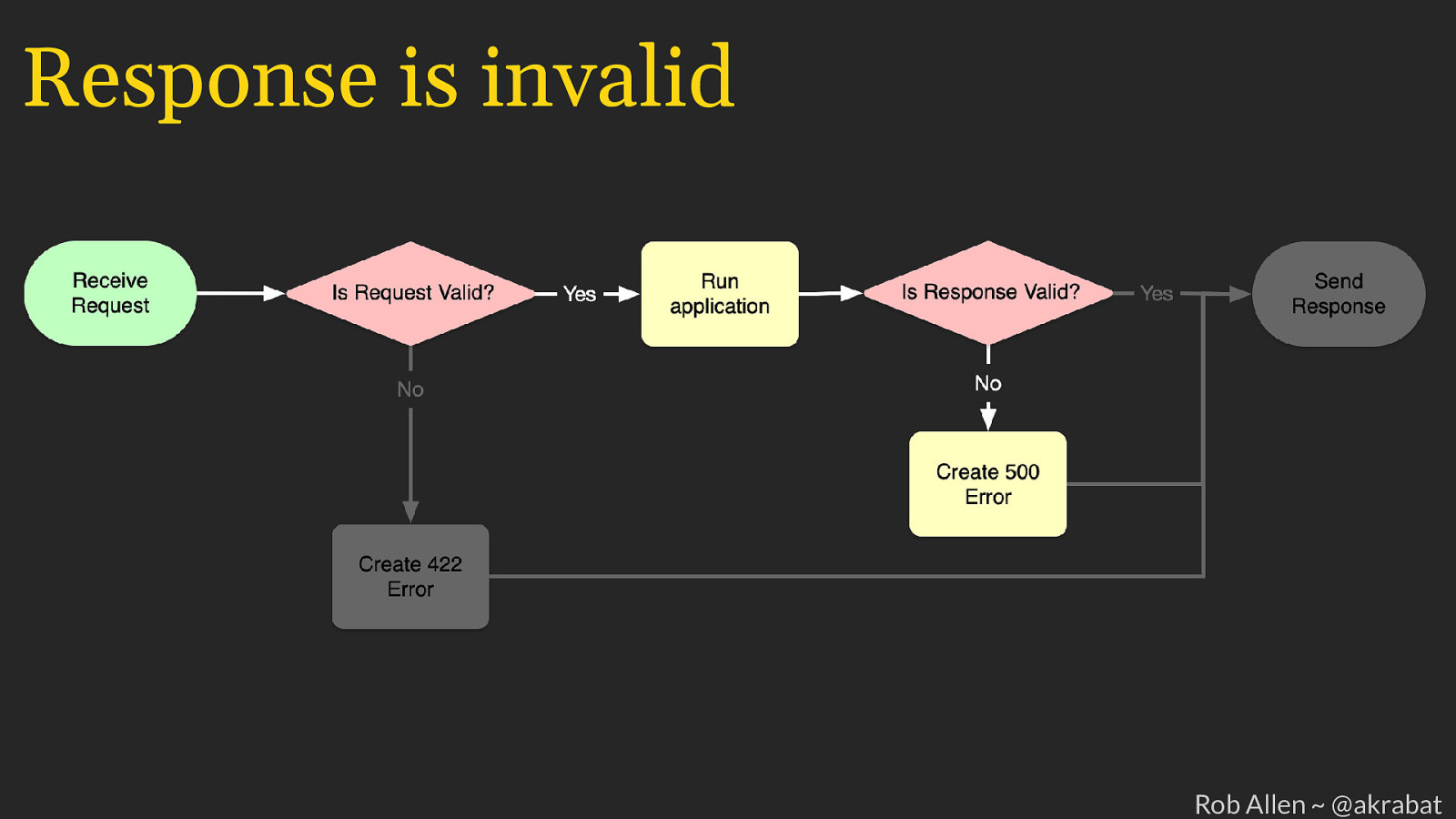
Response is invalid Rob Allen ~ @akrabat
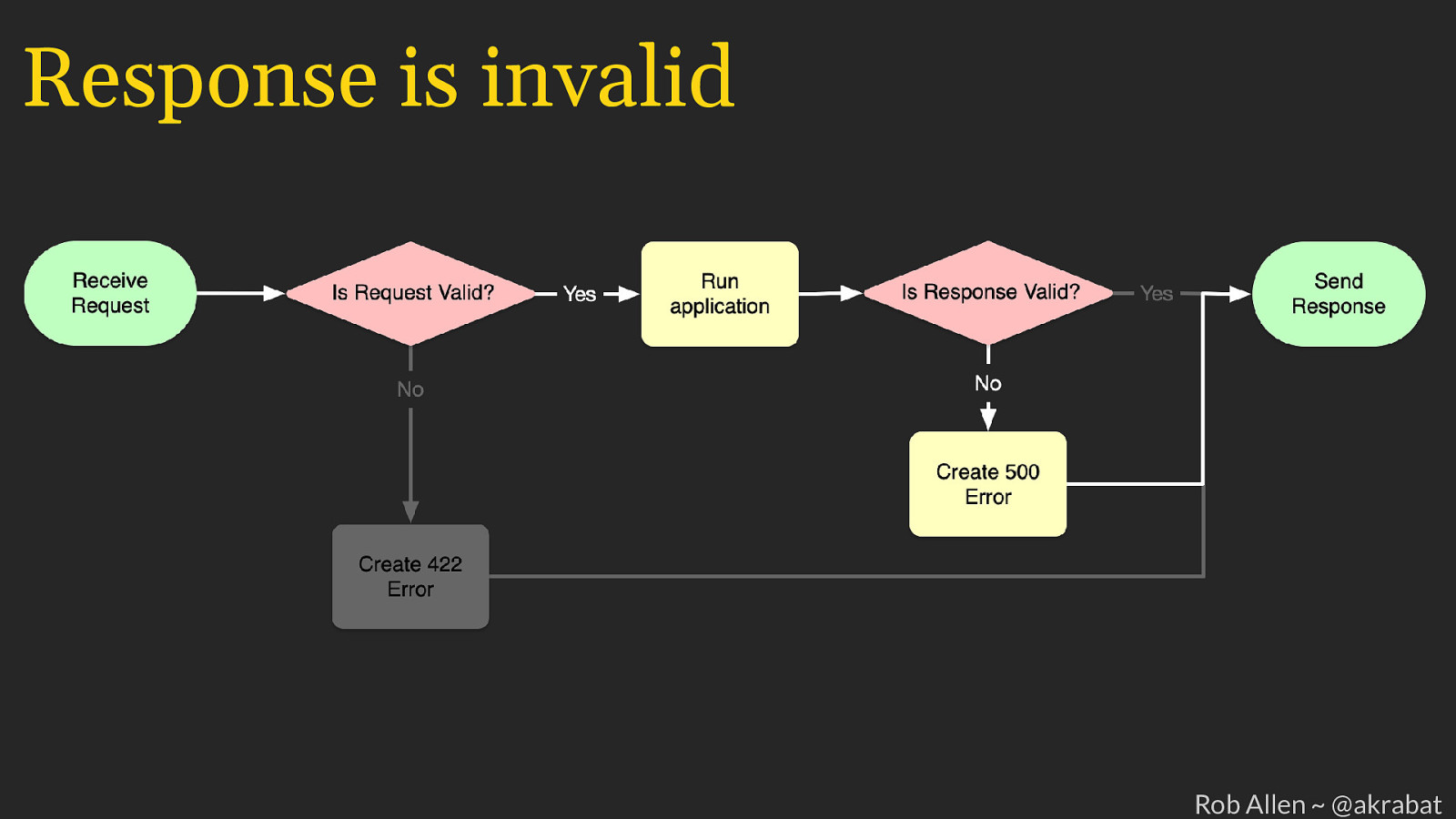
Response is invalid Rob Allen ~ @akrabat
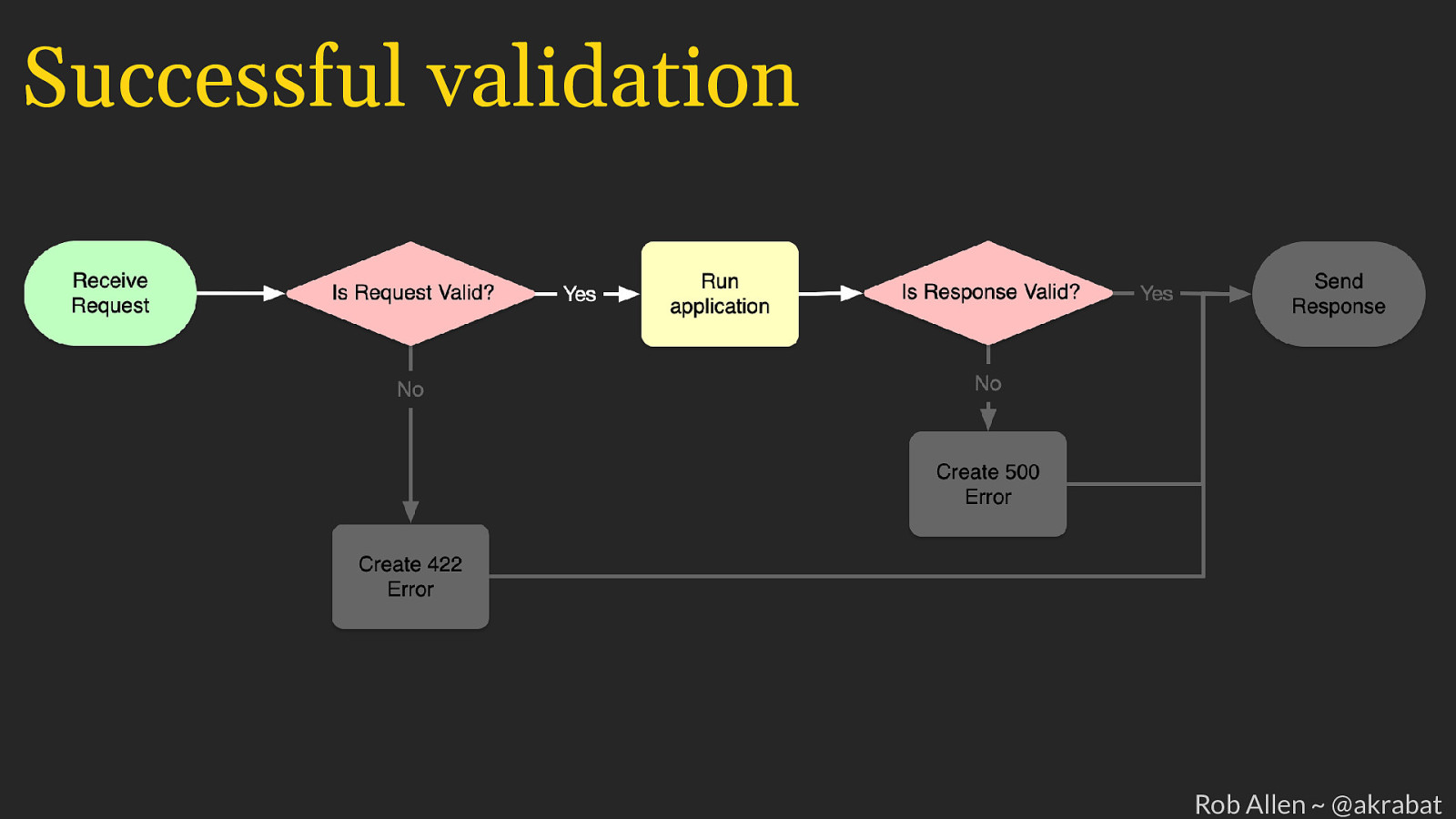
Successful validation Rob Allen ~ @akrabat
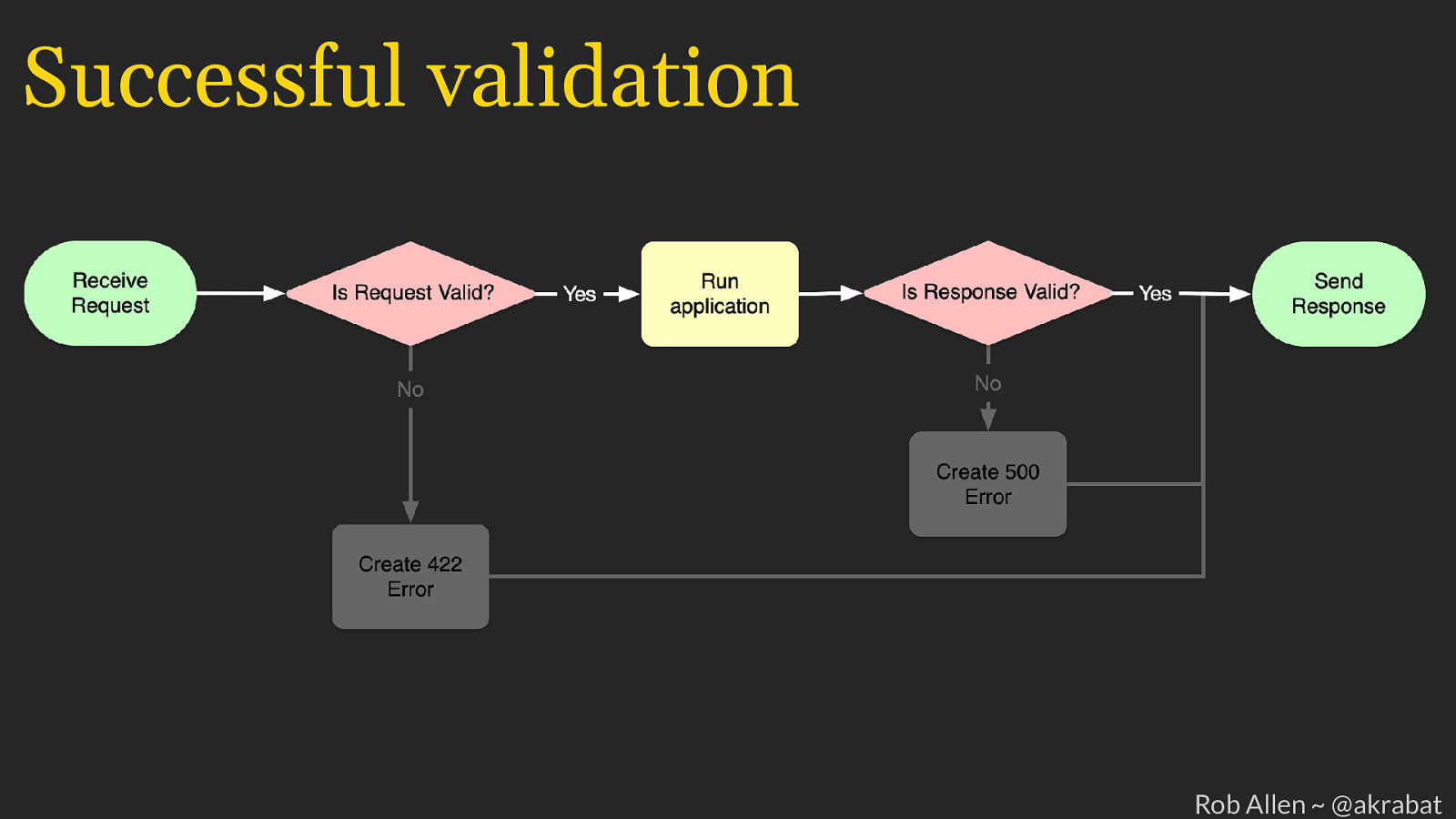
Successful validation Rob Allen ~ @akrabat
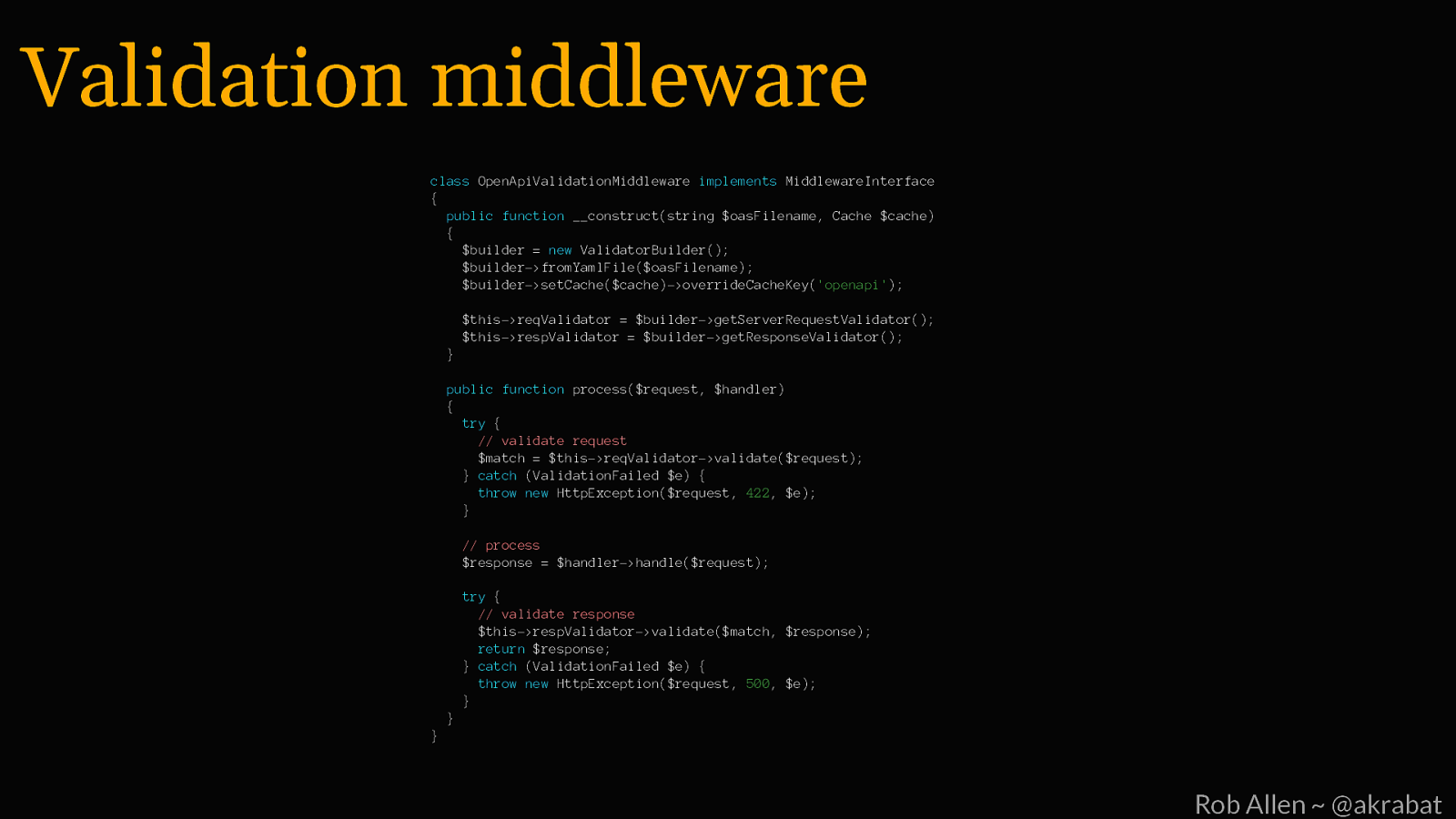
Validation middleware class OpenApiValidationMiddleware implements MiddlewareInterface { public function __construct(string $oasFilename, Cache $cache) { $builder = new ValidatorBuilder(); $builder->fromYamlFile($oasFilename); $builder->setCache($cache)->overrideCacheKey(‘openapi’); $this->reqValidator = $builder->getServerRequestValidator(); $this->respValidator = $builder->getResponseValidator(); } public function process($request, $handler) { try { // validate request $match = $this->reqValidator->validate($request); } catch (ValidationFailed $e) { throw new HttpException($request, 422, $e); } // process $response = $handler->handle($request); try { // validate response $this->respValidator->validate($match, $response); return $response; } catch (ValidationFailed $e) { throw new HttpException($request, 500, $e); } } } Rob Allen ~ @akrabat
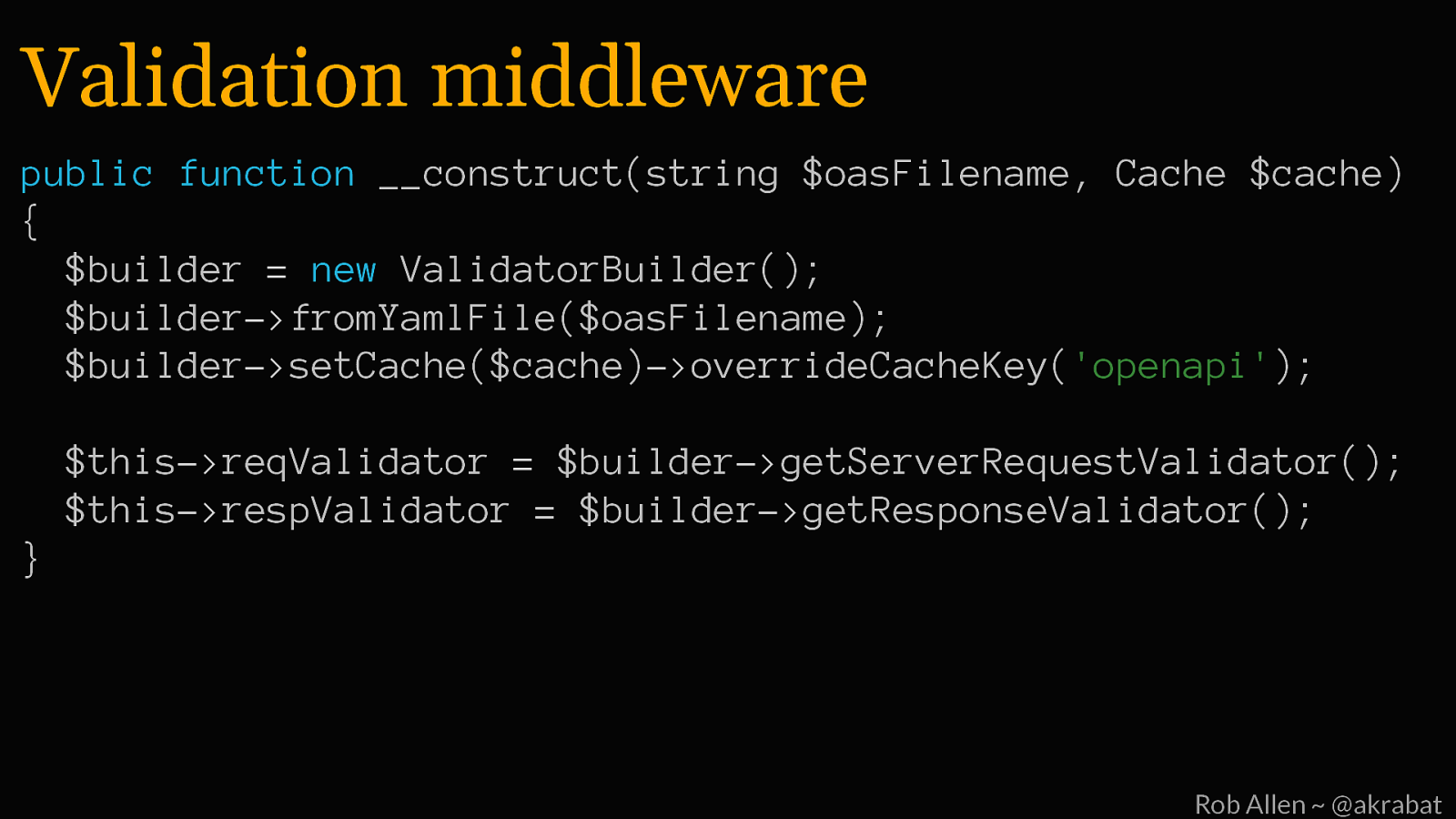
Validation middleware public function __construct(string $oasFilename, Cache $cache) { $builder = new ValidatorBuilder(); $builder->fromYamlFile($oasFilename); $builder->setCache($cache)->overrideCacheKey(‘openapi’); $this->reqValidator = $builder->getServerRequestValidator(); $this->respValidator = $builder->getResponseValidator(); } Rob Allen ~ @akrabat
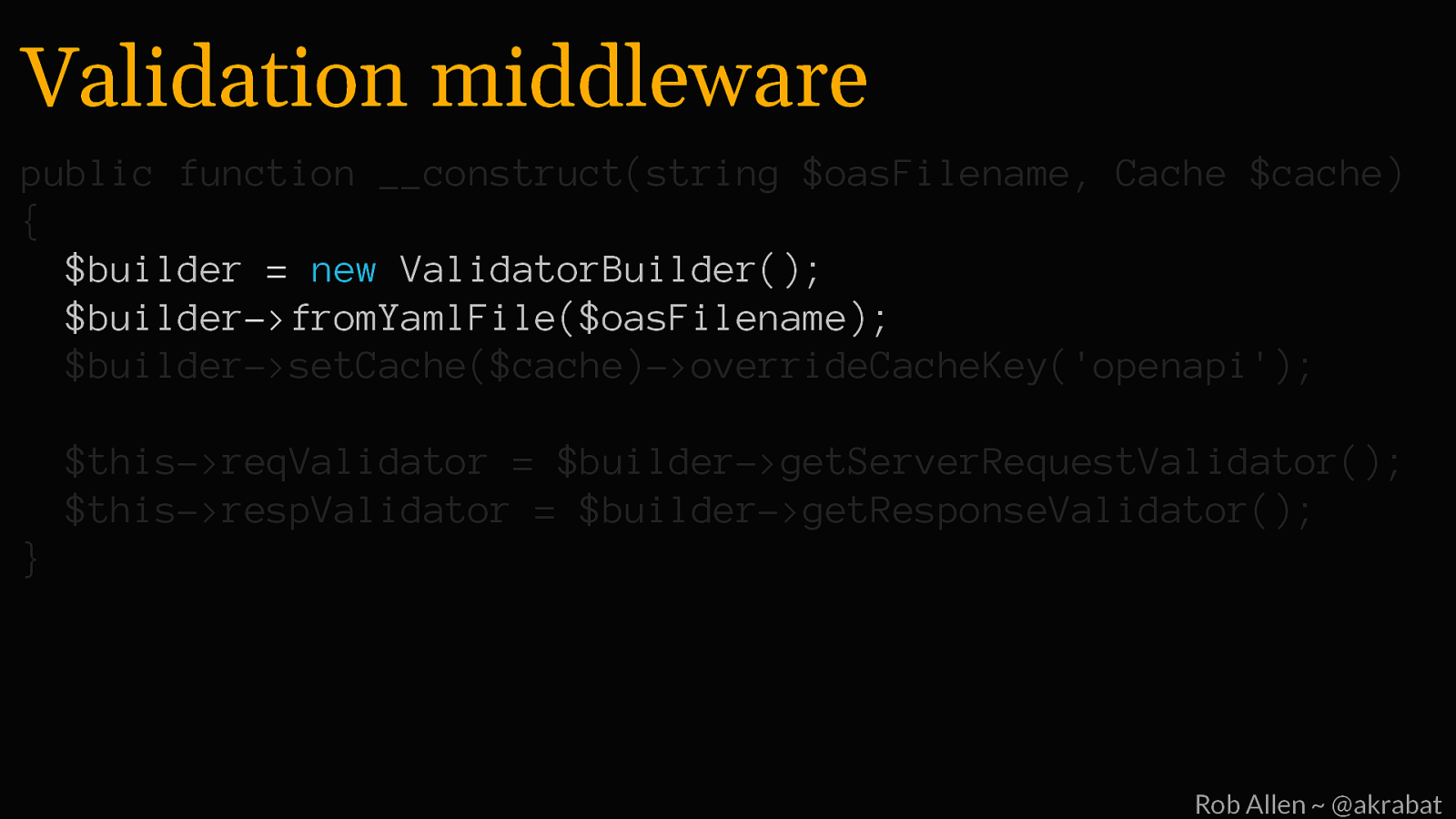
Validation middleware public function __construct(string $oasFilename, Cache $cache) { $builder = new ValidatorBuilder(); $builder->fromYamlFile($oasFilename); $builder->setCache($cache)->overrideCacheKey(‘openapi’); $this->reqValidator = $builder->getServerRequestValidator(); $this->respValidator = $builder->getResponseValidator(); } Rob Allen ~ @akrabat
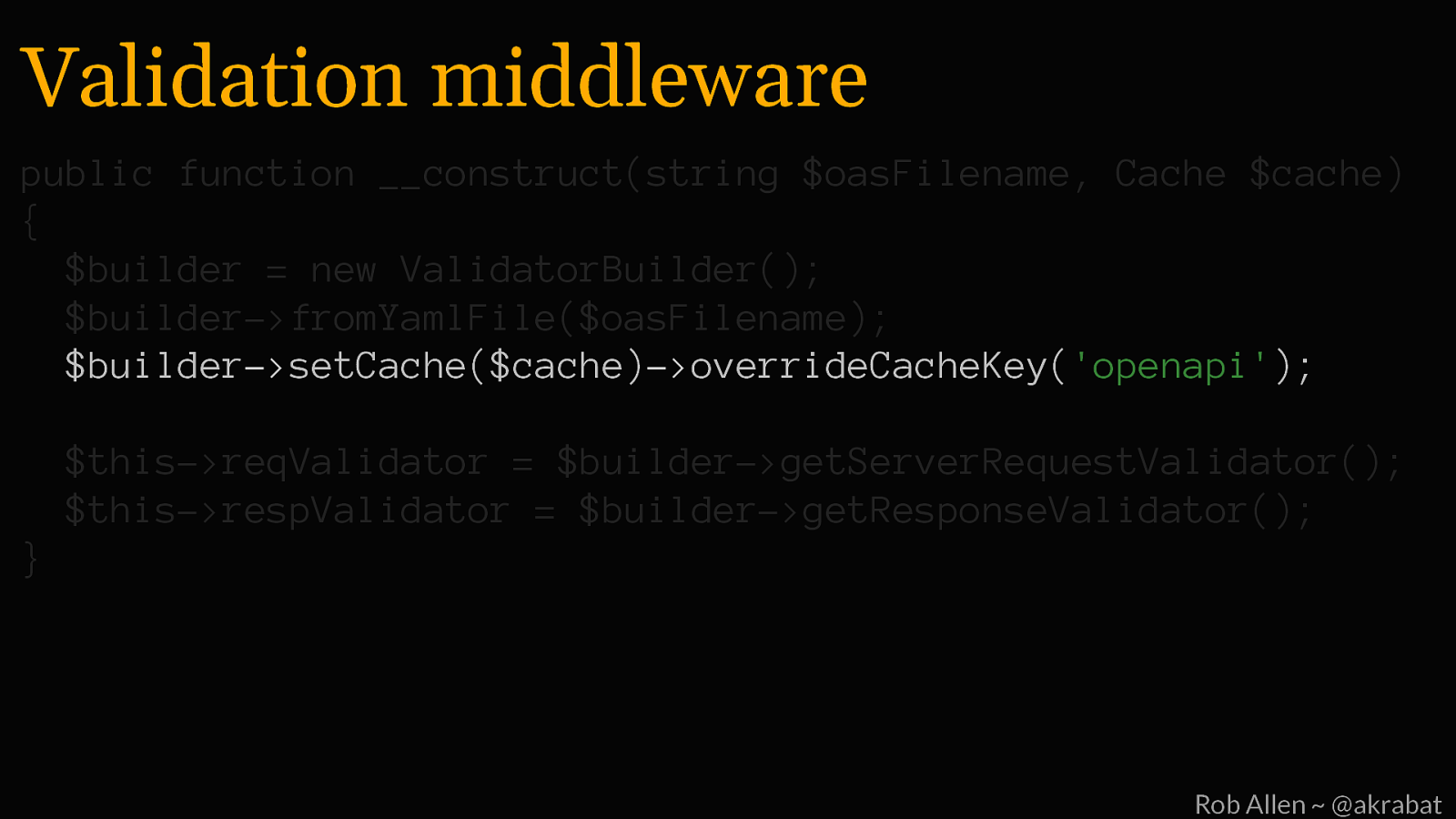
Validation middleware public function __construct(string $oasFilename, Cache $cache) { $builder = new ValidatorBuilder(); $builder->fromYamlFile($oasFilename); $builder->setCache($cache)->overrideCacheKey(‘openapi’); $this->reqValidator = $builder->getServerRequestValidator(); $this->respValidator = $builder->getResponseValidator(); } Rob Allen ~ @akrabat
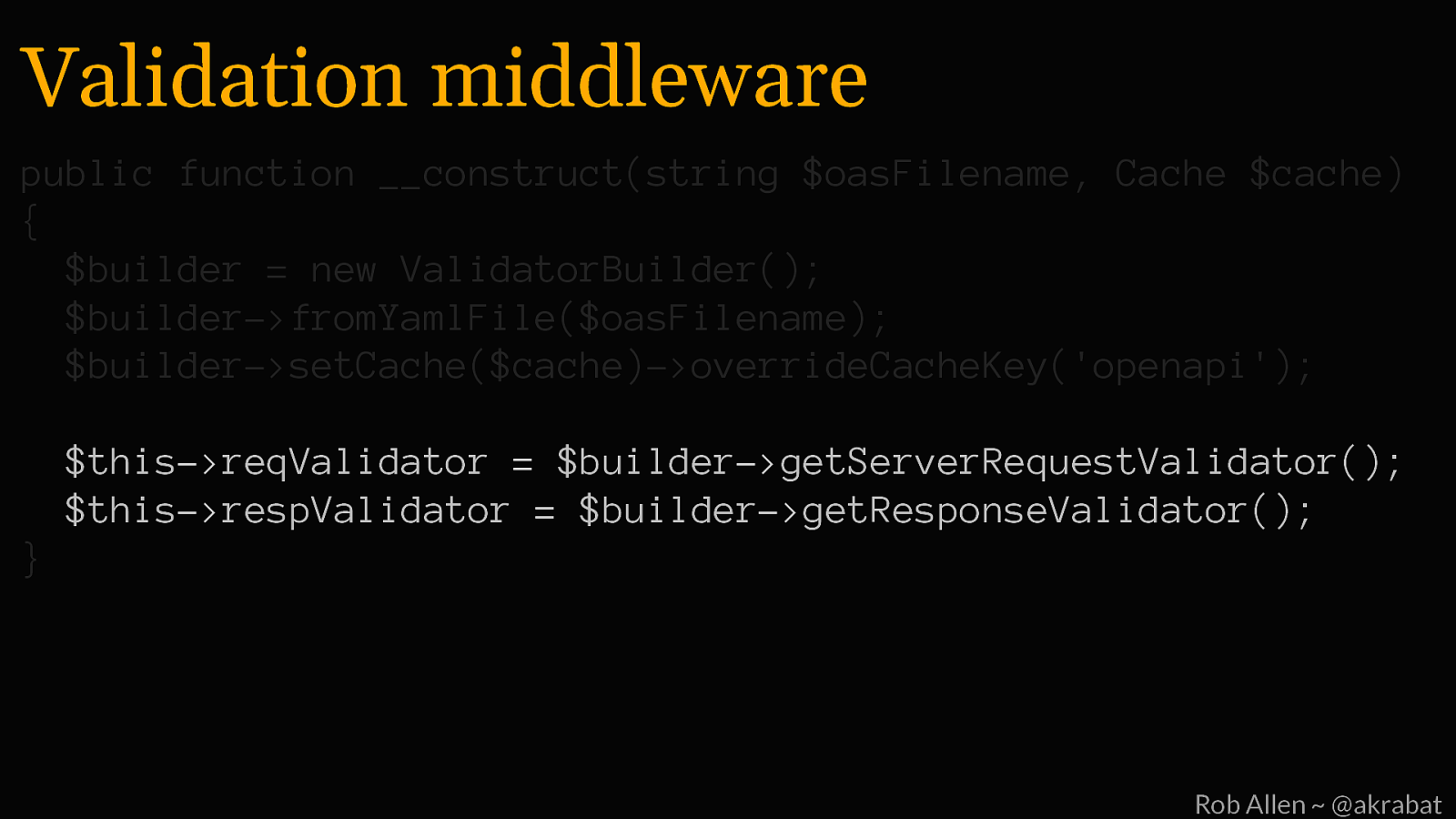
Validation middleware public function __construct(string $oasFilename, Cache $cache) { $builder = new ValidatorBuilder(); $builder->fromYamlFile($oasFilename); $builder->setCache($cache)->overrideCacheKey(‘openapi’); $this->reqValidator = $builder->getServerRequestValidator(); $this->respValidator = $builder->getResponseValidator(); } Rob Allen ~ @akrabat
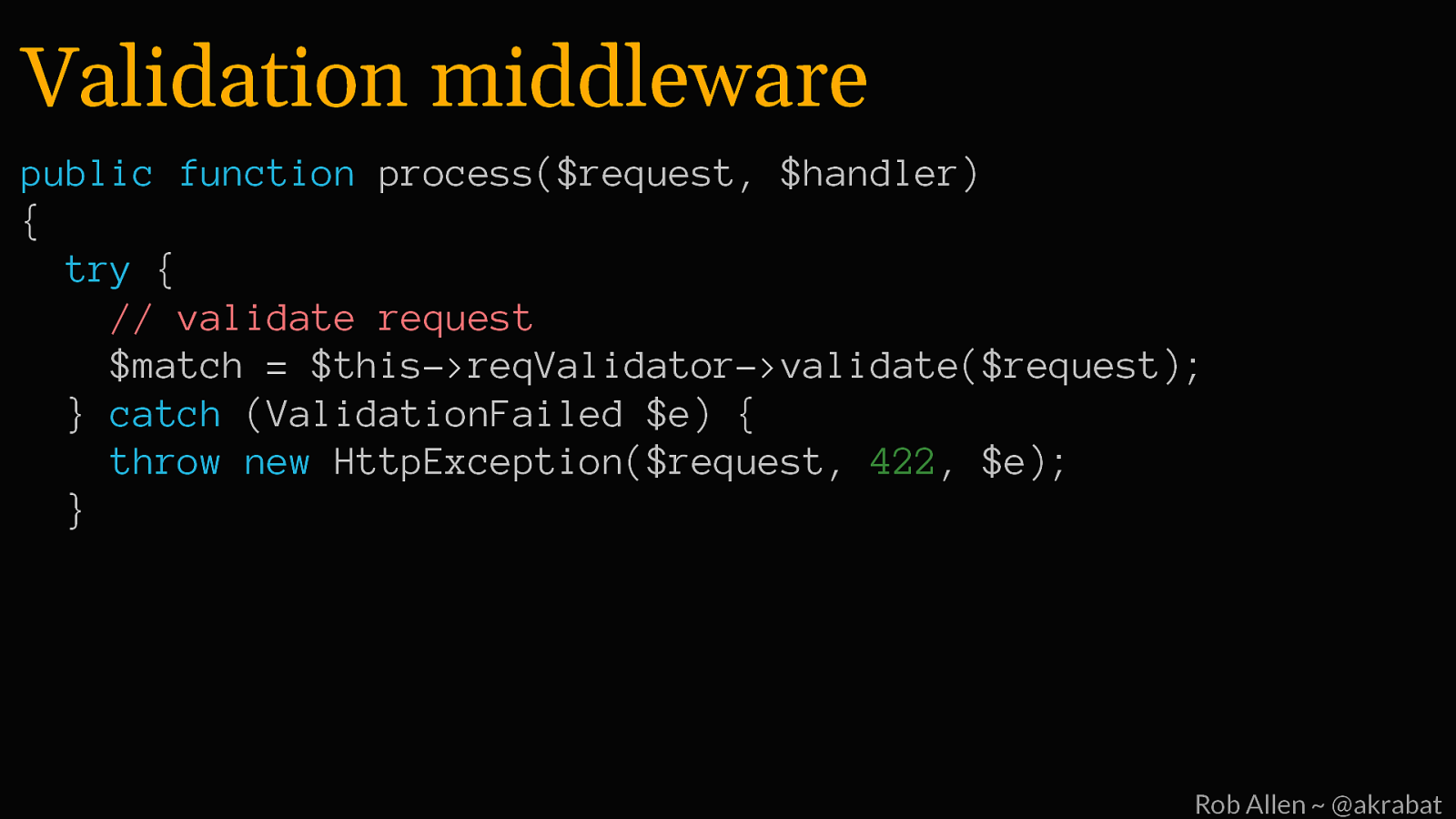
Validation middleware public function process($request, $handler) { try { // validate request $match = $this->reqValidator->validate($request); } catch (ValidationFailed $e) { throw new HttpException($request, 422, $e); } Rob Allen ~ @akrabat
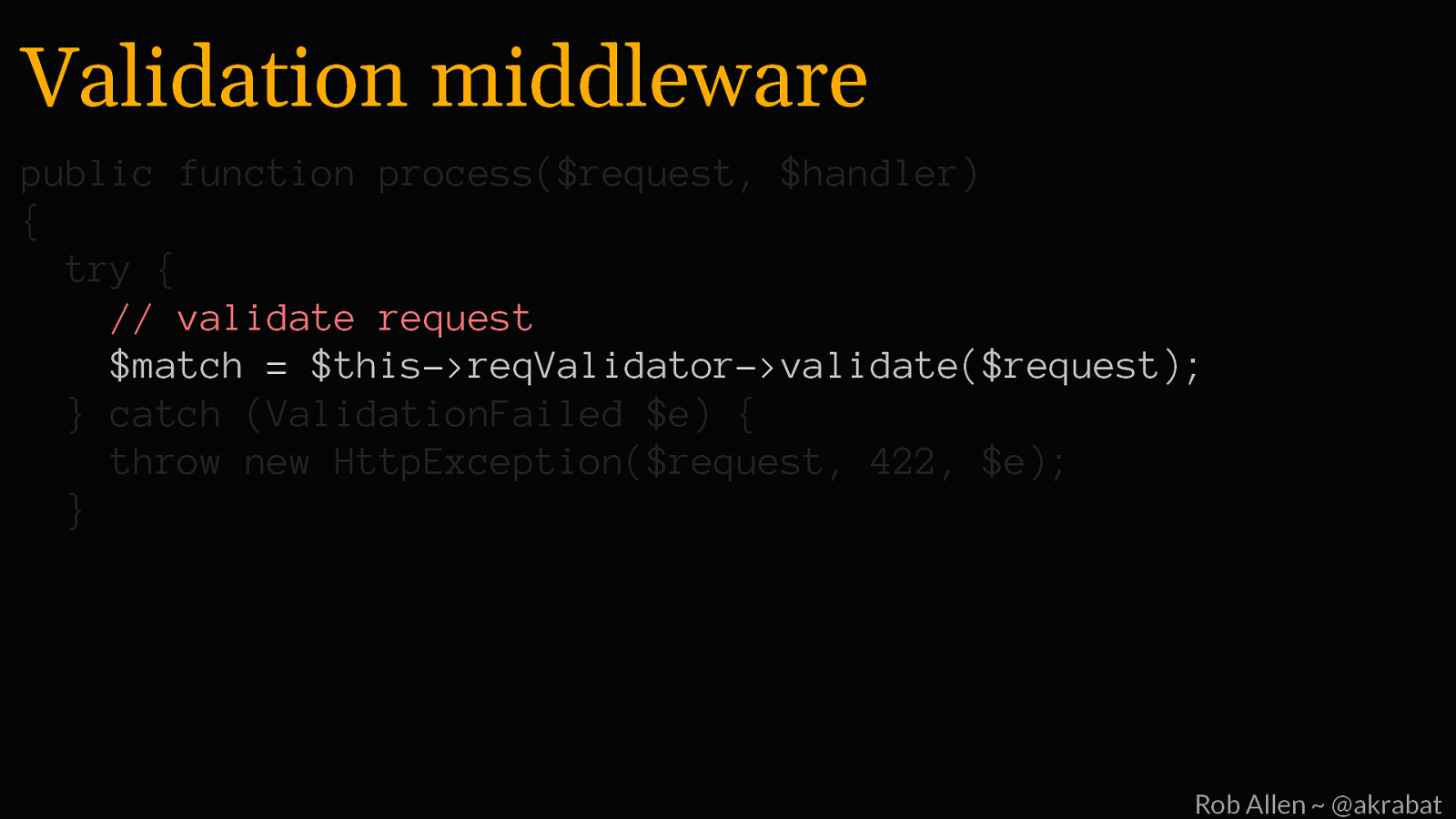
Validation middleware public function process($request, $handler) { try { // validate request $match = $this->reqValidator->validate($request); } catch (ValidationFailed $e) { throw new HttpException($request, 422, $e); } Rob Allen ~ @akrabat
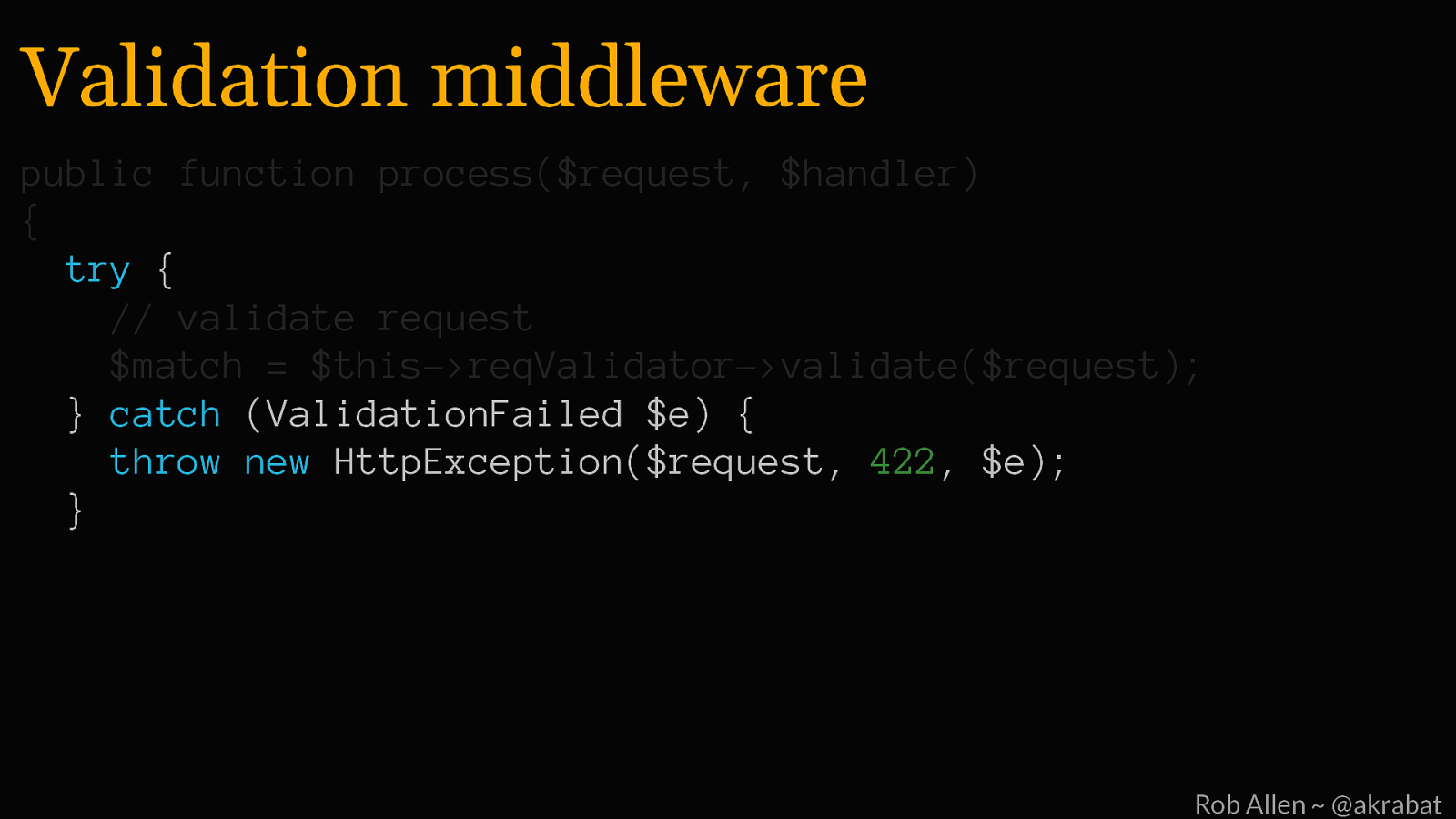
Validation middleware public function process($request, $handler) { try { // validate request $match = $this->reqValidator->validate($request); } catch (ValidationFailed $e) { throw new HttpException($request, 422, $e); } Rob Allen ~ @akrabat
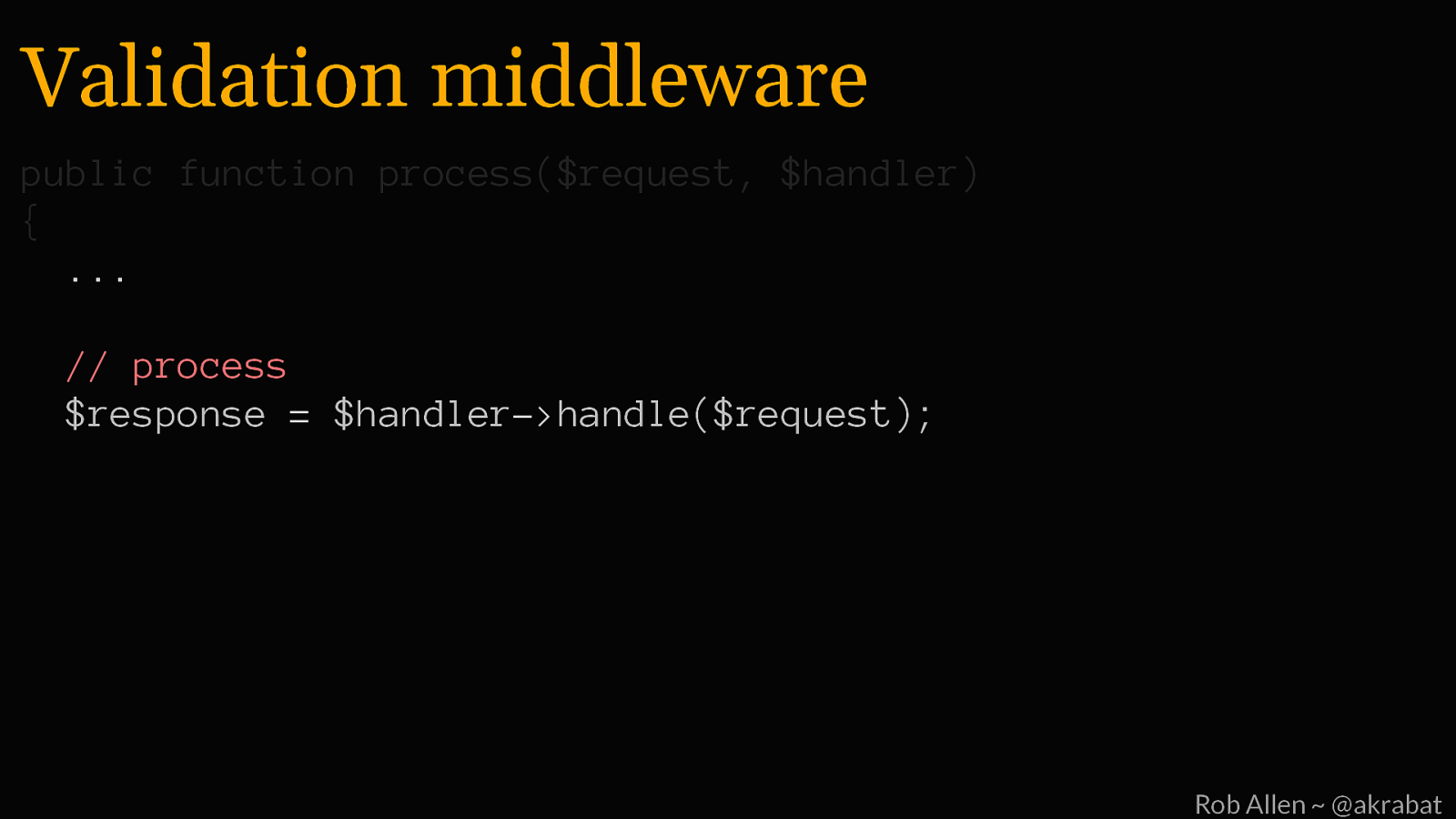
Validation middleware public function process($request, $handler) { … // process $response = $handler->handle($request); Rob Allen ~ @akrabat
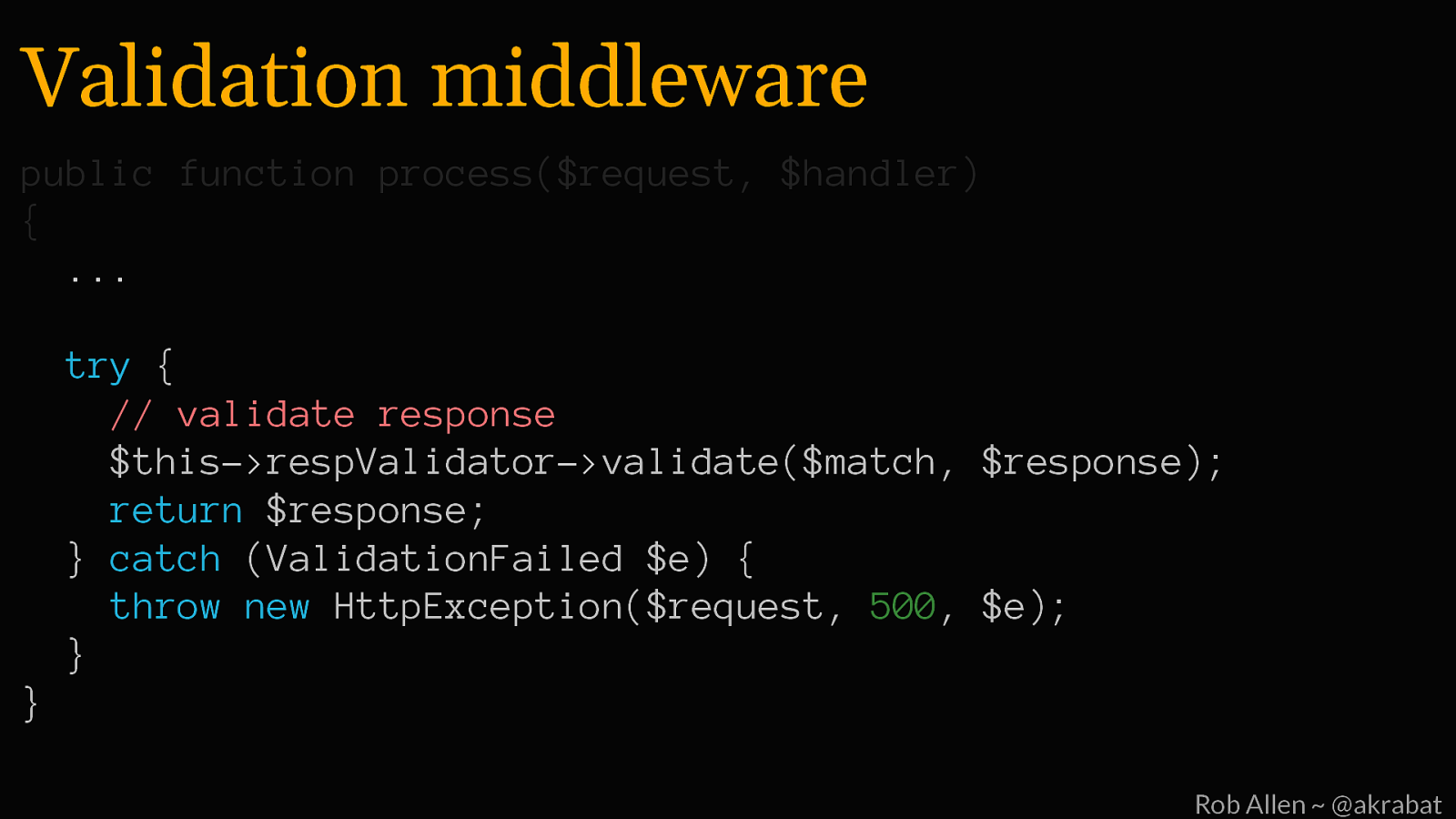
Validation middleware public function process($request, $handler) { … try { // validate response $this->respValidator->validate($match, $response); return $response; } catch (ValidationFailed $e) { throw new HttpException($request, 500, $e); } } Rob Allen ~ @akrabat
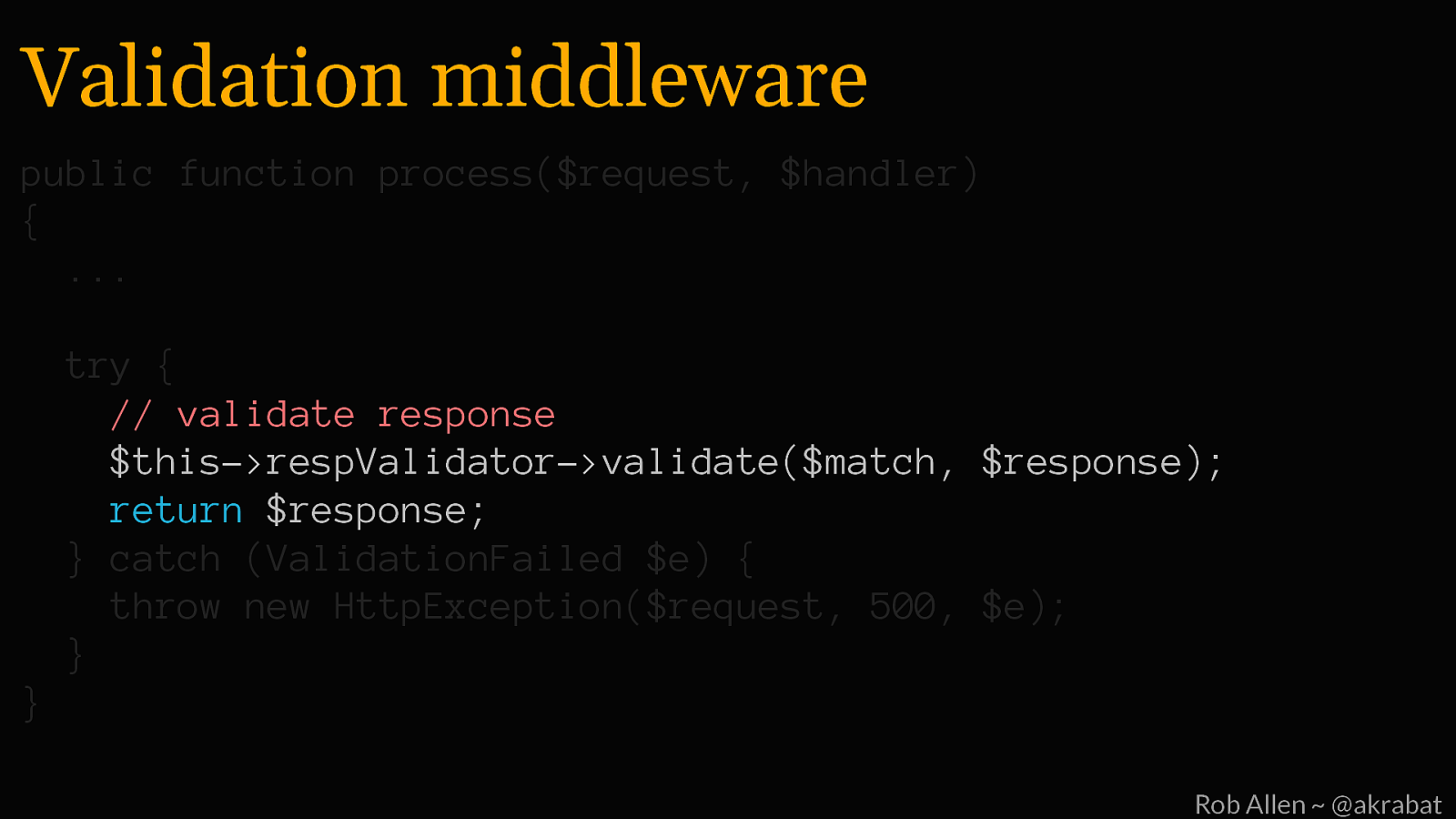
Validation middleware public function process($request, $handler) { … try { // validate response $this->respValidator->validate($match, $response); return $response; } catch (ValidationFailed $e) { throw new HttpException($request, 500, $e); } } Rob Allen ~ @akrabat
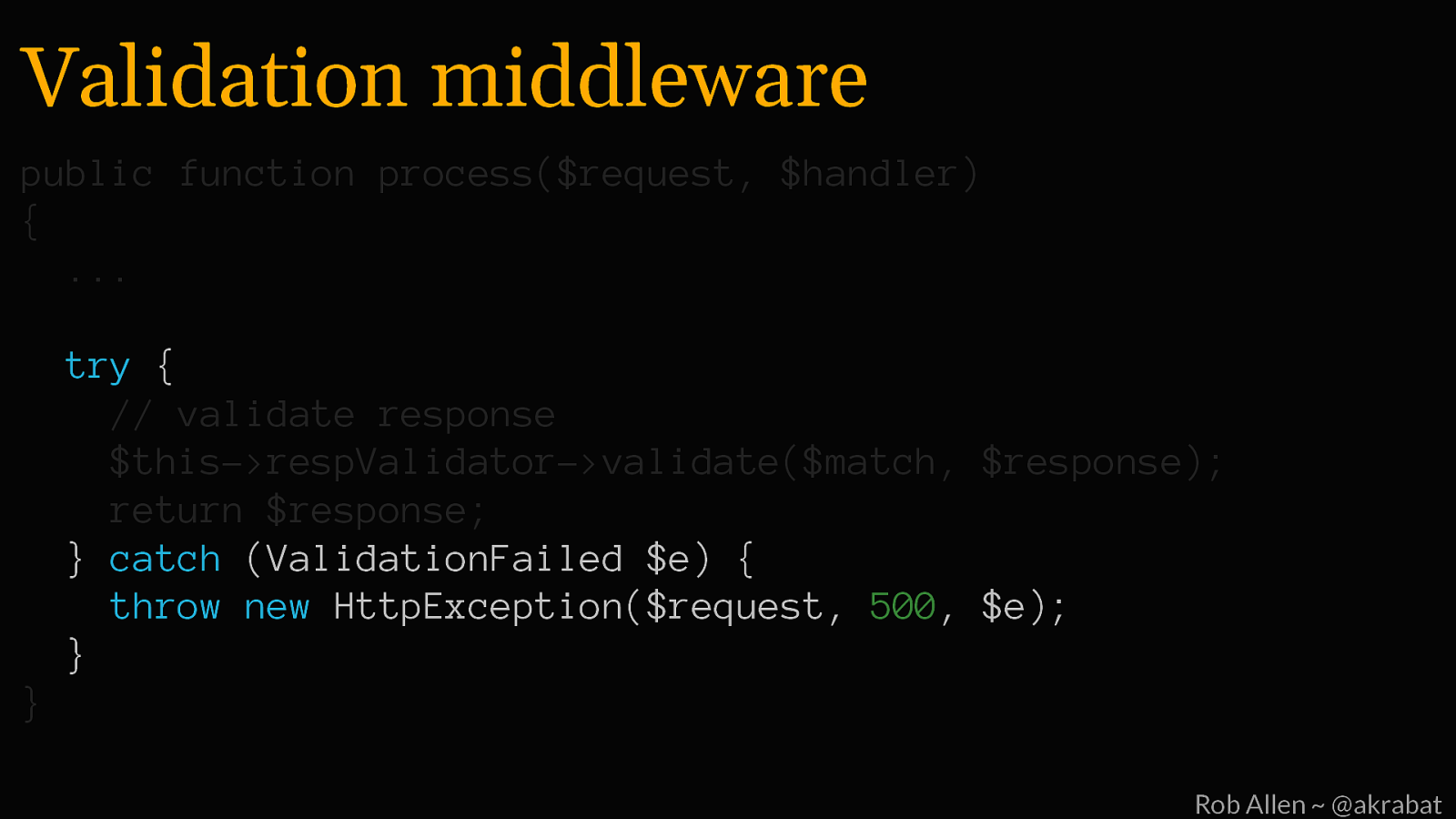
Validation middleware public function process($request, $handler) { … try { // validate response $this->respValidator->validate($match, $response); return $response; } catch (ValidationFailed $e) { throw new HttpException($request, 500, $e); } } Rob Allen ~ @akrabat
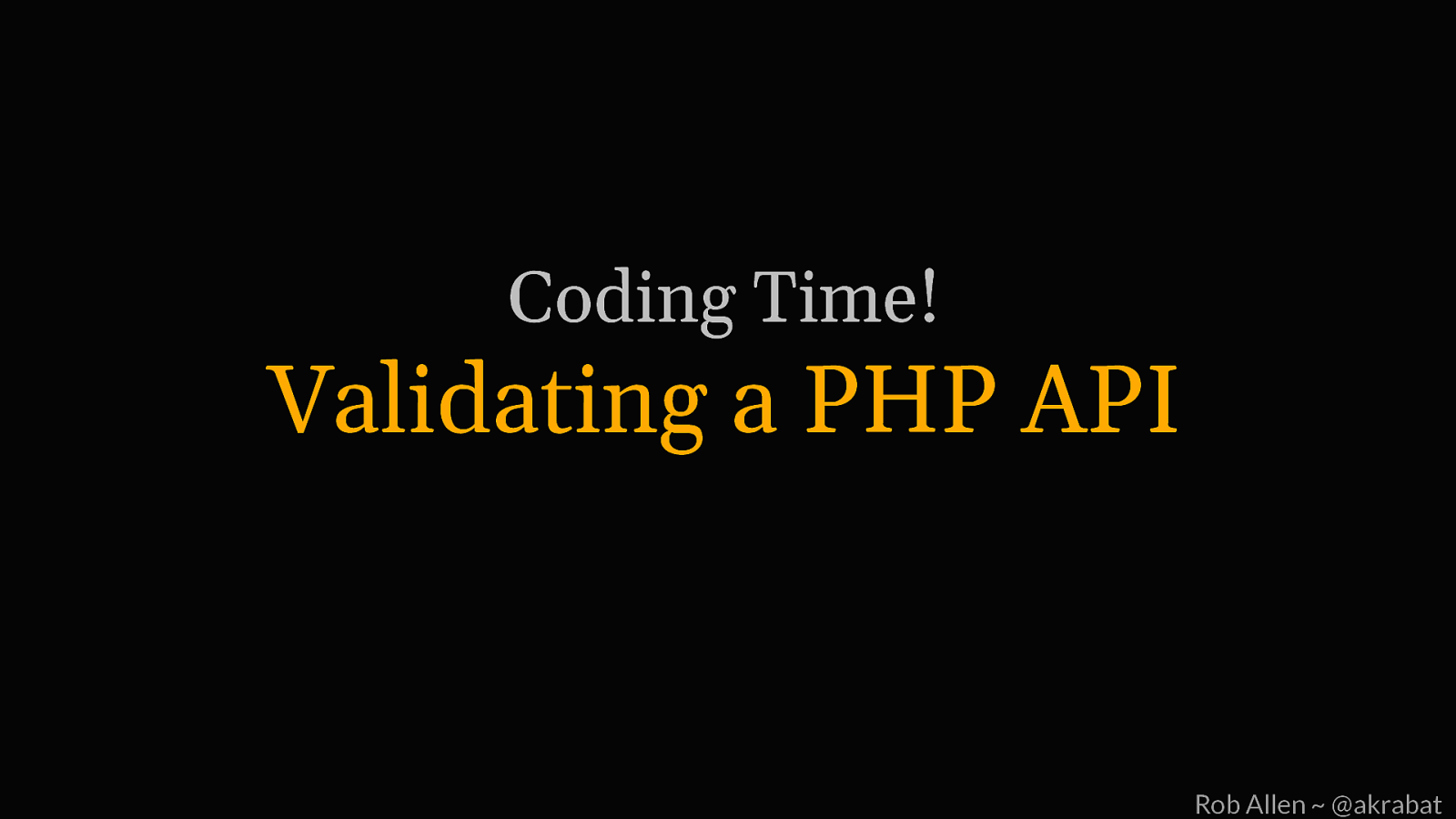
Coding Time! Validating a PHP API Rob Allen ~ @akrabat
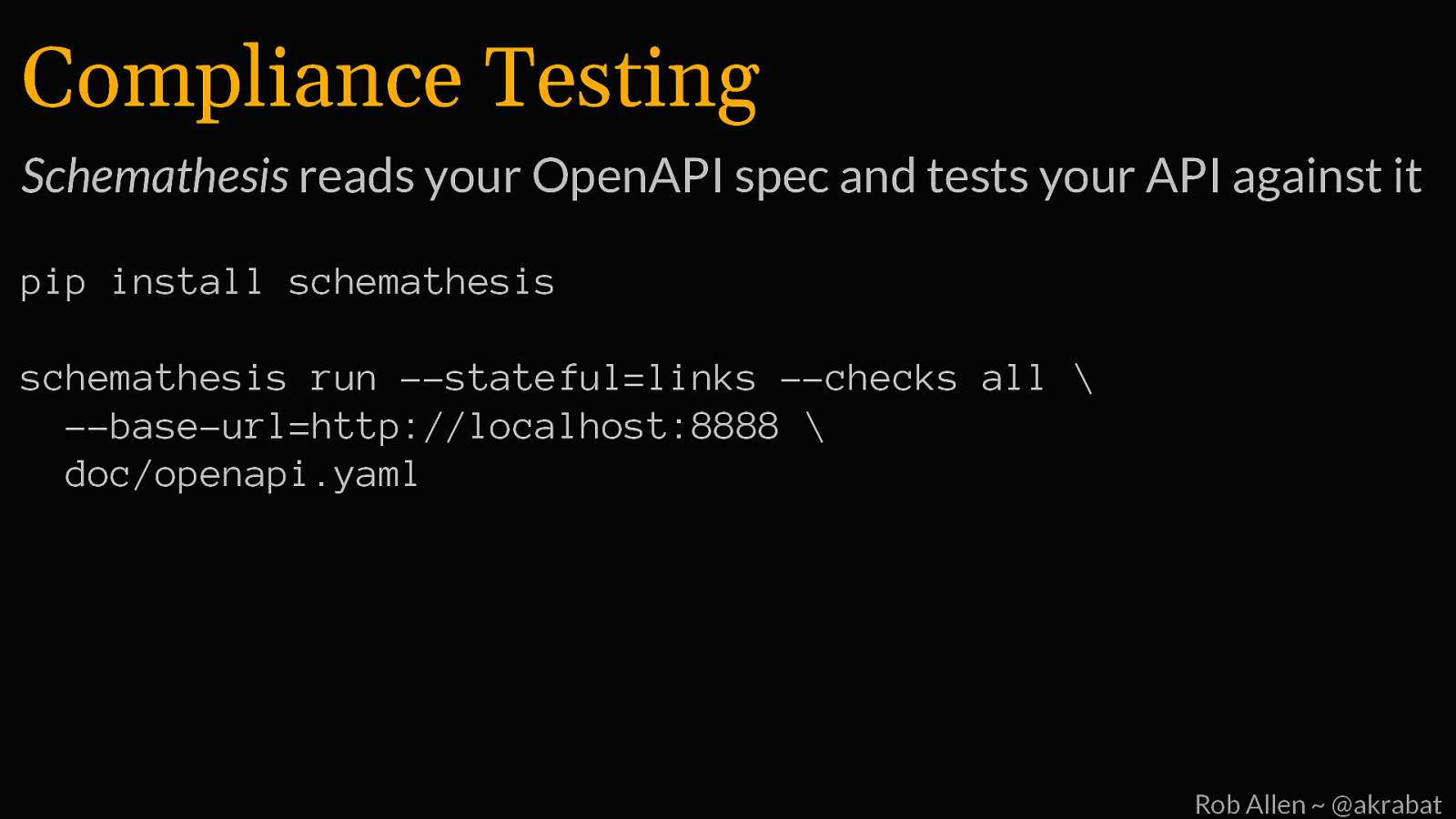
Compliance Testing Schemathesis reads your OpenAPI spec and tests your API against it pip install schemathesis schemathesis run —stateful=links —checks all \ —base-url=http://localhost:8888 \ doc/openapi.yaml Rob Allen ~ @akrabat
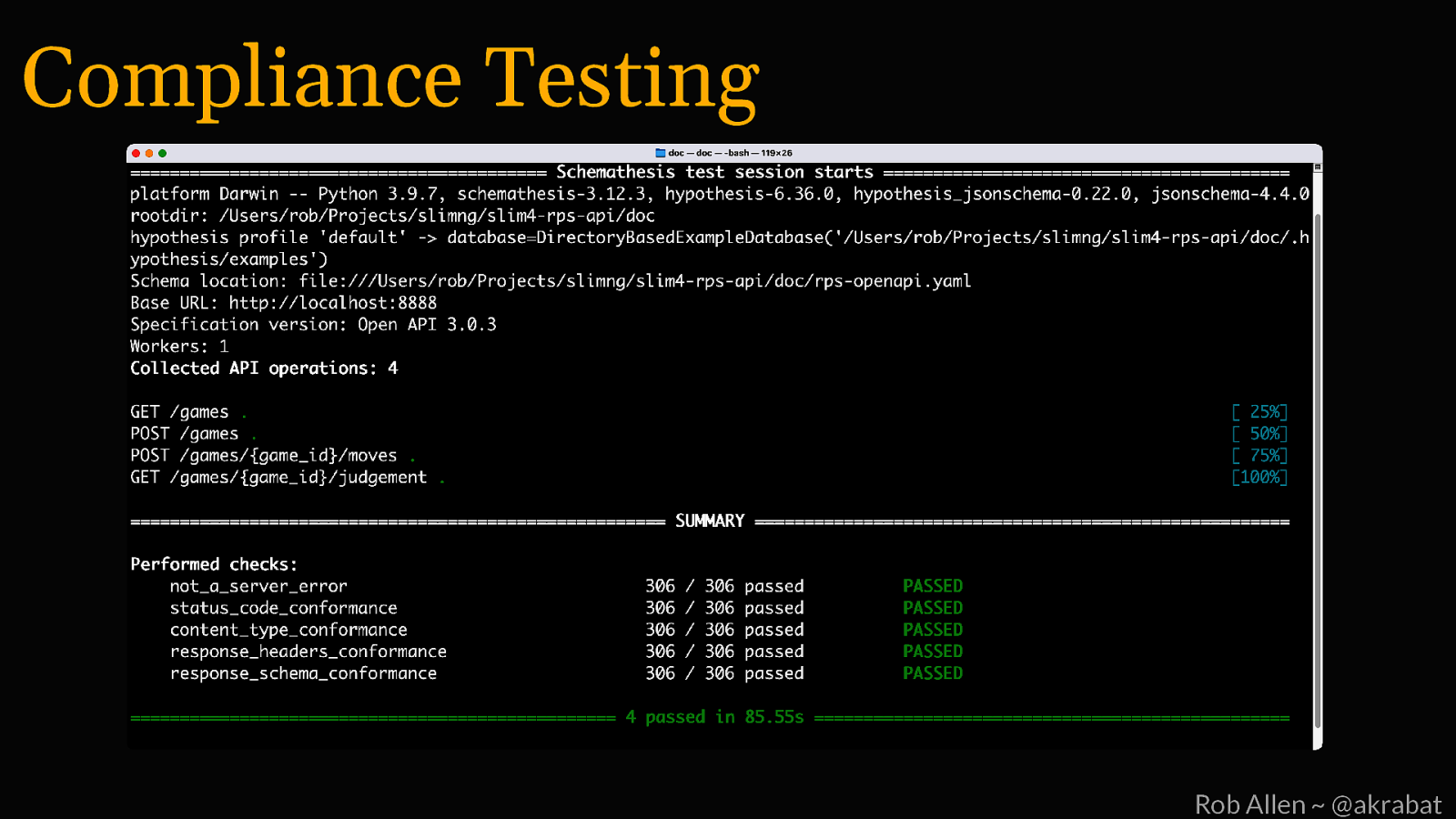
Compliance Testing Rob Allen ~ @akrabat
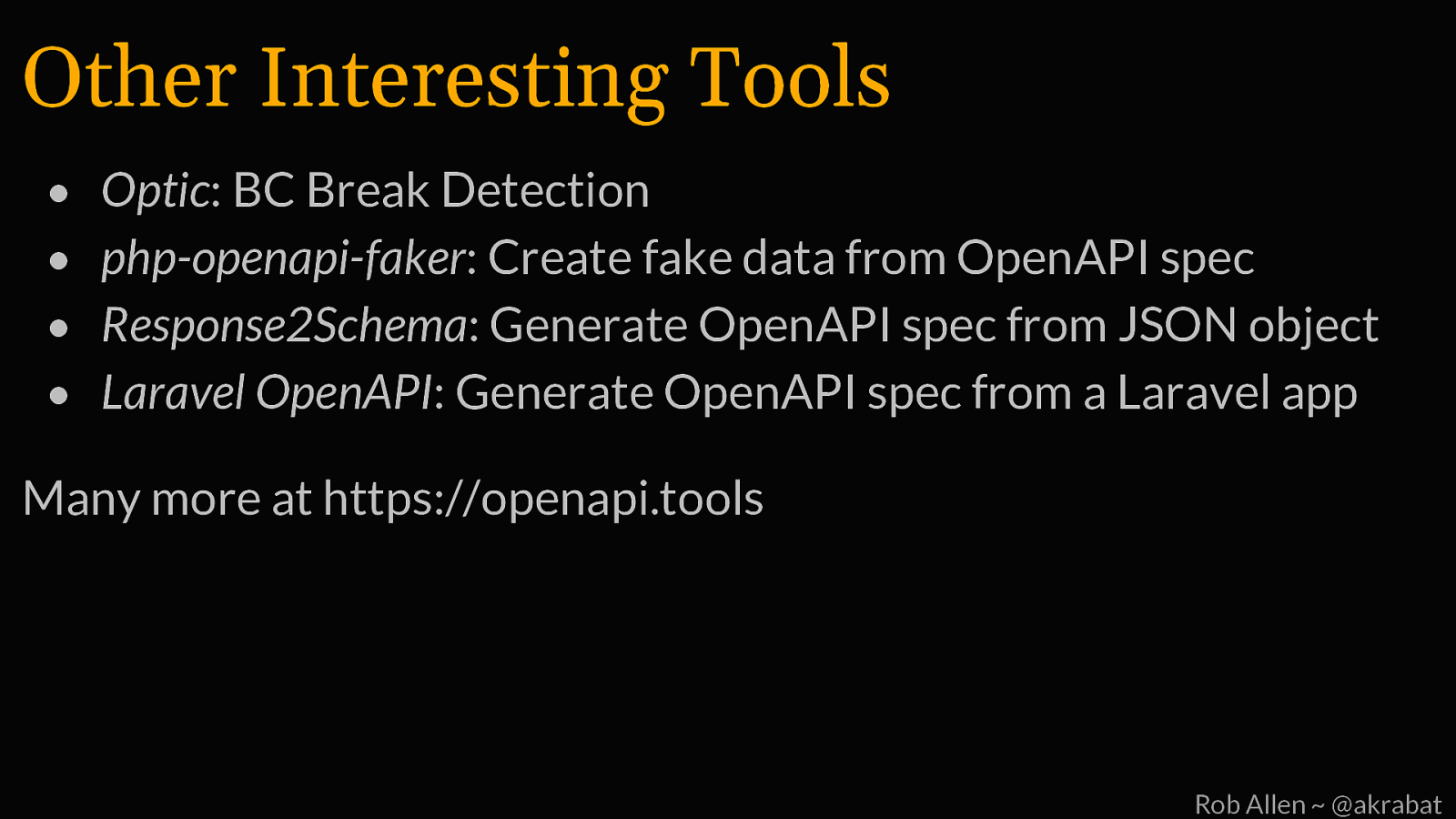
Other Interesting Tools • • • • Optic: BC Break Detection php-openapi-faker: Create fake data from OpenAPI spec Response2Schema: Generate OpenAPI spec from JSON object Laravel OpenAPI: Generate OpenAPI spec from a Laravel app Many more at https://openapi.tools Rob Allen ~ @akrabat

To sum up Rob Allen ~ @akrabat
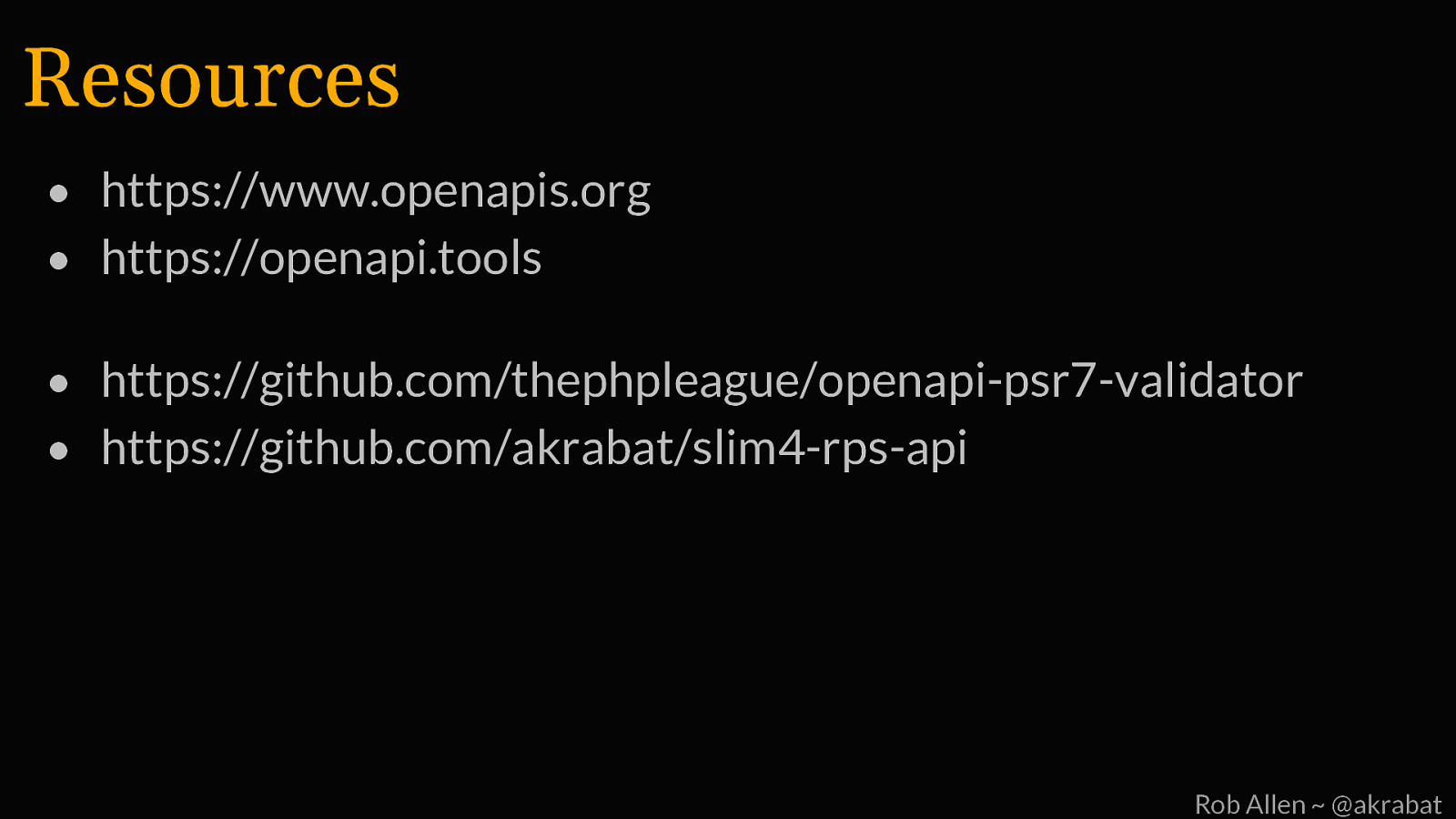
Resources • https://www.openapis.org • https://openapi.tools • https://github.com/thephpleague/openapi-psr7-validator • https://github.com/akrabat/slim4-rps-api Rob Allen ~ @akrabat
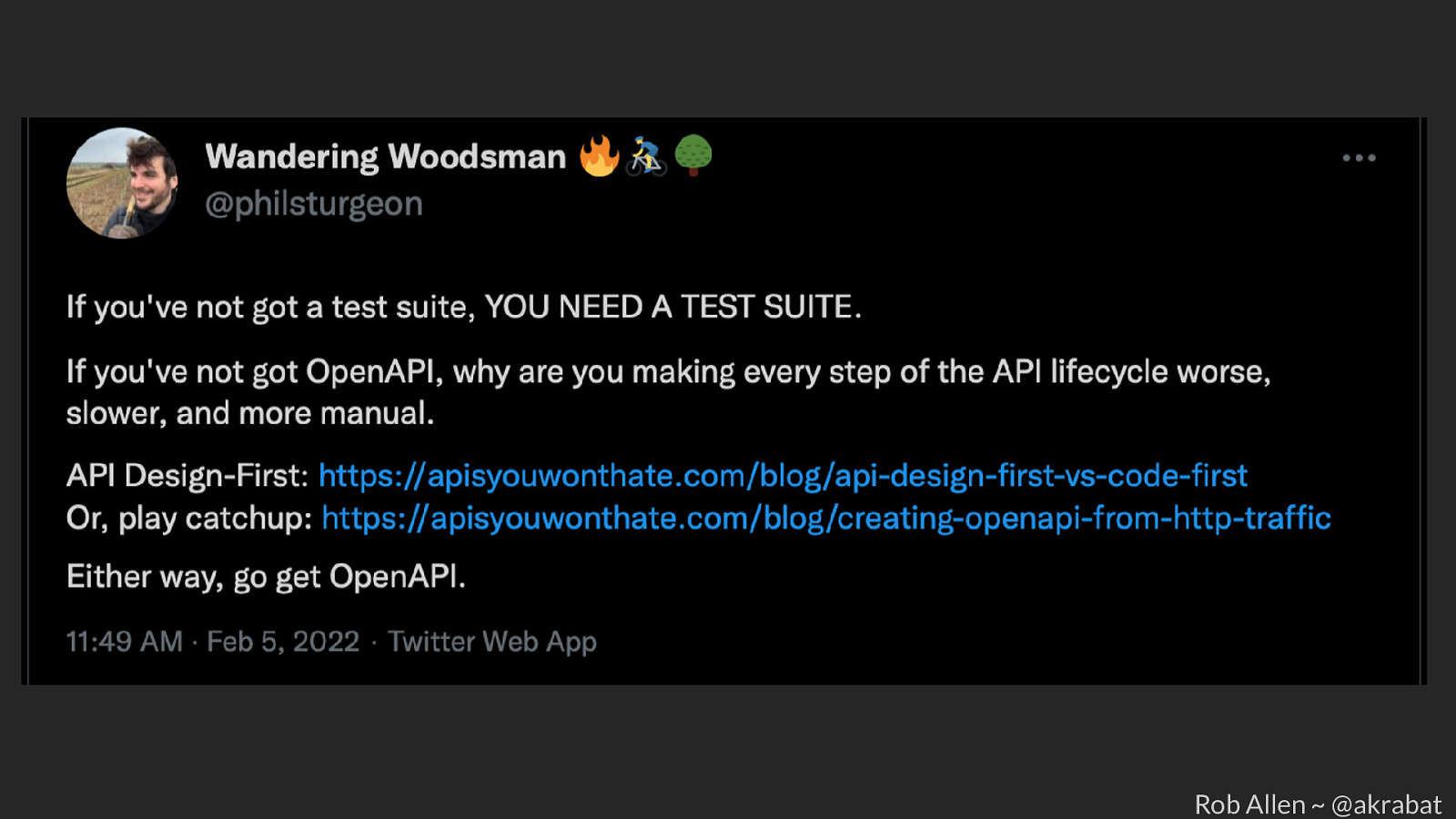
Rob Allen ~ @akrabat

Thank you! Rob Allen ~ @akrabat
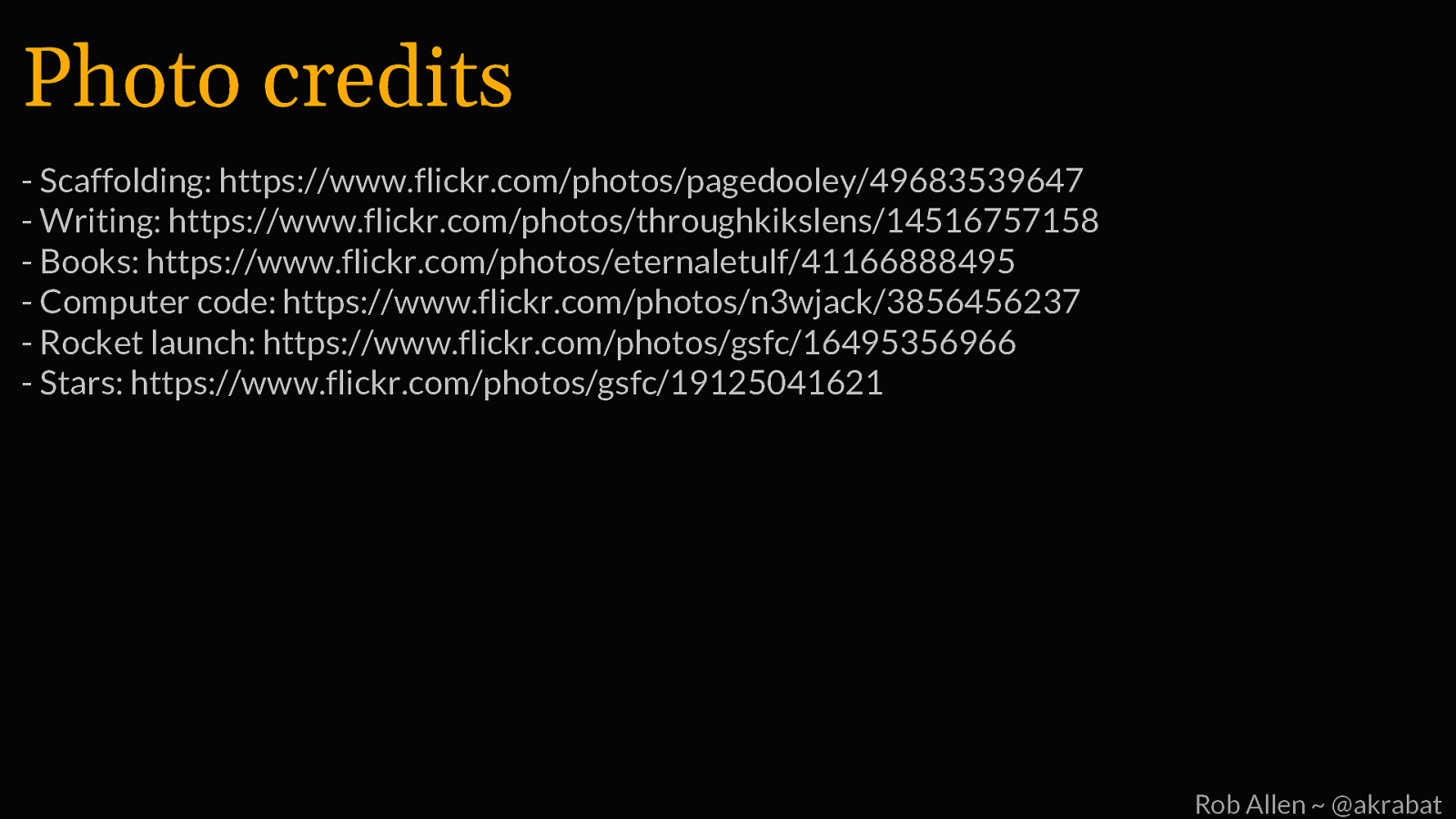
Photo credits - Scaffolding: https://www.flickr.com/photos/pagedooley/49683539647 - Writing: https://www.flickr.com/photos/throughkikslens/14516757158 - Books: https://www.flickr.com/photos/eternaletulf/41166888495 - Computer code: https://www.flickr.com/photos/n3wjack/3856456237 - Rocket launch: https://www.flickr.com/photos/gsfc/16495356966 - Stars: https://www.flickr.com/photos/gsfc/19125041621 Rob Allen ~ @akrabat